 Sign in
Sign in
Business
Kim Scott, Jason Rosoff & Amy Sandler
Learn to love your job and kick ass at work without losing your humanity by practicing the principles of Radical Candor. Improve your feedback and communications skills, become a better leader, manager or team player, and drive your #careergoals in the direction of your dreams. Host Amy Sandler leads discussions with Radical Candor co-founders Kim Scott and Jason Rosoff about what it means to be Radically Candid, why it’s simple but not easy to Care Personally and Challenge Directly on the daily, and why it’s worth it. Tune in to get actionable tips for doing the best work of your life and building the best relationships of your career, and don't forget to read Kim Scott's New York Times and Wall Street Journal bestselling book Radical Candor: Be a Kick-Ass Boss Without Losing Your Humanity!Become a supporter of this podcast: https://www.spreaker.com/podcast/radical-candor-communication-at-work--5711404/support.

Oversharing at Work: When TMI Tanks Trust 6 | 45
The fine line between transparency and TMI.Let’s get into it: oversharing at work — we’ve all done it, and we’ve all cringed after. But here’s the tea: when we spill sensitive info without thinking, we’re not just breaking trust, we’re tanking our ability to Care Personally and Challenge Directly. In this episode, Kim, Jason, and Amy dig into a listener's story about sharing too much too soon and just how quickly oversharing can derail trust and create chaos. They unpack why these missteps happen, how different company cultures play into it, and what it really takes to find that sweet spot between transparency and discretion. If you’ve ever found yourself in the awkward aftermath of an overshare, this one’s for you. Let’s learn how to slow down, think it through, and keep our Radical Candor intact!Get all of the show notes at RadicalCandor.com/podcast.Episode Links:Use the GSD Wheel So No One Feels Sad, Bad or Left Out 4 | 2Connect:WebsiteInstagramTikTokLinkedInFacebookXYouTubeChapters:(00:00:00) IntroductionAmy, Kim and Jason introduce the episode around a listener’s question on oversharing at work.(00:01:26) Listener's Question on OversharingA listener seeks advice on managing sensitive information more effectively.(00:03:58) Communication and Cultural AssumptionsHow organizational secrecy and biases affect information sharing.(00:06:30) Pause and Reflect The importance of pausing before sharing any potentially sensitive information.(00:08:42) Organizational Communication StructureInsights into structured vs. open communication styles and their impact.(00:12:09) Developing Effective Information ChannelsStrategies for ensuring efficient communication and reducing redundancy.(00:17:12) Soliciting Feedback and Building TrustSoliciting feedback from team leads after communication missteps.(00:22:16) Framework for Information SensitivityThe “Category” framework to clarify communication roles and boundaries.(00:24:56) Initiative and Respecting BoundariesThe balance of taking initiative versus respecting organizational boundaries.(00:28:55) Communication and Problem PreferenceBeing clear on workplace communication styles to tackle preferred challenges.(00:33:43) Personalizing Communication StylesInsights on managing communication impulsivity and biases.(00:38:47) Radical Candor TipsChecklist for managing sensitive information and improving communication.(00:41:05) ConclusionBecome a supporter of this podcast: https://www.spreaker.com/podcast/radical-candor-communication-at-work--5711404/support.
42:2720/11/2024
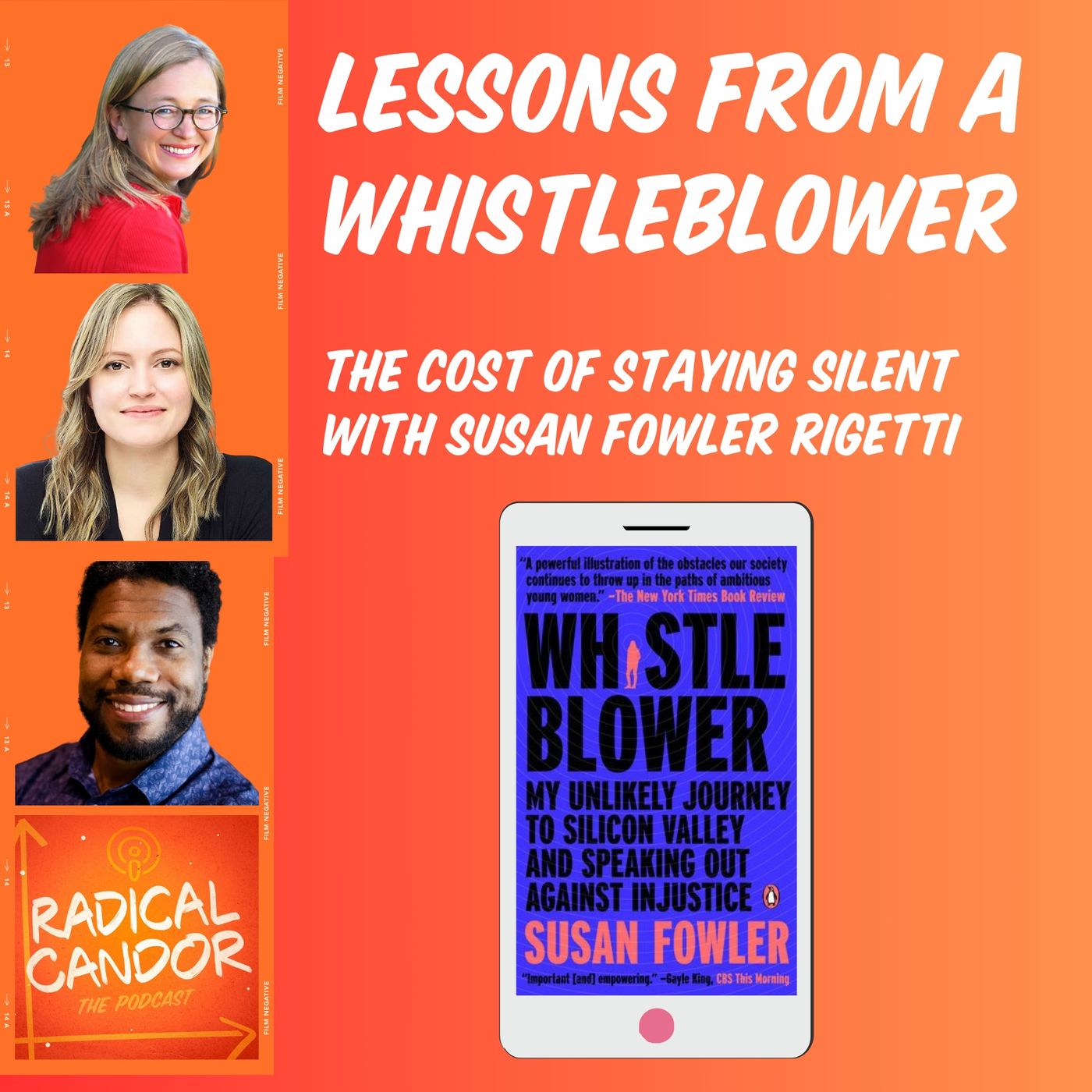
Lessons from a Whistleblower: The Cost of Staying Silent with Susan Fowler Rigetti 6 | 44
Susan Rigetti on speaking up, keeping receipts, and why silence is never the answer.We’re shaking up the workplace and diving deep into the raw reality of whistleblowing and the courage it takes to speak up with this special episode from the Radical Respect podcast. Kim, Wesley, and special guest Susan Rigetti, author of Whistleblower, break down the challenges of calling out toxic systems while being real with yourself. When harmful practices go unchecked, they don’t just derail careers—they damage the core of psychological safety that we all need to do our best work. So how do you find the strength to raise your voice when the stakes feel impossibly high? Susan shares her own powerful story of calling out the broken culture at Uber, laying out what happens when you decide you’ve had enough and choose to act. If you’ve ever struggled to raise your voice in the face of workplace dysfunction, learn why silence is never the answer and how respect and courage can transform even the most challenging environments.Get all of the show notes at RadicalCandor.com/podcast.Episode Links:How Susan Fowler Rigetti Inspired Me to Step Up and Speak OutSusan Fowler RigettiReflecting on One Very, Very Strange Year at UberWhistleblower: My Unlikely Journey to Silicon Valley and Speaking Out Against InjusticeConnect:WebsiteInstagramTikTokLinkedInFacebookXYouTubeChapters:(00:00:00) IntroductionAmy introduces the Radical Respect podcast with Kim, Wesley and guest Susan Rigetti, author of Whistleblower.(00:03:24) Whistleblower and Lessons from UberSusan discusses her book, Whistleblower, and her challenges at Uber.(00:07:13) Advice to Younger SelfThe hard lesson of recognizing when a system can’t be fixed from the inside.(00:10:33) The Cost of Staying SilentThe psychological and financial struggles many face when they stay silent.(00:14:25) Staying True to Your ValuesHow keeping a list of values helped navigate a toxic work culture.(00:16:20) Writing WhistleblowerAddressing misconceptions and setting the record straight with Whistleblower.(00:21:18) Understanding Systemic BarriersThe systemic barriers that individuals face in the workplace.(00:23:55) Reporting to HRDocumenting and reporting issues to hold organizations accountable. (00:26:20) Keeping the ReceiptsAdvice on documenting conversations and emails to protect oneself.(00:29:07) ConclusionBecome a supporter of this podcast: https://www.spreaker.com/podcast/radical-candor-communication-at-work--5711404/support.
29:4413/11/2024
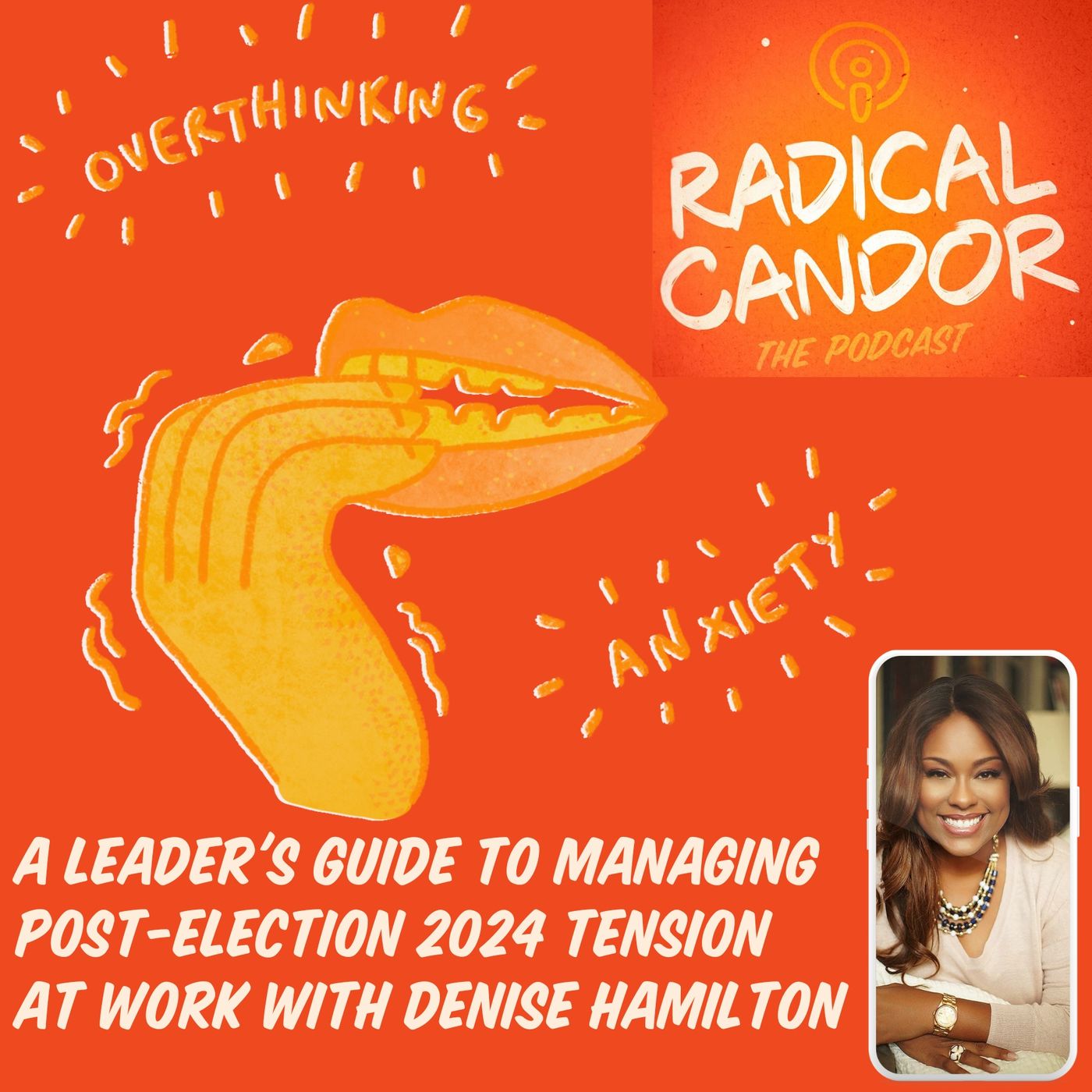
A Leader's Guide to Managing Post-Election 2024 Tension at Work With Denise Hamilton 6 | 43
Examining and expanding our capacity to hold different beliefs.Brace yourself—this episode is all about navigating workplace tension with Radical Candor. Kim and Amy team up with Denise Hamilton, author of Indivisible: How to Forge Our Differences Into a Stronger Future, to tackle the complicated landscape of workplace polarization and the radical power of respect. Denise, known for her "irrational optimism," sheds light on how we can bridge deep divides, even when it feels impossible and that respect isn’t something earned through understanding—it’s the baseline that makes understanding possible. They explore why caring personally means building trust, even when opinions clash, and how we can create workplaces that honor both individual voices and collective purpose. With Denise’s wisdom and Kim’s Radical Candor principles, this episode digs into the tough conversations leaders often avoid but desperately need. If you’ve ever felt the strain of differing views at work, this conversation is for you—because staying connected is the only way forward.Get all of the show notes at RadicalCandor.com/podcast.Episode Links:RC Pod: Political Discussions at WorkDenise Hamilton / Indivisible: How to Forge Our Differences Into a Stronger FutureRadical Respect pod: Indivisible [YouTube]WatchHerWorkDenise HamiltonConnect:WebsiteInstagramTikTokLinkedInFacebookXYouTubeChapters:(00:00:00) IntroductionKim and Amy introduce Denise Hamilton, author of Indivisible.(00:03:32) Discussing Politics at WorkInsights into the discomfort around political conversations in professional settings.(00:05:01) Contradictory MessagesThe conflicting messages people face around authenticity at work.(00:07:22) Building a Respectful Work CultureHow workplace culture influences political discussions.(00:10:59) Personal and Workplace BoundariesBalancing personal beliefs and professionalism at work.(00:12:59) The Role of Respect in UnderstandingRespect as the foundation for understanding others.(00:16:42) Holding Space for Emotions Post-ElectionThe importance of allowing emotional expression at work after tense events.(00:21:36) Leaders Counteracting NegativityThe role leaders play in intentionally fostering positivity.(00:24:03) Common Ground in Heated TimesFinding common ground with people who hold different views.(00:27:05) Approaching Sensitive Topics MindfullyDenise shares her “four-question rubric” for starting difficult conversations.(00:31:52) Navigating Information CurationThe pitfalls of curated news and incomplete information.(00:35:43) Misinformation and a Leader’s ResponsibilityHow leaders should address misinformation in their organizations.(00:39:23) Owning vs. Renting: Social ResponsibilityAdopting a long-term, invested mindset for societal change.(00:44:06) The Vision for a Relationship-Centered FutureHope for a future rooted in personal connections and humanity.(00:46:05) ConclusionBecome a supporter of this podcast: https://www.spreaker.com/podcast/radical-candor-communication-at-work--5711404/support.
46:4206/11/2024
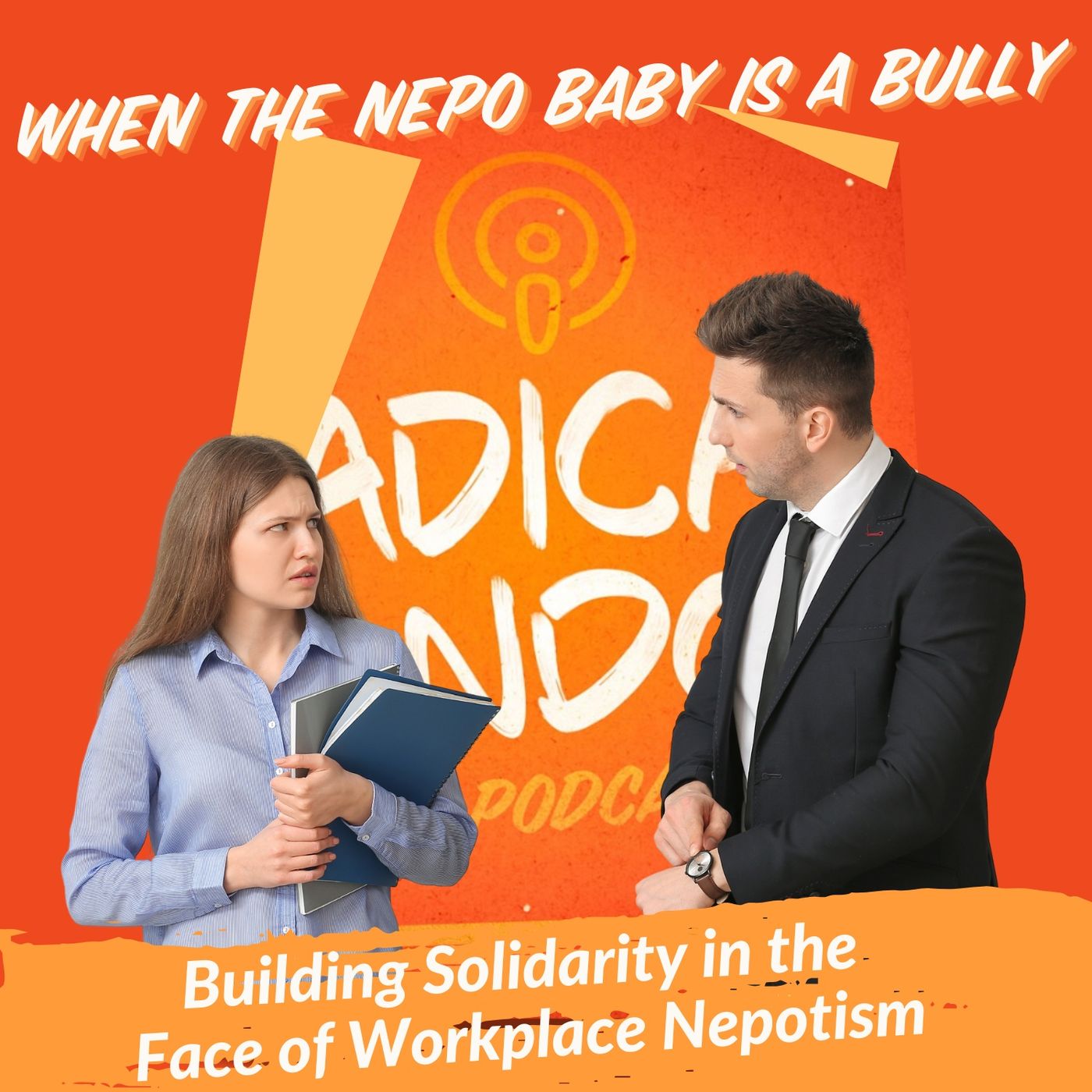
When the Nepo Baby is a Bully 6 | 42
Handling workplace bullying when family dynamics are involved.We need to talk about nepotism and workplace bullying, because WHEW, does it ever mess with our ability to Care Personally and Challenge Directly! Here's the real deal — when family ties eclipse talent, we're not just hurting individual careers. We're poisoning the well of psychological safety that teams need to thrive. How can you tell someone to "bring their whole self to work" when the rules aren't the same for everyone? KIm, Amy, and Jason explain why avoiding these conversations doesn't help anyone. Whether you're dealing with the CEO's daughter who's actually crushing it, or the founder's cousin who's... not so much, you've got to stay rooted in those two key principles: Care Personally AND Challenge Directly.Get all of the show notes at RadicalCandor.com/podcast.Episode Links:Injustice At Work: 4 Effective Ways To Respond | Radical CandorRight To BeUpstanders Vs. Bystanders: A Story Every Manager Needs To ReadWhen The A**Holes Begin To Win, The Culture Begins To LoseIt’s Better To Have A Hole Than An A**Hole ShirtsWhen Your Worst Co-Worker Is The Boss' KidCeo's Son Harassing Me At Work | RedditHow To Survive A Job You Hate (But Can't Leave – Yet) | CareershiftersHrm’s Response To Workplace Bullying: Complacent, Complicit And Compounding | Journal Of Business EthicsWorkplace Harassment | Radical Candor Podcast 6 | 30Don't Let A Bad Boss Derail You | Radical Candor Podcast 6 | 18Reflecting On One Very, Very Strange Year At Uber — Susan FowlerWhat Are Skip-Level Meetings & How To Conduct Them | Radical CandorUnpacking False Apologies & Embracing The 'aaaaac' MethodThe Asshole Survival Guide: How To Deal With People Who Treat You Like Dirt | Bob SuttonWhat Is An Employee Assistance Program (EAP)?Connect:WebsiteInstagramTikTokLinkedInFacebookXYouTubeChapters:(00:00:00) IntroductionKim, Jason, and Amy introduce the episode’s topic on a listener’s question about workplace nepotism.(00:02:52) Listener Question: Nepotistic BullyA listener’s challenging situation involving a CEO's son who is bullying employees.(00:03:48) Strategies for Workplace BullyingDocumenting incidents and preparing for a conversation with higher-ups.(00:11:43) Building Solidarity and Seeking SupportStrategies for finding allies to support you and sharing experiences with others.(00:15:44) Challenges of Confronting NepotismThe difficulty of escalating issues involving family ties at work.(00:19:25) Exit Strategies and Self-ProtectionKnowing your exit options and protecting your well-being.(00:31:17) Direct Conversations and EscalationPreparing for a direct conversation with the bully and their higher-ups.(00:38:52) The Role and Limitations of HRWhen HR should be involved in addressing workplace bullying.(00:49:06) Seeking External Legal SupportGuidance on consulting a lawyer for severe or unresolved bullying cases.(00:52:43) Radical Candor TipsTips for handling bullying, documenting, building solidarity, and escalating issues.(00:54:44) ConclusionBecome a supporter of this podcast: https://www.spreaker.com/podcast/radical-candor-communication-at-work--5711404/support.
55:5530/10/2024
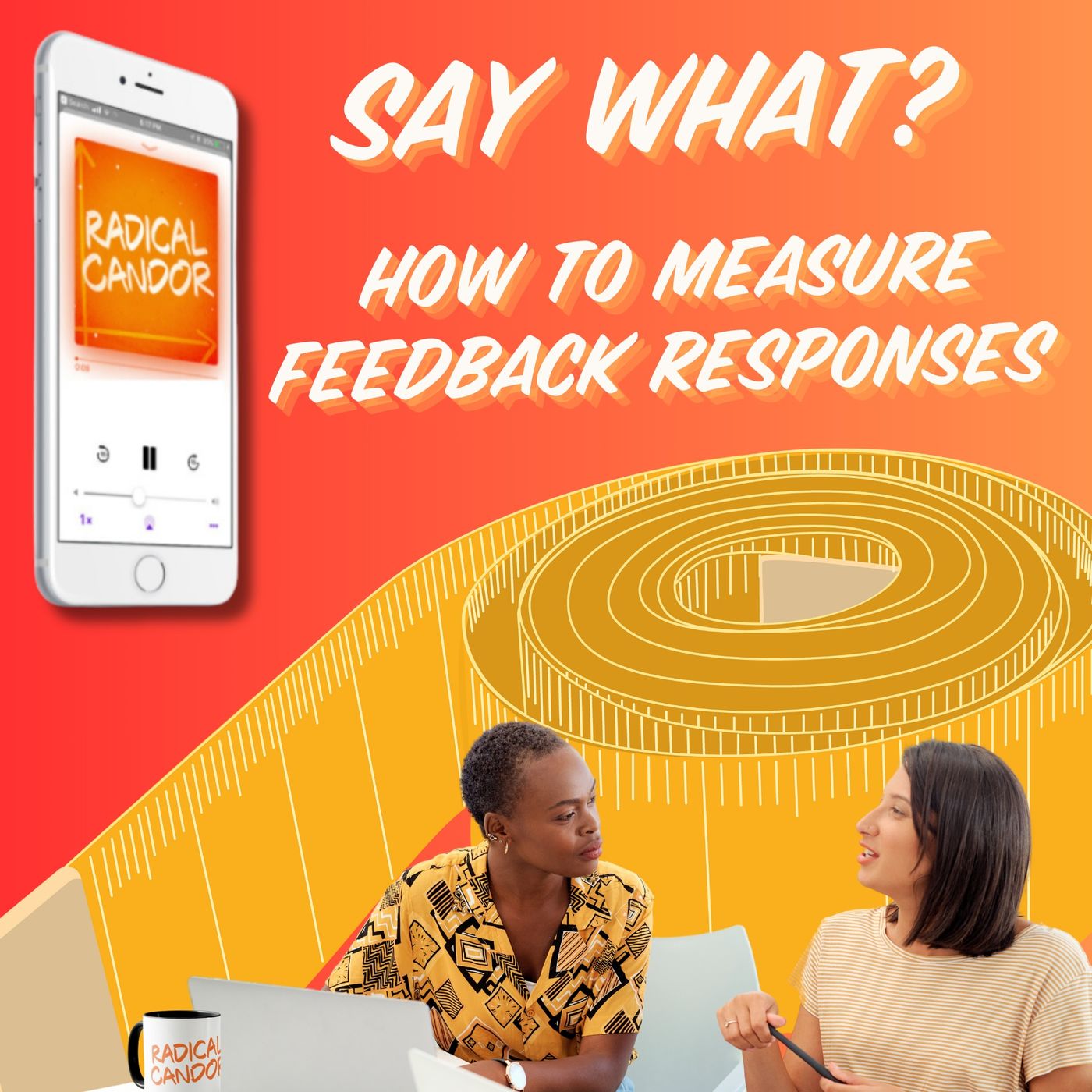
Say What? How to Measure Feedback Responses 6 | 41
With feedback, how do you measure what matters?Kim, Jason, and Amy dive into the art of measuring feedback, emphasizing that it's not just about what you say, but how it's heard. It's crucial to pay attention to how your feedback lands and be ready to adjust your approach, especially when you notice defensiveness or indifference. Tune in to explore practical strategies for handling emotional reactions while keeping your communication clear and compassionate. Learn how to stay present in tough conversations and create a space where open dialogue leads to growth and stronger relationships, both at work and in life. We'll also cover how to effectively solicit feedback and navigate defensiveness, ensuring that your interactions are not only productive but also supportive and understanding.Get all of the show notes at RadicalCandor.com/podcast.Episode Links:How to Gauge Feedback You’re Giving & Getting 3 | 4How To Gauge Your Feedback | Radical CandorWhen Someone You Love Is Upset, Ask This One Question | NY TimesThe Motivational Value Of Listening During Intimate And Difficult ConversationsWhat is Radical Candor? Radical Candor 6-Minute Crash Course 3 | Mini 1Closing the Loop: Radical Candor FAQ Finale 6 | 29How To Give Fast, Meaningful Feedback | Radical CandorThe Guest House by Mewlana Jalaluddin Rumi | All PoetryHow to Deal with Strong Emotions | Thich Nhat Hanh (short teaching video)How to Measure Feedback: It's Not What You Say, But How They Hear ItConnect:WebsiteInstagramTikTokLinkedInFacebookXYouTubeChapters:(00:00:00) IntroductionKim, Jason, and Amy introduce the episode’s focus on feedback gauging and emotional awareness.(00:01:25) Gauging Feedback The importance of understanding how feedback is received.(00:05:30) Reactions to FeedbackThe different reactions people may have to feedback and how to adapt.(00:09:14) Staying Present in Emotional ConversationsStrategies for staying present when emotions rise during difficult conversations.(00:15:59) Brushing Off FeedbackSituations where people brush off feedback and how to address it.(00:26:21) Tailoring FeedbackHow people with different sensitivities and personalities respond to feedback.(00:34:47) Pushing Further on Challenge Directly Gauging whether you should increase directness in feedback or focus on empathy.(00:43:09) Role-Play: Defensive FeedbackA scenario to illustrate how to handle a defensive response in real time.(00:50:59) Role-Play: Emotional FeedbackA scenario to illustrate how to handle an emotional response in real time.(01:00:08) Radical Candor TipsFrom checking in on feedback delivery to fostering a supportive environment.(01:03:36) Conclusion Become a supporter of this podcast: https://www.spreaker.com/podcast/radical-candor-communication-at-work--5711404/support.
01:05:0923/10/2024
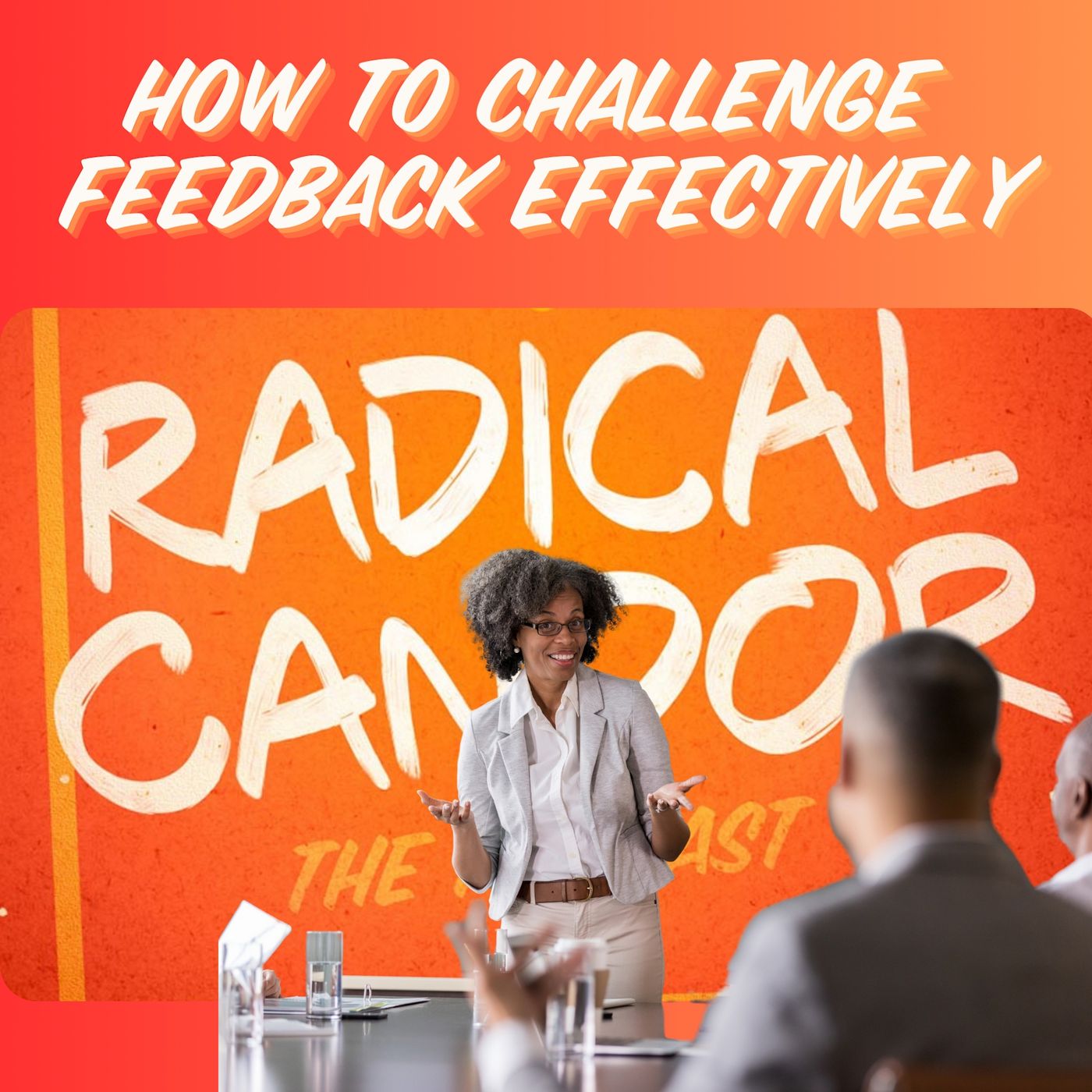
Navigating Disagreements: How to Challenge Feedback Effectively 6 | 40
Effectively manage feedback you disagree with.In this episode of the Radical Candor podcast, we tackle a challenge that's at the heart of Radical Candor: what to do when you receive feedback you don't agree with. It's a question we get all the time, and it's crucial because how we handle these moments can make or break our relationships at work. The team gets into the get into the nitty-gritty of how to respond to tough feedback and suggests specific phrases you can use to show you're listening, even if you're not fully on board.Get all of the show notes at RadicalCandor.com/podcast.Episode Links:How to Respond to Negative Feedback at Work That You Disagree With | Radical CandorListen, Challenge, Commit | Radical Candor Podcast 6 | 17Radical Candor Community6 Tips For How To Receive Feedback Well | Radical CandorFollow These 4 Steps to Create Psychological Safety in Your Teams | Fast CompanyTell Me Why I'm Wrong: Resolving Disagreements with Your Direct Reports | LinkedInThe Power Of Rituals At Work | Radical Candor Podcast 6 | 16How To Get Stuff Done | Radical Candor Podcast 4 | 2How To Give Candid Feedback Using The CORE Method | Radical CandorHow To Encourage Feedback Between Others In The Workplace | Radical CandorAlan Mullaly of Ford at Stanford Graduate School of Business | YouTubeConnect:WebsiteInstagramTikTokLinkedInFacebookXYouTubeChapters:(00:00:00) IntroductionJason and Amy introduce the live streaming episode about disagreeing with feedback.(00:02:23) Listener Question: Disagreeing with FeedbackA listener's question about how to handle feedback they disagree with.(00:03:42) The Pocket Veto: The Dangers of Silent DisagreementThe concept of a "pocket veto" and why it's harmful to silently disagree with feedback.(00:05:27) Strategies to Handle DisagreementTips on how to approach feedback in the moment.(00:11:02) How to Create Space for DisagreementInviting challenges during feedback conversations to foster honest communication.(00:16:19) The “Listen, Challenge, Commit” FrameworkThe “Listen, Challenge, Commit” approach, which helps to handle feedback.(00:19:10) Personal Experiences with FeedbackA personal story about learning to approach feedback with curiosity and humility.(00:27:51) Following Up After Formal FeedbackHow to approach follow-up conversations after receiving formal feedback.(00:34:58) Psychological Safety and Radical CandorA listener question on the link between psychological safety and Radical Candor.(00:41:11) Creating a Culture of Learning with Radical CandorExamples of workplace rituals that reinforce Radical Candor and continuous learning.(00:45:29) Metaphors for Radical CandorUsing metaphors to understand Radical Candor in communication.(00:49:17) The Radical Candor Quadrants Whether people tend to fall more frequently into one of the Radical Candor quadrants.(00:54:09) Radical Candor TipTips on practicing Radical Candor, emphasizing listening, identifying, and committing to feedback.(00:57:17) ConclusionBecome a supporter of this podcast: https://www.spreaker.com/podcast/radical-candor-communication-at-work--5711404/support.
58:3816/10/2024
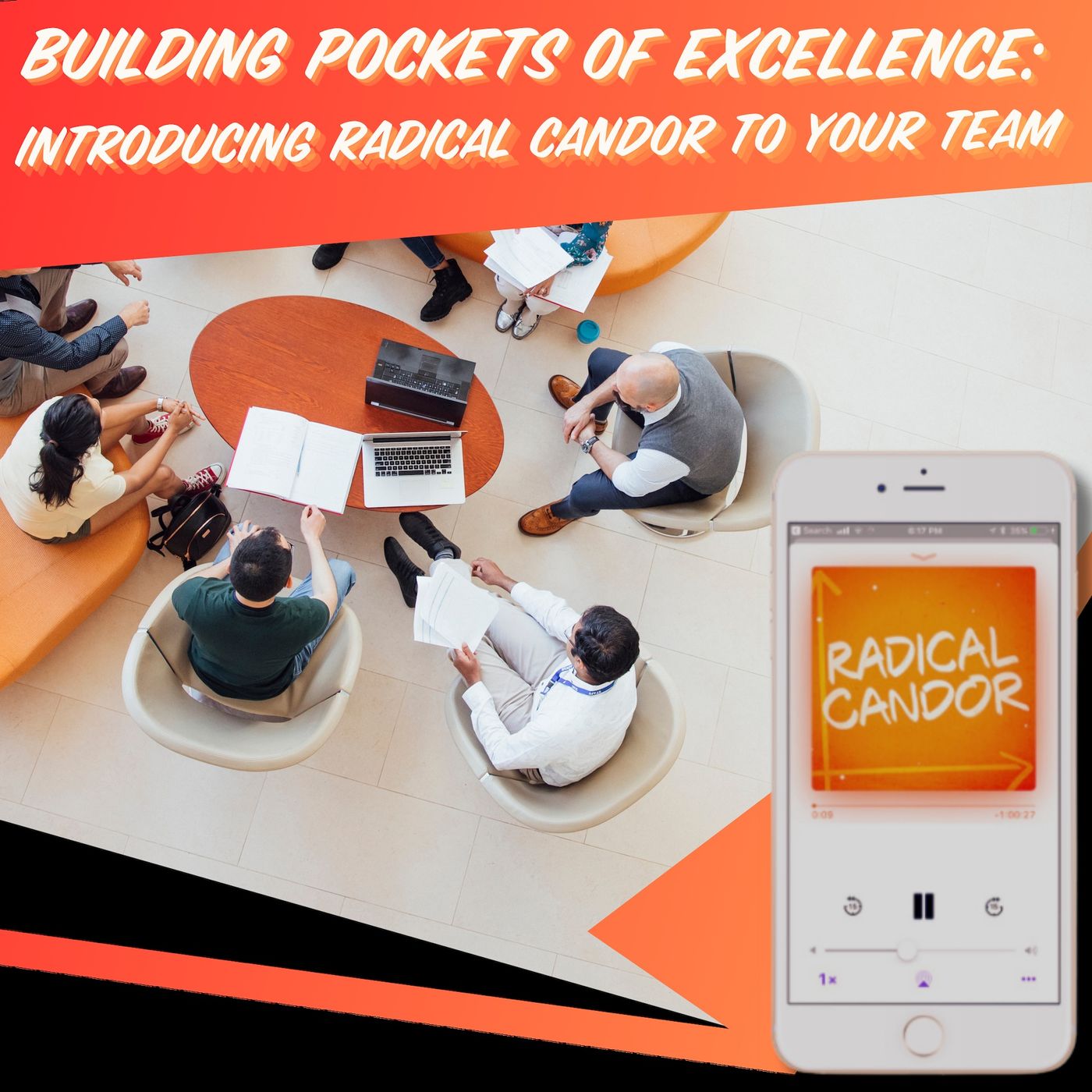
Building Pockets of Excellence: Introducing Radical Candor to Your Team 6 | 39
Start small to make change more achievable and impactful.In this episode of the Radical Candor Podcast, Jason and Amy discuss how to introduce radical candor to teams effectively. They emphasize the importance of starting small, creating pockets of excellence, and the role of accountability and praise in fostering a feedback culture. The conversation also covers effective communication strategies for implementing change, real-world examples of cultural shifts, and practical tips for individuals and teams looking to embrace radical candor. The episode concludes with an invitation to join the Radical Candor community for ongoing support and resources.Get all of the show notes at RadicalCandor.com/podcast.Episode Links:Building a Radically Candid Culture | LinkedIn6 Steps for Rolling Out Radical Candor | Radical Candor3 Ways to Introduce Radical Candor's Feedback Framework to Your Organization | Radical CandorRadical Candor Book Discussion Guide | Radical CandorRadical Candor CommunityHow To Give Candid Feedback With the Radical Candor CORE Method | Radical CandorConnect:WebsiteInstagramTikTokLinkedInFacebookXYouTubeChapters:(00:00:00) IntroductionJason and Amy introduce the topic of bringing Radical Candor into the workplace.(00:00:27) Starting with Small ChangesWhy starting with small steps is key to building a culture of Radical Candor.(00:02:57) Pockets of ExcellenceThe concept of pockets of excellence and why they are crucial for cultural change.(00:05:30) Highlighting Small SuccessesThe importance of highlighting successes rather than focusing on failures to drive cultural shifts.(00:08:30) Avoiding Overwhelming ChangeEffective communication about small wins to shift organizational perceptions and build optimism.(00:10:49) Small Change Success StoryA story on how small experiments can create big organizational change.(00:15:38) Making Feedback Visible and AccessibleSimple tools to share user feedback that can have a powerful impact on organizational culture.(00:19:37) Effective Communication for Cultural ChangeCommunicating the rationale behind introducing Radical Candor to a broader team.(00:24:07) Handling Executive SkepticismAddressing skepticism from executives and making the case for Radical Candor.(00:27:03) Building Momentum After Initial SuccessExpanding Radical Candor across more teams after initial success.(00:30:16) Individuals Practicing Radical CandorAdvice for individuals looking to start small and integrate Radical Candor into their work.(00:33:09) Radical Candor TipsTips for developing a more radically candid culture individually and in organizations.(00:34:56) ConclusionBecome a supporter of this podcast: https://www.spreaker.com/podcast/radical-candor-communication-at-work--5711404/support.
36:0409/10/2024
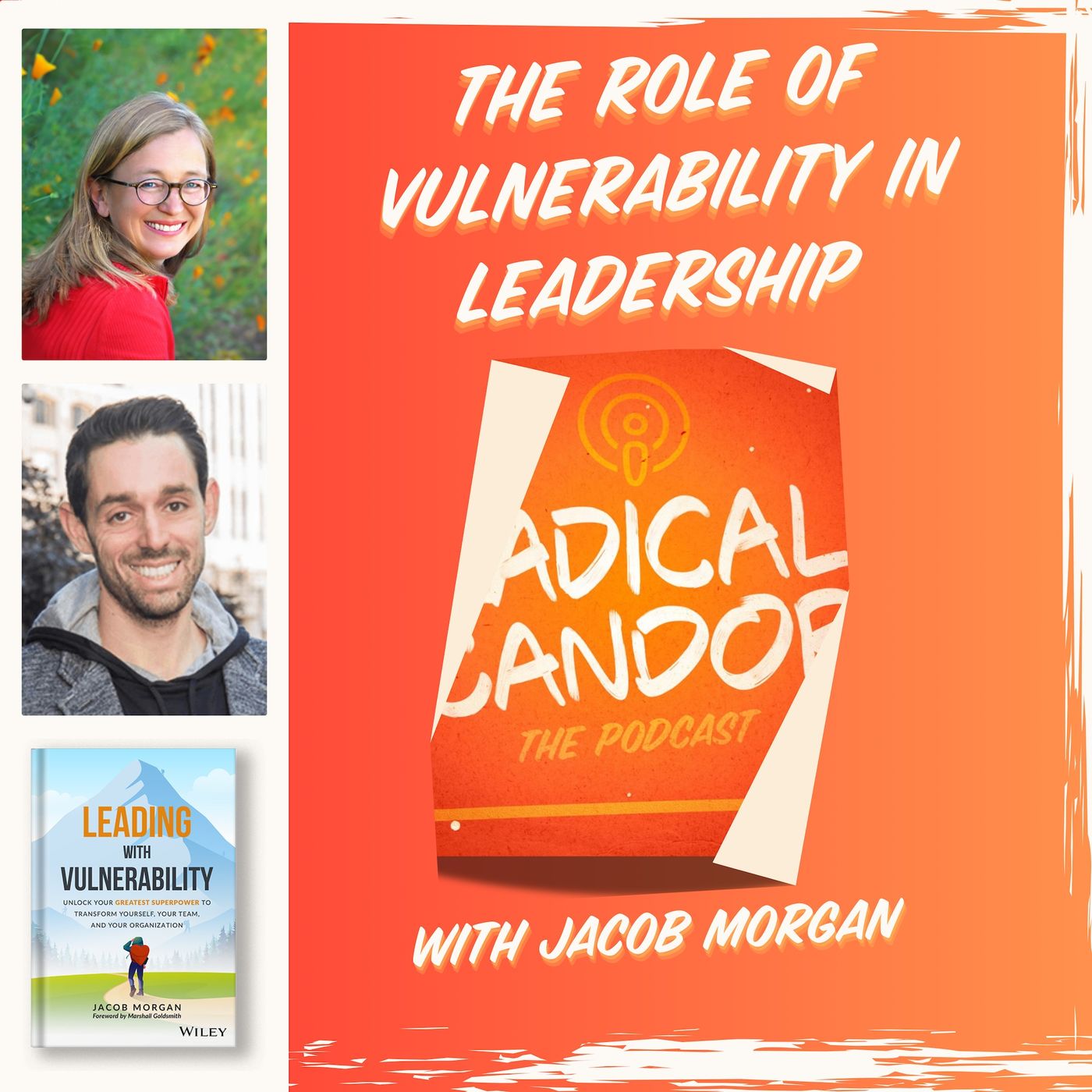
The Role of Vulnerability in Leadership with Jacob Morgan 6 | 38
How leaders can balance vulnerability with competence.Kim and Jacob Morgan, author of Leading with Vulnerability, discuss the power of vulnerability in leadership and its role in building trust and driving performance. They explore the common misconceptions about vulnerability, the balance between competence and connection, and how to navigate the fine line between strength and openness. Jacob shares stories of successful and failed leadership, emphasizing the importance of choosing the right moments to be vulnerable. The conversation also touches on how to foster psychological safety, deal with workplace bullies, and follow with vulnerability in challenging environments.Get all of the show notes at RadicalCandor.com/podcast.Episode Links:Denial: Why Business Leaders Fail to Look Facts in the Face—and What to Do About It | Richard TedlowLeading with Vulnerability: Unlock Your Greatest Superpower to Transform Yourself, Your Team, and Your Organization | Jacob MorganPerformance Improvement Plans | Radical Candor Podcast 5 | 20What Does Managing Out Mean? | Radical Candor Podcast 6 | 6 Beware The Fundamental Attribution Error | Radical Candor Podcast 5 | 8How To Give Candid Feedback Using The CORE Method | Radical Candor5 Proven Ways Checks And Balances In Management Bolster Teams | Radical CandorFollow these 4 steps to create psychological safety in your teams | Fast CompanyShrill | Lindy WestThe Vulnerable Leader Equation: A critical leadership development model for successful change management | HRDJacob MorganFortune lists tough bosses | UPI ArchivesCan Workplaces Have Too Much Psychological Safety? | HBRConnect:WebsiteInstagramTikTokLinkedInFacebookXYouTubeChapters:(00:00:00) IntroductionAmy and Kim introduce guest Jacob Morgan, author of Leading with Vulnerability. (00:00:38) Defining Vulnerability in LeadershipThe concept of vulnerability in leadership and how it can be misinterpreted.(00:03:45) Denial in LeadershipHow denial impacts leadership and the challenges leaders face when addressing mistakes.(00:06:48) Exploiting VulnerabilityAn example of a leader who used an exployee’s vulnerability against them.(00:10:41) Self-Compassion in LeadershipThe need for self-compassion, particularly when vulnerability is exploited.(00:12:46) Vulnerability in Uncertain SituationsA step-by-step approach to assessing when and how to display vulnerability at work.(00:18:36) Knowing Who to TrustHow leaders and employees can discern when it’s appropriate to be vulnerable.(00:21:11) Effective Leadership in Times of CrisisA success story about Fleetwood Grobler’s leadership during a financial crisis at Sasol.(00:25:28) Dealing with Workplace BulliesThe complexities of vulnerability when facing workplace bullying.(00:33:03) Following with VulnerabilityTips on how to assertively respond to challenging leaders while maintaining professionalism.(00:37:18) Fundamental Attribution ErrorThe importance of not jumping to conclusions about people's intentions.(00:43:22) Creating Psychological SafetyThe balance between accountability and psychological safety.(00:45:37) ConclusionBecome a supporter of this podcast: https://www.spreaker.com/podcast/radical-candor-communication-at-work--5711404/support.
46:1602/10/2024
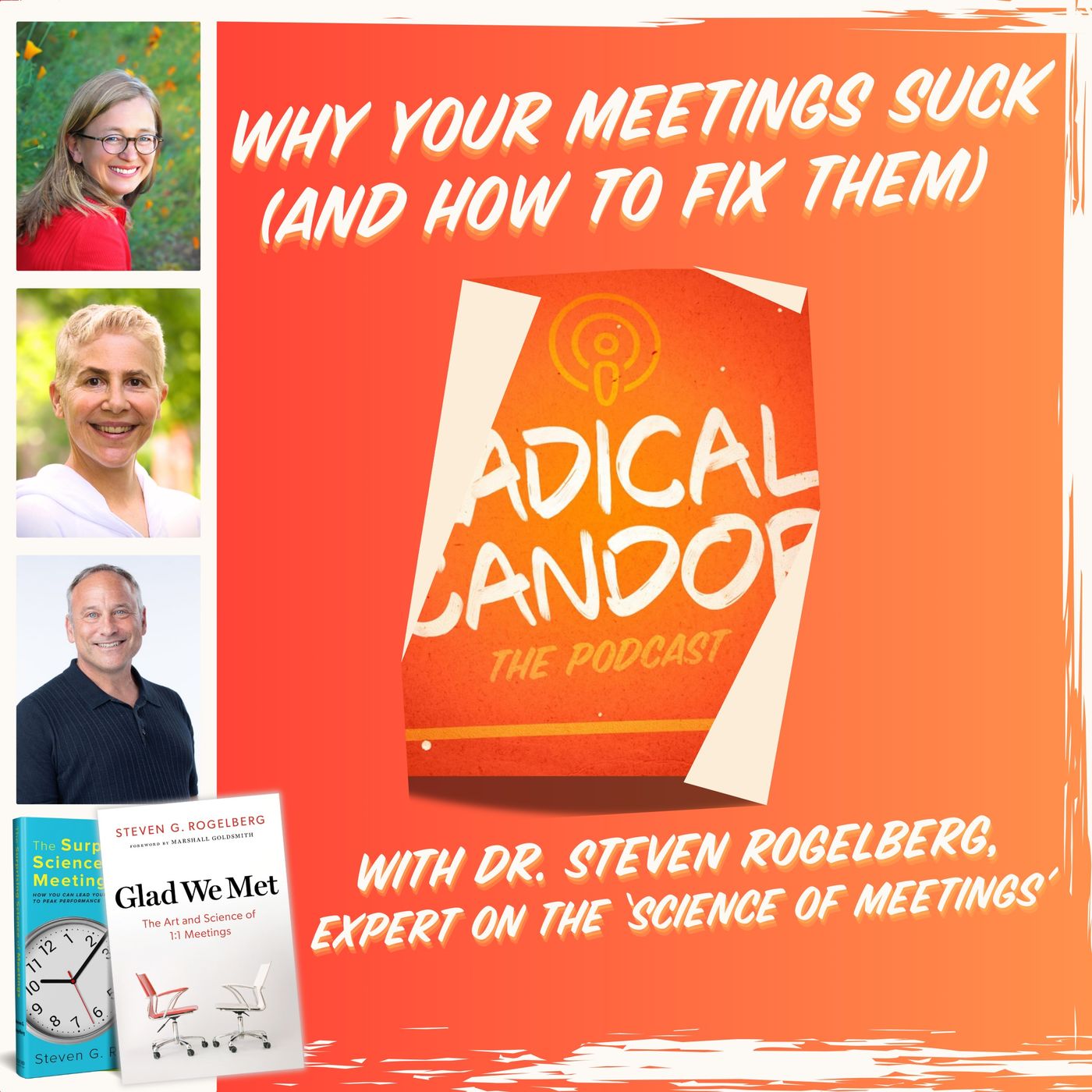
Why Your Meetings Suck (And How to Fix Them): Insights from Dr. Steven Rogelberg 6 | 37
Make your meetings count.Explore the surprising science of meetings and how to make them suck less with Dr. Steven G. Rogelberg, a renowned organizational psychologist and author of The Surprising Science of Meetings, Glad We Met: The Art & Science of 1:1 Meetings, and more. Dr. Rogelberg discusses with Kim and Amy why meetings often feel unproductive and costly, covering common pitfalls and offering actionable strategies to enhance their effectiveness. The conversation spotlights the power of one-on-one meetings, emphasizing their unique role in fostering meaningful connections between managers and employees. Dr. Rogelberg shares insights on how to structure these meetings to maximize engagement, support, and productivity, making them a crucial tool for leadership and team success.Get all of the show notes at RadicalCandor.com/podcast.Episode Links:Steven Rogelberg7 Ways To Improve One-on-One Meetings | Radical CandorEffective 1:1s - Tips For One-on-One Meetings With Your Team | Radical Candor3 Tips For How To Run Effective Staff Meetings | Radical CandorGlad we Met: The Art and Science of 1:1 Meetings — Steven Rogelberg, Ph.D.The Surprising Science of Meetings — Steven Rogelberg, Ph.D.Connect:WebsiteInstagramTikTokLinkedInFacebookXYouTubeChapters:(00:00:00) IntroductionKim and Amy introduce guest Dr. Steven Rogelberg, organizational psychologist and an expert on meetings.(00:04:18) The Impact of MeetingsThe surprising volume of meetings globally and the underestimated economic impact.(00:07:03) Misconceptions and Optimizing Meeting StrategiesMisconceptions about meetings and advice on improving their effectiveness.(00:10:36) Are Your Meeting Questions Valuable?How to ensure that the meeting agenda questions are valuable.(00:11:39) Using Radical Candor in MeetingsThe idea of a Radical Candor framework with signals during meetings.(00:13:32) Should Feedback Be Part of the Meeting?Whether feedback should be solicited at the end of meetings.(00:16:05) Speaking Up in MeetingsAdvice on encouraging team members to speak up in meetings.(00:20:03) The Importance of 1:1 MeetingsResearch that highlights the desire for more 1:1 meetings.(00:23:21) Relationship Building in 1:1sThe importance of building genuine relationships through consistent 1:1 meetings.(00:28:42) How to Start 1:1 MeetingsTips on starting 1:1 meetings, their appropriate cadence and setting the right tone.(00:31:24) Locations and Structure for 1:1 MeetingsThe best locations for 1:1 meetings and structuring the agenda for them.(00:41:16) Preparing for Meetings with Your ManagerHow employees should prepare for meetings with their managers.(00:46:19) ConclusionBecome a supporter of this podcast: https://www.spreaker.com/podcast/radical-candor-communication-at-work--5711404/support.
46:5725/09/2024
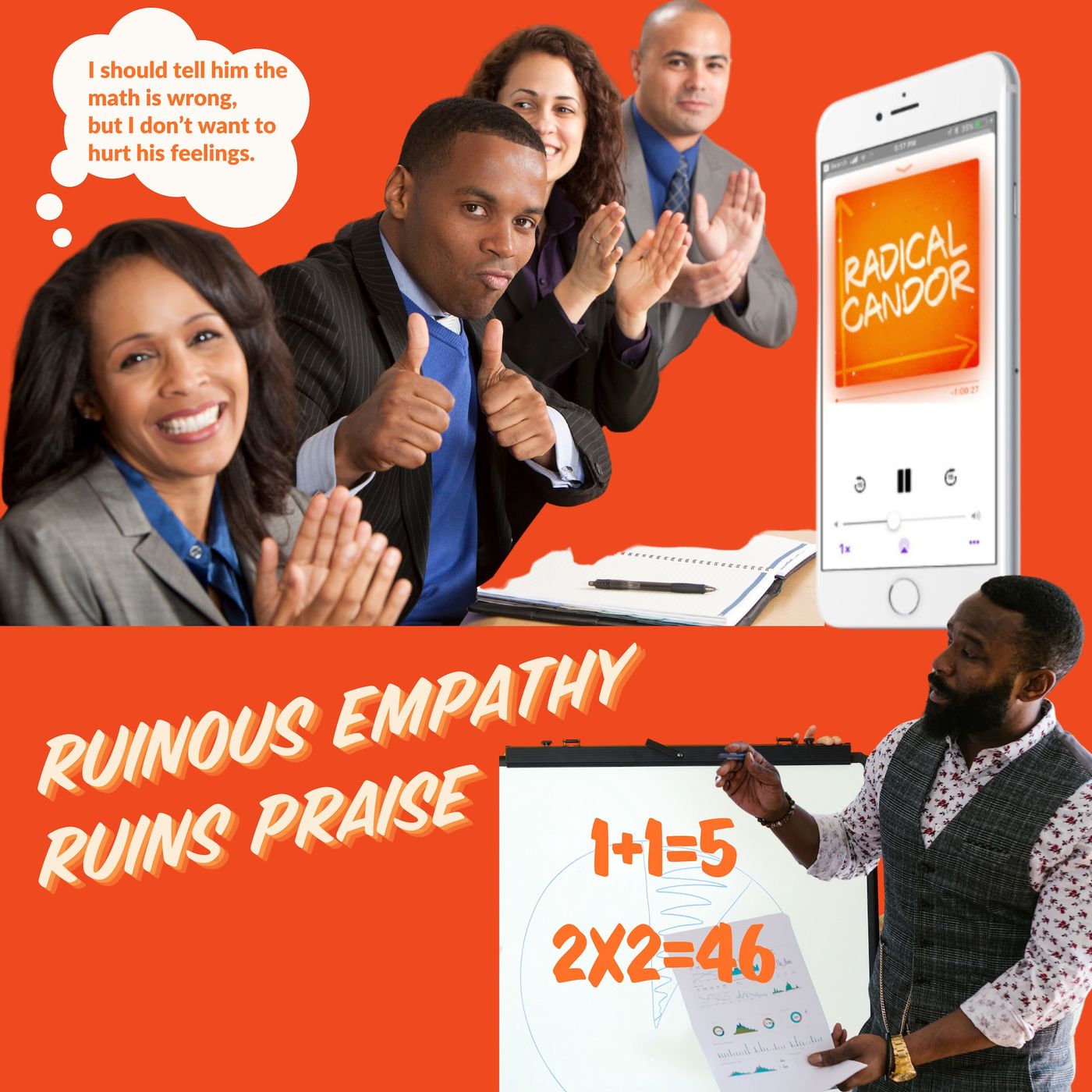
How Ruinous Empathy Ruins Praise 6 | 36
How misguided praise can do more harm than good.Praise can be powerful, but when it’s vague, generic, or something you can say to a dog like "good job," it can backfire and do more harm than good. Kim, Jason, and Amy explore the nuances of Ruinous Empathy and praise, sharing real-life examples, like the infamous FEMA response during Hurricane Katrina, to illustrate the pitfalls of Ruinously Empathetic feedback. They discuss the importance of making praise specific and sincere so people know what was good and why, allowing them to repeat their success. Get all of the show notes at RadicalCandor.com/podcast.Episode Links:Praise & Ruinous Empathy | Radical CandorTips to Avoid Ruinously Empathetic Praise | Radical CandorAppreciation (That's What The Money's For!) | Radical Candor 5 | 16Radical Candor Podcast: A Tale Of Ruinous EmpathyBeyond 'Sorry': How to Apologize and Mean It 6 | 22DARVO | WikipediaBeing 'Nice' Instead of Kind is One of the Biggest Mistakes Well-Intentioned Bosses MakeConnect:WebsiteInstagramTikTokLinkedInFacebookXYouTubeChapters:(00:00:00) IntroductionKim, Jason, and Amy introduce the episode's focus on how praise can become ruinously empathetic.(00:00:53) What Is Ruinous Empathy in Praise?How praise can be ineffective when it's vague, insincere, or lacks specific feedback.(00:02:19) Defining Praise vs. CriticismWhat constitutes praise, how it differs from criticism and the dangers of insincere praise(00:06:06) Effective Public Support and PraiseGuidance for leaders on how to support team members publicly after a mistake.(00:11:51) Consequences of Praising FailureWhy offering praise after failure can be misleading and harmful.(00:17:04) The Role of Specificity in PraiseThe importance of specificity in making praise feel sincere and useful.(00:22:11) Ruinous Empathy and Manipulative InsincerityThe nuances between ruinously empathetic praise and manipulatively insincere praise.(00:33:07) Insincere PraiseAvoiding the common pitfalls of insincere praise in leadership and team management.(00:36:53) Offering Effective PraisePractical tips on how to offer specific and sincere praise that drives improvement.(00:40:56) Radical Candor TipsTips for applying Radical Candor to praise, ensuring feedback is specific, sincere, and purposeful.(00:42:18) ConclusionBecome a supporter of this podcast: https://www.spreaker.com/podcast/radical-candor-communication-at-work--5711404/support.
43:3418/09/2024
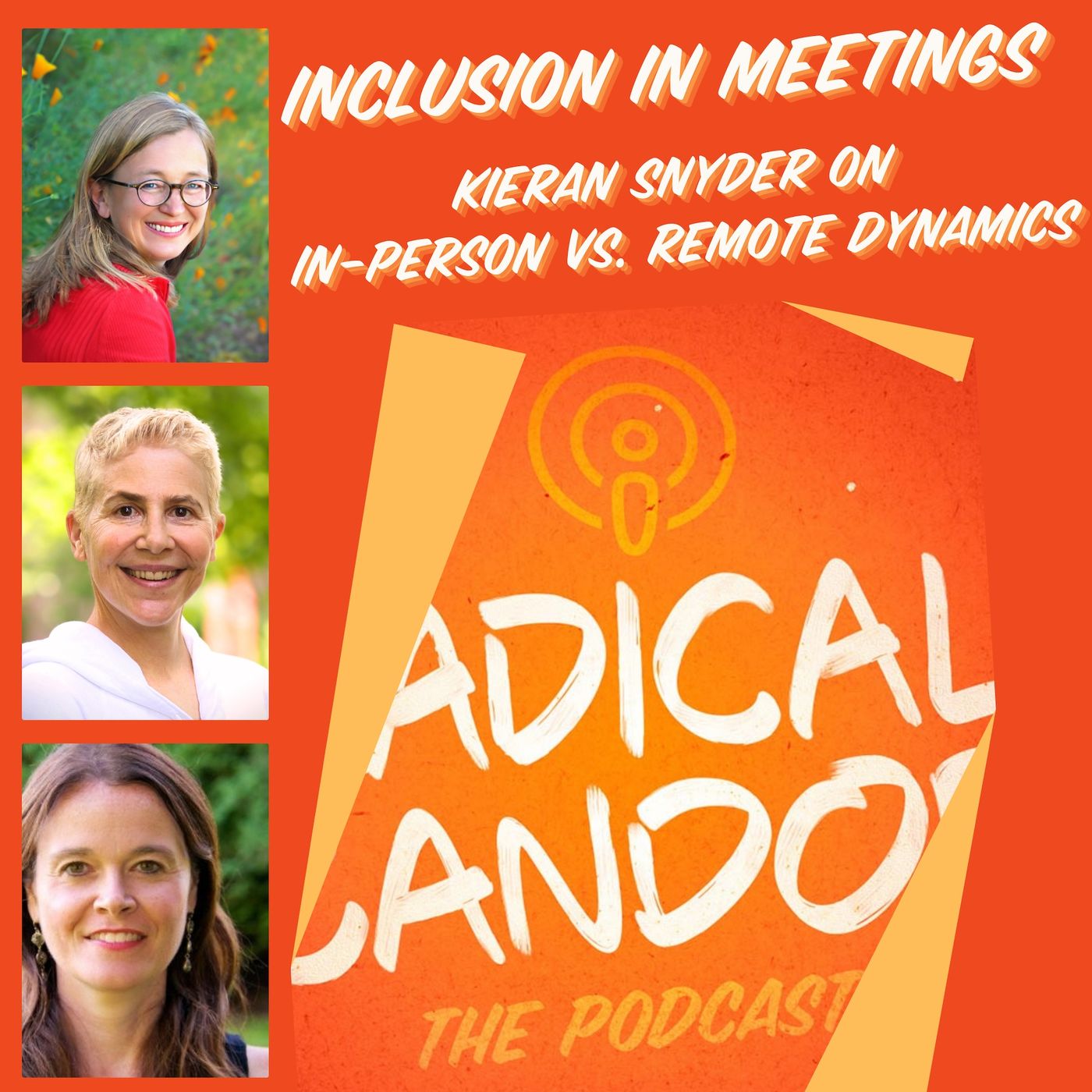
Inclusion in Meetings: Kieran Snyder On In-Person vs. Remote Dynamics 6 | 35
The surprising data on inclusivity in different meeting settings.Kieran Snyder, founder of nerd processor and co-founder of Textio, joins the Radical Candor podcast to explore inclusivity in meetings, revealing data-driven insights from her research on in-person versus remote settings. Kieran discusses the dynamics of interruptions, idea credit-taking, and the impact of power and gender on participation. With over 1,100 hours of meeting data analyzed, she sheds light on the complexities of remote work, the significance of structured agendas, and the importance of leadership in fostering inclusive environments. The episode offers practical tips for leaders to enhance meeting engagement and navigate the evolving landscape of workplace communication.Get all of the show notes at RadicalCandor.com/podcast.Episode Links:Dear Manager, You’re Holding Too Many Meetings | HBRWhy Gender Bias Makes Giving Feedback Hard For Everyone | Radical CandorRadically Inclusive Virtual Workshops: Real-Time Learnings From Zoom | Radical Candor7 Leadership Communication Skills For Managing A Remote Team | Radical CandorNerd ProcessorKieran Snyder - Nerd Processor | LinkedinPerformance Review Gender Bias: High-Achieving Women Are 'abrasive' | FortuneThe Price All Women Pay For Gender Bias | Forbes Connect:WebsiteInstagramTikTokLinkedInFacebookXYouTubeChapters:(00:00:00) IntroductionAmy and Kim introduce Kieran Snyder, founder of Nerd Processor, to discuss inclusivity in meetings.(00:02:36) The Abrasive TrapThe abrasiveness trap and how high-performing women are more often criticized.(00:07:27) Power Dynamics in MeetingsHow power dynamics influence interruptions in meetings.(00:14:27) In-Person vs. Remote Meetings: ResearchKieran’s study comparing remote and in-person meetings to measure inclusivity.(00:18:02) Meeting Participation RatesThe changes in participation rates as meeting size increases.(00:20:27) Gender Differences in Meeting Participation The impact remote meetings have on women's participation rates.(00:27:42) Idea Annexation vs. SpotlightingThe concept of idea annexation and the importance of idea spotlighting.(00:32:22) Dynamics of “I Told You So” Usage of “I told you so” in meetings and the demographic variations.(00:36:52) Practical Tips for Inclusive Meetings Tips on fostering inclusive meeting environments.(00:43:14) Balancing Remote Work and InclusivityThe trade-offs between diversity and ensuring inclusivity in meetings.(00:47:53) Leadership in Meeting InclusivityThe importance of leadership in setting inclusive meeting norms.(00:51:10) How to ConnectInformation on how to connect with Kieran Snyder.(00:52:38) ConclusionBecome a supporter of this podcast: https://www.spreaker.com/podcast/radical-candor-communication-at-work--5711404/support.
53:5111/09/2024
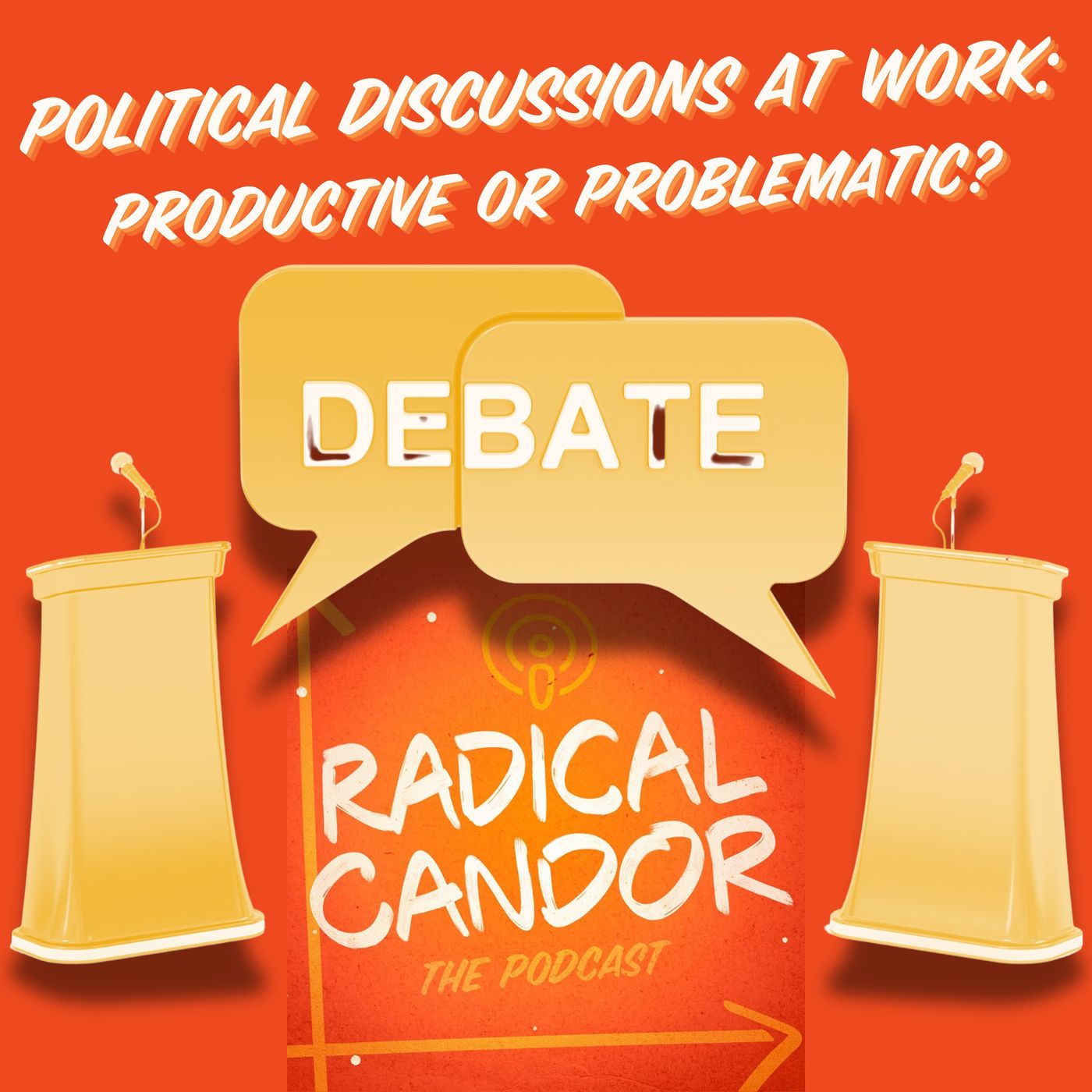
Political Discussions at Work: Productive or Problematic? 6 | 34
Political discussions at work can be polarizing, but they don't have to be.How do you handle political conversations at work without crossing boundaries or alienating colleagues? The team dives into the complex and often uncomfortable topic of discussing politics at work, exploring the impact of these conversations on workplace dynamics, productivity, and personal relationships. Kim, Jason, and Amy share insights on navigating political discussions with respect, setting boundaries, and maintaining open dialogue without imposing beliefs on others. Drawing on personal anecdotes and thought-provoking statistics, the conversation provides practical tips for managers and employees alike on fostering an inclusive environment where diverse viewpoints can coexist without derailing professional harmony.Get all of the show notes at RadicalCandor.com/podcast.Episode Links:ResumeHelp’s Politics in the Workplace Study 2024 | Resume HelpReacting To Trump's Bloviating BS With Radical Candor | Radical CandorWhat to Do When Your Coworker Brings Up Politics | HBRThe Story of Basecamp’s Disastrous Policy | The VergeRadical Candor Podcast SwagKim Scott & Tiffani Lee Discuss Using Radical Candor to Improve DEI Conversations | Radical Candor 2 | 5Q&A: Why 'Respect' Is A Radical Workplace Concept | Yahoo FinanceAnother Contentious US Election Means A Worker Productivity Dip | The Seattle TimesSarah Palin and Hillary Address the Nation | SNLConnect:WebsiteInstagramTikTokLinkedInFacebookXYouTubeChapters:(00:00:00) IntroductionKim, Jason, and Amy introduce the episode’s focus on the impact of political discussions in the workplace.(00:02:55) The Value of Being ChallengedThe importance of being open to challenges to avoid turning beliefs into prejudices.(00:07:00) Banning Political Speech: Is It Helpful?The consequences of banning or discouraging political discussions at work.(00:11:22) Managing Expression in the WorkplaceThe boundaries of expressing political beliefs without personalizing or offending.(00:16:31) Building Bridges Over BoundariesBuilding bridges between differing viewpoints, using curiosity and respect.(00:21:49) The Challenge of Constant Election CyclesHow perpetual election cycles can deepen divisions and polarize discussions.(00:23:20) Working Through Political DifferencesManaging team members with conflicting political views and policies.(00:27:09) The Dangers of Silence Around Sensitive TopicsWhy avoiding discussions on polarizing subjects can lead to more significant conflicts.(00:33:24) Setting Clear Boundaries on Political ExpressionWhether companies should set proactive policies on political expression.(00:36:13) Balancing Productivity and Political DiscussionsWays to address the potential productivity dip during heated political periods.(00:39:51) When Humor Crosses the LineA time when sharing a politically charged joke at work made a team member feel excluded.(00:45:18) Radical Candor TipsPractical tips for fostering respectful discourse and maintaining professional boundaries.(00:48:18) ConclusionBecome a supporter of this podcast: https://www.spreaker.com/podcast/radical-candor-communication-at-work--5711404/support.
49:3004/09/2024

When Feedback Fails: Repairing Relationships After Feedback is Ignored 6 | 33
Rebuilding Trust and Communication When Feedback is IgnoredFeedback can be tough to give and at times even harder to receive. But what about when it’s ignored? Jason and Amy tackle a listener's challenging workplace scenario involving ignored feedback, toxic dynamics, and a strained relationship with their boss. Through role play, practical advice, and Radical Candor tips, they explore how to rebuild trust, address emotional wounds, and navigate difficult conversations when feedback isn't properly received. Get all of the show notes at RadicalCandor.com/podcast.Episode Links:Fears For Tears | Radical Candor Podcast 6 | 7Navigating Emotional Reactions at Work | Radical Candor Podcast 2 | 16Absentee Management Vs. Quiet Firing | Radical Candor Podcast 5 | 3How To Apologize And Mean It | Radical Candor Podcast 6 | 22Emotional Reactions At Work Are Awkward: Here’s How To Deal | Radical CandorWhen Your Employee Feels Angry, Sad, or Dejected | HBRConnect:WebsiteInstagramTikTokLinkedInFacebookXYouTubeChapters:(00:00:00) IntroductionJason and Amy introduce the episode and outline the listener's challenging feedback scenario.(00:00:49) Listener's Story: Feedback IgnoredA listener's story about workplace toxicity and a strained relationship with their boss.(00:02:26) Insights on Conflicting PerceptionsThoughts on the listener's situation, drawing parallels with similar experiences.(00:07:57) Role Play: The Listener and the Neglectful BossA role-play of the scenario, with Amy as the listener and Jason as the unresponsive boss.(00:12:04) Analysis of the Role Play Reflecting on the role play, discussing the emotional challenges and complexities of the situation.(00:15:00) Strategies for Rebuilding the RelationshipPractical steps for the listener to rebuild trust and communication with their boss.(00:17:31) The Value of Regular Check-InsThe importance of scheduling regular one-on-ones to maintain alignment and trust.(00:21:17) Managing Expectations: When to Ask for an ApologyThe need for apologies versus focusing on practical solutions to improve the work relationship.(00:23:19) Radical Candor TipsActionable tips on managing feedback, emotions, and when to consider leaving a job.(00:25:56) ConclusionBecome a supporter of this podcast: https://www.spreaker.com/podcast/radical-candor-communication-at-work--5711404/support.
27:1228/08/2024
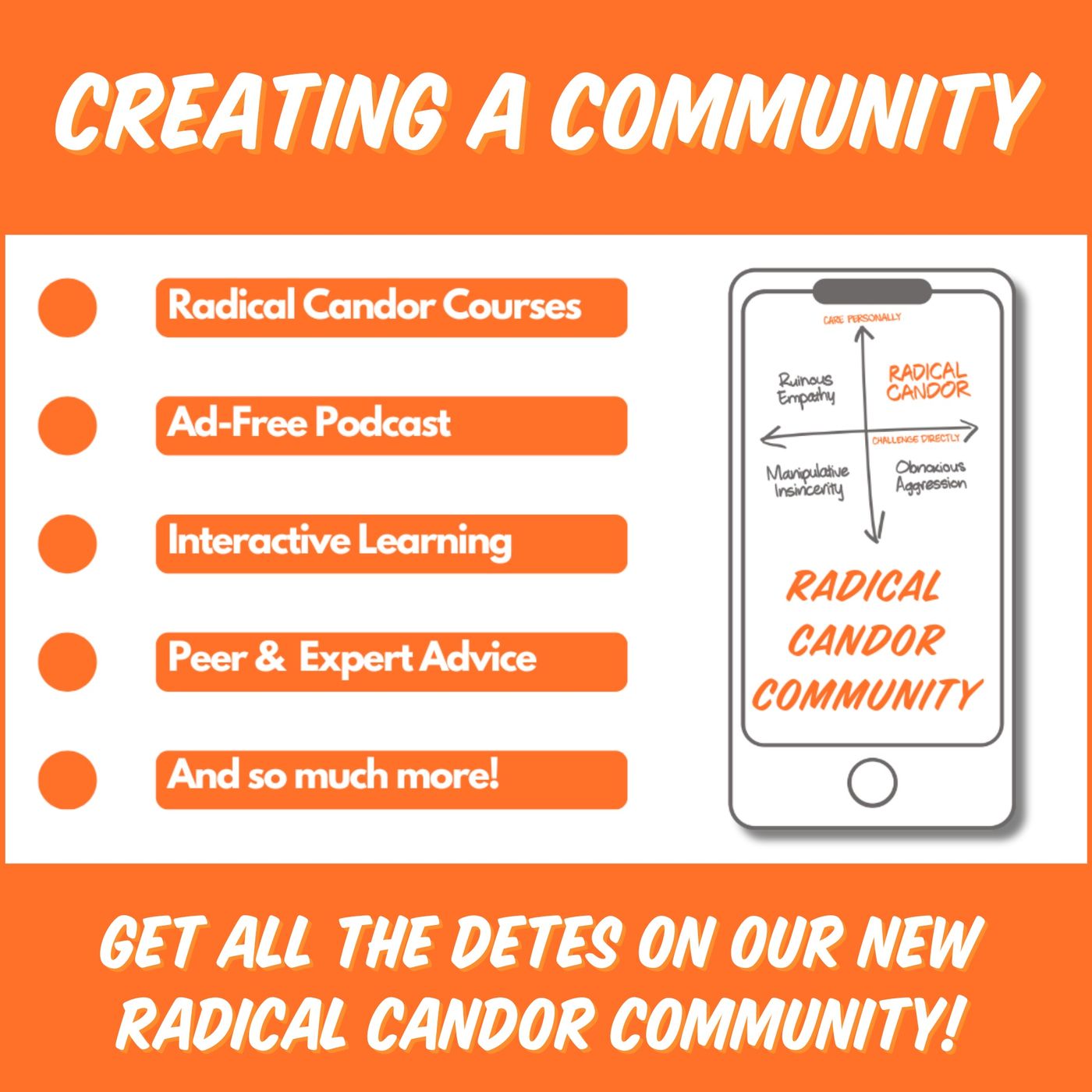
Creating a Community 6 | 32
Radical Candor is creating a community! Learn how we’re combining peer and expert coaching, real-time events, and curated content into one engaging platform.Jason and Amy discuss the creation of Radical Candor's new online community designed to help people leaders stress less, build stronger relationships, and connect with peers and pros. Jason emphasizes the importance of community-based learning and he and Amy reflect on the challenges and rewards of building a space for continuous learning and personal growth. Join them as they discuss how aspiring and experienced managers alike can benefit from this exciting new venture.Get all of the show notes at RadicalCandor.com/podcast.Connect:WebsiteInstagramTikTokLinkedInFacebookXYouTubeChapters:(00:00:00) IntroductionJason and Amy introduce the episode, outlining a Radical Candor community Jason’s been working on.(00:00:26) The Concept of Radical Candor CommunityAn overview of an upcoming Radical Candor online community.(00:04:25) Project Management and Setting GoalsHow the project started from two primary goals leading to the development of the community. (00:06:13) Early Experiments and SurveysThe experiments and surveys conducted to gather data and test different ideas for the community.(00:11:11) Key Learnings from the ExperimentsHow the idea of a community emerged as the most impactful way to teach Radical Candor.(00:16:11) Community Tools and PlatformChoosing a platform for the community and the research process in selecting the right tools for the project.(00:22:08) Tackling Unfamiliar TerritoryBalancing familiar tasks with the challenge of learning new skills for community building.(00:24:43) Collaboration and Team CommunicationThe importance of team collaboration and communication for the project.(00:27:40) Soft Launch and Future PlansThe community’s soft launch and how listeners can get involved.(00:31:05) Building Vulnerability in CommunityThe implicit need for vulnerability in an online community and the importance of creating a safe space.(00:35:37) Radical Candor TipsTips for starting and managing new projects with an emphasis on experimentation and collaboration.(00:38:37) ConclusionBecome a supporter of this podcast: https://www.spreaker.com/podcast/radical-candor-communication-at-work--5711404/support.
39:4121/08/2024

Remarkably Candid: Insights from Guy Kawasaki 6 | 31
Guy Kawasaki get’s remarkably candid with Radical Candor.On this episode of the Radical Candor podcast, Amy and Kim sit down with the remarkable Guy Kawasaki, Chief Evangelist at Canva and host of the Remarkable People podcast. The conversation delves into Guy's storied career, his insights on leadership, and his newest book, Think Remarkable: 9 Paths to Transform Your Life and Make a Difference. They explore the concept of being remarkable, the importance of saying yes, and the value of grit, growth, and grace in both personal and professional life. With humor and candor, Guy shares anecdotes from his journey, offering listeners valuable lessons on how to make a difference and lead a meaningful life. Get all of the show notes at RadicalCandor.com/podcast.Episode Links:Guy KawasakiBooks | Guy Kawasaki Guy Kawasaki's Remarkable People Podcast Think Remarkable | Guy KawasakiGuy Kawasaki | SubstackIs There Better Than Better | Ellen Langer Developing a Growth Mindset with Carol DweckMindset | Carol DweckKim Scott: The Power of Radical Respect and Candor | YouTubeThe Problem With Passion 3 | 9 | Radical CandorBeyond 'Sorry': How to Apologize and Mean It 6 | 22 | Radical CandorConnect:WebsiteInstagramTikTokLinkedInFacebookXYouTubeChapters:(00:00:00) IntroductionKim and Amy introduce guest Guy Kawasaki, chief evangelist, author and host of the Remarkable People podcast. (00:03:31) The Power of Saying YesGuy discusses his "default to yes" philosophy and its impact on his career.(00:07:29) Defining RemarkableExploring what it means to be remarkable and how everyone can make a difference.(00:12:29) Jane Goodall on Remarkable PeopleThe serendipitous chain of events that led to Jane Goodall being the first podcast guest.(00:16:42) The Importance of Environment in GrowthHow the right environment is crucial for fostering a growth mindset.(00:22:02) The Difference Between Passion and InterestChallenging the definition of passion, and the idea that interests can evolve into passions.(00:25:23) Get Interested in Your PeopleA personal story that illustrates the importance of sharing interests with others.(00:31:40) Dealing with StereotypesPersonal experience with racial stereotyping and advice on handling it with humor and grace.(00:40:14) Connecting with People of Opposing ViewpointsThe approach of asking “how” instead of “why” to foster understanding in difficult conversations.(00:44:48) Be Curious, Solve Problems, Do GoodStacey Abrams' mantra and how it aligns with the themes in Guy’s book.(00:47:34) Overcoming Imposter SyndromeAdvice on recognizing and overcoming imposter syndrome.(00:57:02) The Art of Making Decisions RightFocus on making decisions right, not just making the right decision.(01:01:26) Lessons in MotivationA story about mistaken identity and the unexpected sources of motivation.(01:07:44) ConclusionBecome a supporter of this podcast: https://www.spreaker.com/podcast/radical-candor-communication-at-work--5711404/support.
01:09:0814/08/2024
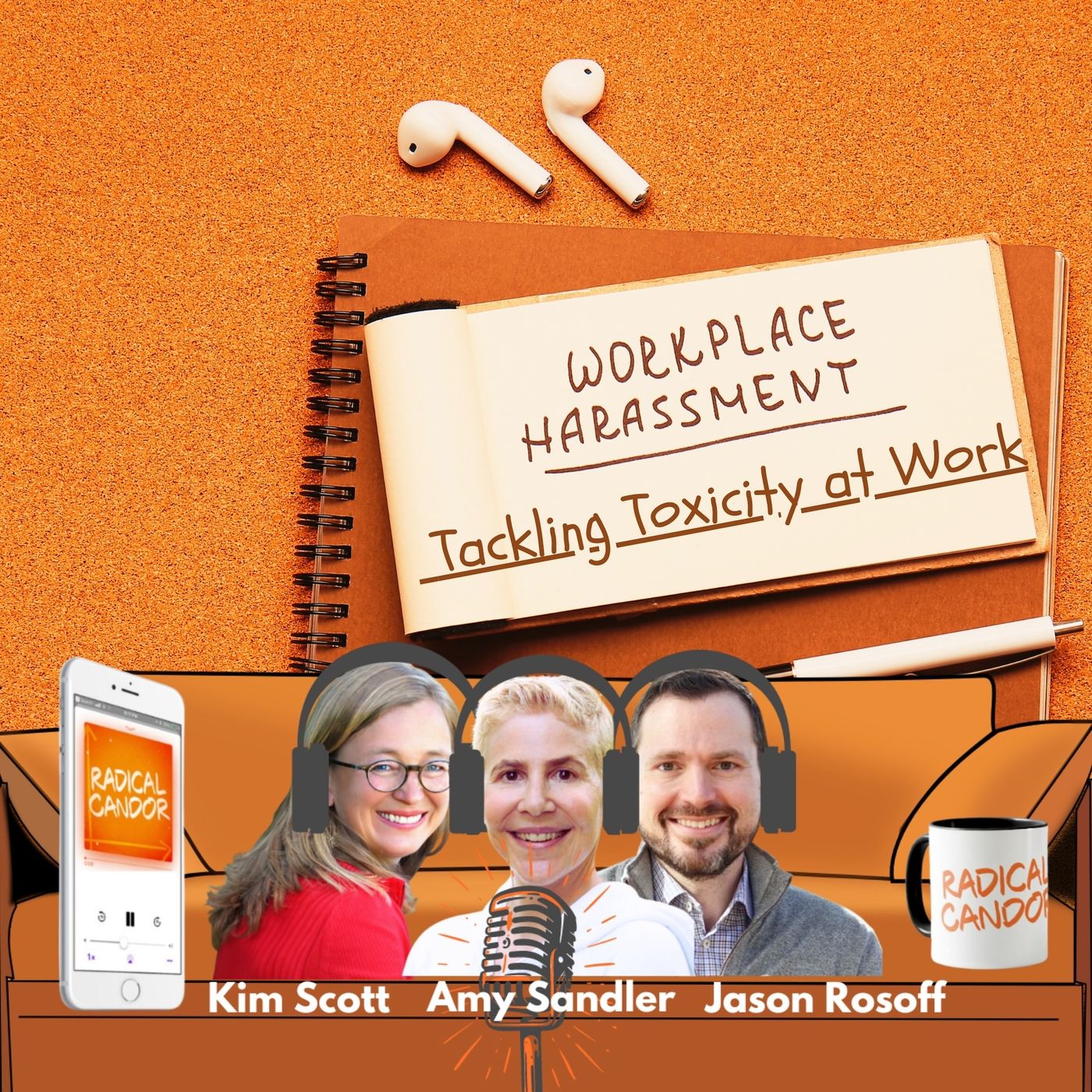
Workplace Harassment: Tackling Toxicity at Work 6 | 30
Handle and prevent workplace bullying and harassment.Kim and Jason tackle a challenging listener question about dealing with severe workplace harassment. They explore the importance of managerial action, share insights on effective documentation, and provide practical advice for identifying supportive work environments during job searches. Personal anecdotes highlight the nuances between bias and bullying, and the hosts emphasize the critical need for creating and enforcing consequences for toxic behavior. Tune in to this episode of Radical Candor for actionable tips on fostering a respectful and safe workplace.Get all of the show notes at RadicalCandor.com/podcast.Episode Links:The No Asshole Rule: Robert Sutton | AmazonWorkplace Bullying: Ignoring Bullies Doesn't Work - Try This Instead | Radical Respect LinkedInReflecting On One Very, Very Strange Year At Uber | Susan FowlerFirstround Review: Tips for Leaders - Code of Conduct | Radical CandorConnect:WebsiteInstagramTikTokLinkedInFacebookXYouTubeChapters:(00:00:00) IntroductionKim and Jason introduce the episode, featuring a listener's story of workplace harassment.(00:02:30) Initial Reactions and Harassee’s EffortsThe severity of the harassment and acknowledgment of the proactive steps already taken.(00:04:46) Analysis of HarassmentAn outline of the harassing behavior and the question of why it was allowed to continue.(00:07:02) The Role of ManagementThe importance of defining and creating consequences for bullying and harassment.(00:09:45) The Impact of Workplace BullyingThe broader impact of unchecked bullying on team dynamics and company culture.(00:15:48) Recognizing and Avoiding Toxic WorkplacesTips on identifying supportive workplaces during job interviews.(00:17:23) The Importance of a Code of ConductThe value of a clear Code of Conduct in preventing and addressing workplace harassment.(00:18:21) Past Experiences with BullyingPersonal anecdotes and differentiating between bias and bullying behavior.(00:21:33) Radical Candor ChecklistActionable tips for both employees and managers to handle and prevent workplace bullying.(00:23:22) ConclusionBecome a supporter of this podcast: https://www.spreaker.com/podcast/radical-candor-communication-at-work--5711404/support.
24:3007/08/2024

Building Better Relationships: The FAQ Finale 6 | 29
Kim, Jason and Amy unite to answer even more FAQs about Radical Candor.In the finale of the Radical Candor FAQs series, together Kim, Jason, and Amy answer a new round of most frequently asked questions about Radical Candor. They explore how Radical Candor operates across different cultures and discuss strategies for managing defensiveness in feedback. Through personal anecdotes and practical advice, they illustrate how to apply Radical Candor both at work and at home. The episode also delves into the importance of building authentic relationships, increasing employee retention, and enhancing team productivity through clear and compassionate communication. Concluding with the handy Radical Candor checklist, this episode is packed with insights to help listeners become better leaders and communicators.Get all of the show notes at RadicalCandor.com/podcast.Episode Links:How To Navigate Feedback Conversations On Diverse Teams | Radical CandorRadical Candor Cultural DifferencesRadical Candor Knows No BoundariesResponding To Negative Feedback: 5 Ways To Disagree | Radical CandorNavigating Emotional Reactions at Work | Radical Candor 2 |16Tacoma Narrows Bridge history - Bridge - Lessons from failureRadical Respect | Amazon BooksApplying Radical Candor To Dysfunctional Family Dynamics | Radical CandorThe Four Horsemen: Criticism, Contempt, Defensiveness, and StonewallingRadical Candor Q&A: Jason Answers Our Most Frequently Asked Questions 6 | 28 Radical Candor Q&A: Kim Answers Our Most Frequently Asked Questions 6 | 27Connect:WebsiteInstagramTikTokLinkedInFacebookXYouTubeChapters:(00:00:00) IntroductionKim, Jason and Amy introduce the episode's topic of Radical Candor FAQs.(00:00:24) Radical Candor in Different CulturesHow Radical Candor varies across cultures and the importance of adjusting communication styles.(00:07:22) Defensive Reactions to FeedbackAdvice for dealing with defensive reactions when giving feedback.(00:09:16) Three Stories of Defensive Reactions Three personal stories illustrating different approaches to handling defensive reactions to feedback.(00:13:32) Managing Emotions and DefensivenessManaging one's own emotions and defensiveness when providing feedback.(00:20:13) Addressing Power DynamicsPower dynamics when dealing with physically or hierarchically intimidating individuals.(00:29:20) Radical Candor at HomeApplying Radical Candor in personal relationships and its benefits at home(00:36:34) Radical Candor as a Communication ModelRadical Candor being not just a feedback model but a comprehensive communication model.(00:38:25) Building Collaborative RelationshipsHow Radical Candor fosters collaboration, improves relationships, and increases employee productivity.(00:44:21) Radical Candor TipsSummary of key tips from the episode for practicing Radical Candor.(00:45:43) ConclusionBecome a supporter of this podcast: https://www.spreaker.com/podcast/radical-candor-communication-at-work--5711404/support.
46:5331/07/2024

Feedback In Multigenerational Workplaces: It's Jason's Turn 6 | 28
Jason's turn being radically candid with the same FAQs from last week's episode.Now it’s Jason’s turn! On this episode of the Radical Candor podcast, Jason tackles the same frequently asked questions about Radical Candor posed to Kim last week. He shares his perspective on defining Radical Candor, addressing its misuse, and handling feedback in various work environments, including remote, hybrid, and multi-generational workplaces. The conversation covers effective communication strategies, building relationships, and maintaining accountability. Jason also discusses navigating toxic work environments and offers rapid-fire answers to common questions. Tune in for a thoughtful exploration of how to apply Radical Candor in different contexts to foster better relationships and clearer communication.Get all of the show notes at RadicalCandor.com/podcast.Episode Links:The Evolution of Email: From DARPA to Daily Overwhelm | LinkedInFrequently Asked Questions About Radical CandorRadical Candor Q&A: Kim Answers Our Most Frequently Asked Questions 6 | 27 App Overload At Work | Radical Candor Podcast 6 | 21How to Practice Radical Candor With Your Boss | Radical Candor Podcast 3 | 10Don't Let A Bad Boss Derail You | Radical Candor Podcast 6 | 18Practicing Radical Candor In Remote Workplaces | Radical Candor Podcast 3 | 7How to Choose a Radically Candid Boss | Radical Candor Podcast 3 | 13Connect:WebsiteInstagramTikTokLinkedInFacebookXYouTubeChapters:(00:00:00) IntroductionJason and Amy introduce the episode, in which Jason answers the same FAQs posed to Kim in the previous episode.(00:01:08) Defining Radical CandorJason’s definition of Radical Candor and how it can differ based on personal interpretation.(00:02:18) Misuse of Radical CandorWhat to do when someone uses Radical Candor as an excuse to act like a jerk.(00:06:53) Challenges in Remote and Hybrid EnvironmentsThe application of Radical Candor in remote and hybrid work settings.(00:12:43) Building RelationshipsTips for building relationships, such as having regular one-on-one conversations outside of the usual work context.(00:15:59) Multi-Generational Workplace DynamicsChallenges and solutions for practicing Radical Candor in a multi-generational workplace.(00:23:03) Accountability and Generational DifferencesClarifying expectations and appreciating different perspectives on work value.(00:26:38) Being Radically Candid with Your BossStrategies for practicing Radical Candor with one's supervisor.(00:29:51) Dealing with Toxic Work CulturesNavigating and transforming toxic workplace environments using the principles of Radical Candor.(00:36:03) Radical Candor TipsA quick recap of key points from the episode in a lightning speed round.(00:38:32) ConclusionBecome a supporter of this podcast: https://www.spreaker.com/podcast/radical-candor-communication-at-work--5711404/support.
39:4924/07/2024

It's Not an Excuse to Act Like a Jerk: Kim Answers Your FAQs 6 | 27
Kim and Amy tackle some radically candid questions.On this episode of the Radical Candor podcast, Kim and Amy answer some of the most frequently asked questions about Radical Candor in a fun and engaging quiz show format. They cover key topics such as handling people who misuse Radical Candor as an excuse to act like a jerk, the challenges and benefits of practicing Radical Candor in remote and hybrid work environments, and navigating generational differences in the workplace. They also provide actionable advice on being radically candid with your boss and dealing with toxic work cultures. Listen in for insightful discussions, practical advice, and a touch of humor as Kim and Amy share their experiences and answer your radically candid questions.Radical Candor FAQsHow to Be Radically Candid With Your BossPracticing Radical Candor In Remote WorkplacesGet all of the show notes at RadicalCandor.com/podcast.Connect:WebsiteInstagramTikTokLinkedInFacebookXYouTubeChapters:(00:00:00) IntroductionKim and Amy introduce the episode, a Q&A style discussion to address frequently asked questions about Radical Candor.(00:02:39) Misuse of Radical CandorHandling situations where Radical Candor is used as an excuse for aggressive behavior.(00:07:04) Impact of Intent and ObservationsDistinguishing between good intentions and bad behavior and how to address observed impacts.(00:10:47) Radical Candor in Remote SettingsThe challenges and adaptations necessary for implementing Radical Candor in remote or hybrid work environments.(00:15:21) Intentionality in CommunicationThe importance of intentional check-ins and maintaining open communication channels in virtual settings.(00:20:51) Radical Candor Across GenerationsApplying Radical Candor in multi-generational workplaces, focusing on mutual respect and understanding.(00:25:36) Candid Conversations with LeadershipApproaching conversations with leaders in a candid manner, especially when resistant to feedback.(00:32:33) Radical Candor TipsA quick recap of key points from the episode in a lightning speed round.(00:33:51) ConclusionBecome a supporter of this podcast: https://www.spreaker.com/podcast/radical-candor-communication-at-work--5711404/support.
35:1817/07/2024

Radical Candor “Asks” Jeff Wetzler: The Foundational Skill of Asking Questions 6 | 26
The fundamental skill of asking questions to solicit feedback and create a culture of Radical Candor.Kim sits down with Jeff Wetzler, author of "Ask: Tap Into the Hidden Wisdom of People Around You for Unexpected Breakthroughs in Leadership and Life." Recorded live, the conversation explores the fundamental skill of asking questions to solicit feedback and create a culture of Radical Candor. Jeff shares insights from his book, discussing the importance of tapping into the knowledge and perspectives of those around us. They delve into the five practices of “The Ask Approach" and reflect on audience questions, offering valuable takeaways for leaders and individuals alike. Tune in to learn how to transform your communication and leadership through the power of asking questions.Get all of the show notes at RadicalCandor.com/podcast.Episode Links:Jeff Wetzler: LinkedInAsk | Jeff Wetzler Radical Candor Coffee Break: Exploring The Ask Approach YouTubeConnect:WebsiteInstagramTikTokLinkedInFacebookXYouTubeChapters:(00:00:00) IntroductionAmy introduces a conversation between Kim and Jeff Wetzler, founder of “The Ask Approach” and author of “Ask.”(00:01:01) Jeff's Book "Ask"Jeff explains the premise of his book and the importance of tapping into the hidden wisdom of those around us.(00:02:50) The Desire to Read MindsThe common desire to read minds and how asking questions effectively achieves this.(00:04:00) Misinterpretations and FeedbackThe challenges of interpreting facial expressions and the importance of asking directly.(00:05:08) Ruinous EmpathyThe concept of ruinous empathy and the reasons people withhold valuable feedback.(00:08:14) The Importance of Commitment ConversationsThe need for clear commitment conversations in management and leadership.(00:11:11) The Certainty LoopThe concept of the certainty loop, and how assumptions shape perceptions and limit curiosity.(00:13:01) Expanding the Repertoire of QuestionsThe need for a variety of questions to uncover deeper insights and perspectives.(00:14:30) Strategies for Quality QuestionsStrategies for posing quality questions and highlights the importance of soliciting feedback.(00:17:28) Inviting Critical FeedbackThe importance of explicitly inviting critical feedback and how to respond to it constructively.(00:19:22) Checking for UnderstandingBetter ways to check for understanding without sounding patronizing.(00:23:04) Handling Emotional ResponsesThe value of curiosity in handling emotional responses and moving towards Radical Candor.(00:25:32) Listening to LearnThe concept of listening to learn, focusing on content, emotion, and action.(00:28:04) Choosing CuriosityCuriosity as a choice and foundational step in the ASK approach, which focuses on learning from others.(00:29:44) Making It SafeStrategies to make it safe for others to share their thoughts and the role of psychological safety.(00:33:40) Pose Quality QuestionsDifferentiating between clumsy and quality questions, and asking questions that seek to understand others genuinely.(00:39:04) Listen to LearnListening effectively not just for content, but also the emotion and action in the words.(00:40:37) Reflect and ReconnectReflecting on feedback and reconnecting with the person who provided it to ensure clarity and appreciation.(00:43:32) ConclusionBecome a supporter of this podcast: https://www.spreaker.com/podcast/radical-candor-communication-at-work--5711404/support.
44:5810/07/2024
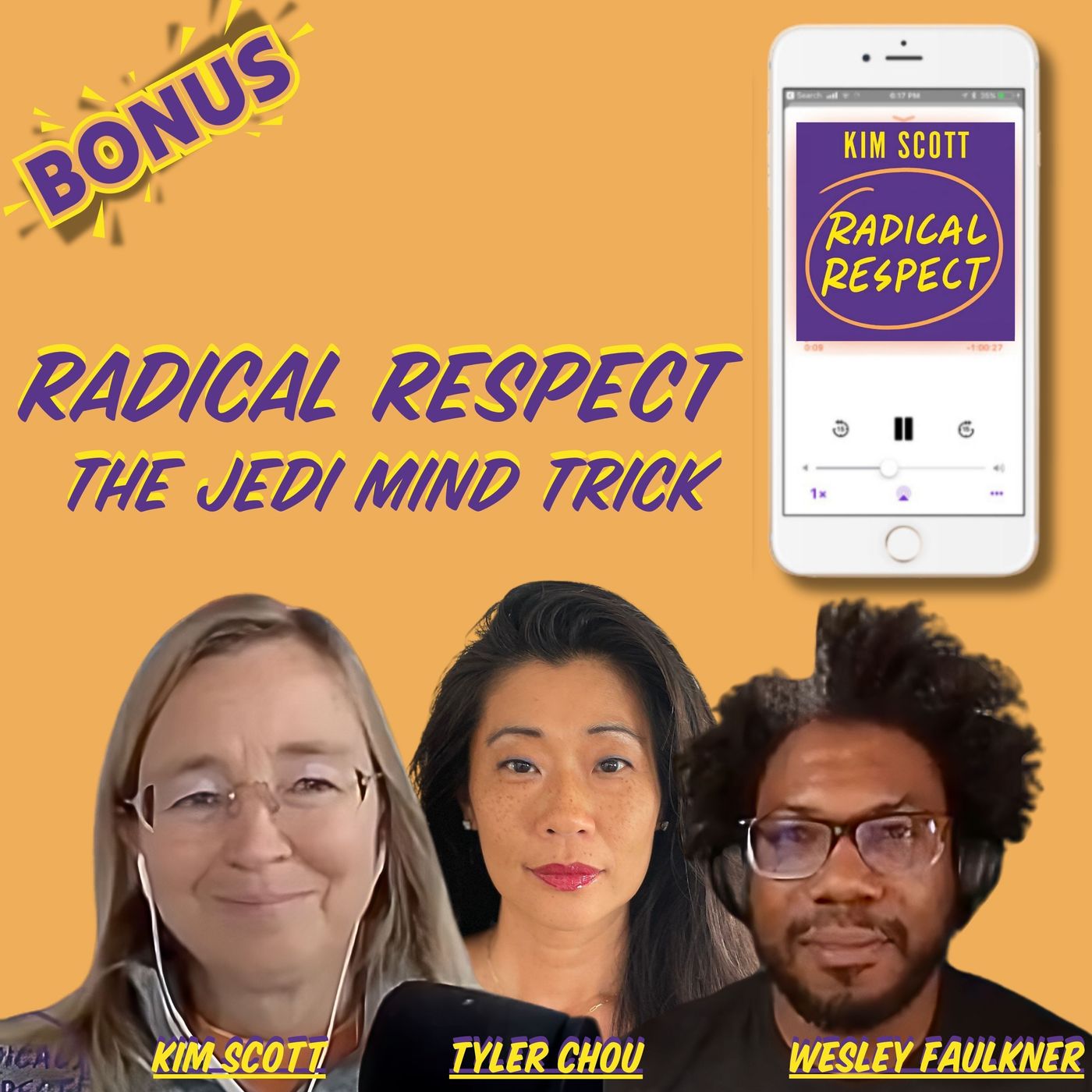
Radical Respect: The Jedi Mind Trick 6 | Bonus
This week Radical Candor shares an episode of Radical Respect, where Kim and co-host Wesley Faulkner discuss the dreaded bloviating BSer with guest Tyler Chou, The Creators' Attorney.Failing to call people on their BS breeds problematic overconfidence that can harm collaboration and team confidence, especially among team members who are systematically disadvantaged. In this episode, Kim and Wesley discuss bloviating BS with Hollywood attorney Tyler Chou, who shared her experience working under a boss with no entertainment experience but strong connections in the industry. Even though she was more knowledgeable, his BS made her feel gaslit and afraid to speak up.Tyler Chou has been a Hollywood attorney for the last 15 years. Having worked in VP and SVP roles at companies like Disney, Skydance, BuzzFeed and Open Road Films. As well as large law firms. Tyler has been the lead attorney on 16 feature films including Saving Mr. Banks and Cinderella. She has some battle stories to share about how brutal it is to work as an Asian woman in a white, man dominated industry.Now, Tyler is the Founder & CEO of Tyler Chou Law for Creators and her life’s mission is to protect creators. She’s deeply passionate about helping young creators with millions of subs grow their businesses to 6-7 figures and functions as a fractional COO and GC. She is a thought leader who discusses the intersection of Hollywood and digital media and believes YouTube is the new Hollywood.A year ago Tyler started her own YouTube channel as a creative challenge and has been blown away by how quickly her channel has grown. Her channel focuses on creators, helping them build out their businessesGet all of the show notes at RadicalCandor.com/podcast.Episode Links:Tyler Chou: The Creators' Attorney | YouTube The Creator's Attorney | Linktree Original Episode: Radical Respect S3 | Ep1 - The Jedi Mind Trick Website / YouTubeConnect:WebsiteInstagramTikTokLinkedInFacebookXYouTubeChapters:(00:00:00) IntroductionKim and co-host Wesley introduce guest Tyler Chou, The Creators' Attorney.(00:01:17) Creators' Attorney ExplainedTyler discusses her focus on YouTube creators and the legal challenges they face.(00:02:10) Media Challenges and SolutionsThe legal needs of creators and Tyler's personal journey to YouTube content creation.(00:05:36) Workplace Dynamics and BSExamination of 'bloviating BS', its impact on workplace dynamics, and systemic issues.(00:08:27) Experiences with Bloviating BSPersonal experiences with bloviating BS in professional and personal life, reflecting on the challenges and impacts.(00:13:51) Hollywood's Broken SystemThe systemic issues in Hollywood, including nepotism and gaslighting by bosses.(00:17:35) Speaking Up and Taking ActionThe difficulties and importance of speaking up against BS, especially for women and marginalized groups.(00:24:00) Tyler's Hollywood ExperienceTyler elaborates on her challenging experiences in Hollywood, including job insecurity and gaslighting.(00:26:36) Transition to the Creator EconomyTransition to the creator economy, the growth of the law firm, and the importance of protecting creators legally.(00:31:07) Hiring and Work CultureTyler talks about her hiring philosophy and ensuring a positive work culture in her law firm.(00:35:44) Explicit Agreements in the WorkplaceThe importance of making implicit agreements explicit in professional relationships and contracts.(00:37:27) Contact InformationHow listeners can reach Tyler for legal advice and support in the creator economy.(00:38:58) ConclusionBecome a supporter of this podcast: https://www.spreaker.com/podcast/radical-candor-communication-at-work--5711404/support.
40:3003/07/2024
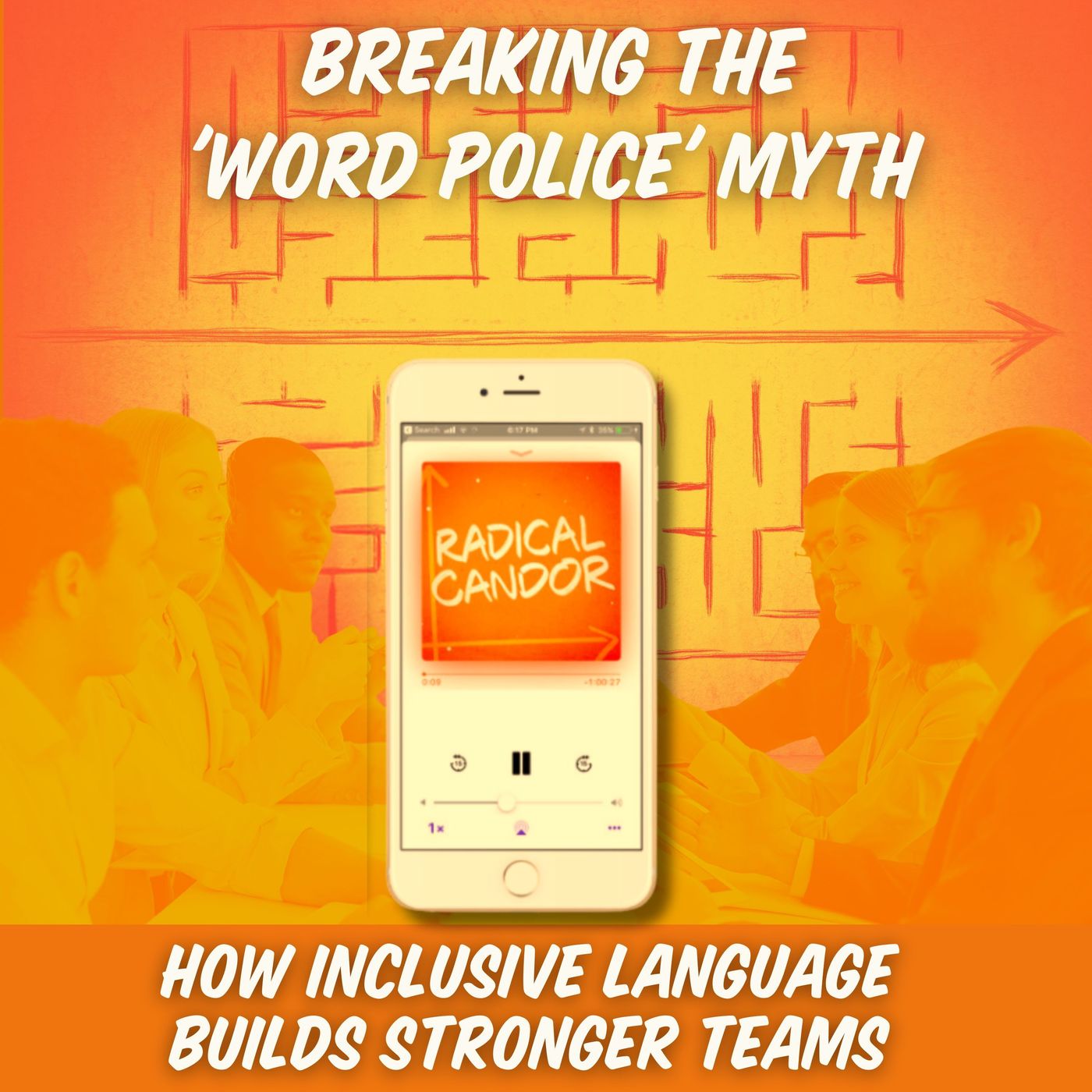
Breaking the 'Word Police' Myth: How Inclusive Language Builds Stronger Teams 6 | 25
The ROI of changing language to be more inclusive.Kim, Jason, and Amy discuss the importance of using inclusive language and the impact of non-inclusive language, often dismissed as being "too sensitive.” They explore the concept of "red words," terms that can shut down communication by triggering negative reactions, and emphasize that good communication is measured by its impact on the listener. They share personal anecdotes illustrating how specific words can cause offense and stress the importance of being mindful of the language used to foster an environment of mutual respect and understanding. The episode also delves into the resistance some people have to changing their language and how acknowledging and adapting to others' sensitivities can significantly improve communication and relationships.Get all of the show notes at RadicalCandor.com/podcast.Episode Links:The Word Police: Have We Become Too Sensitive? | Radical Respect Newsletter Beyond 'Sorry': How to Apologize and Mean It 6 | 22 | Radical Candor Connect:WebsiteInstagramTikTokLinkedInFacebookXYouTubeChapters:(00:00:00) IntroductionKim, Jason and Amy introduce the episode, a discussion on the impact of non-inclusive language.(00:0:33) The Impact of 'Red Words'The concept of "red words," phrases that trigger negative reactions and shut down communication.(00:04:32) The Effect of WordsHow certain words can create different responses and understanding these reactions.(00:07:19) Addressing Non-Inclusive Language in EmailsNon-inclusive language in emails and how it can be handled to avoid excluding team members.(00:08:59) Handling Public Criticism and CorrectionA story about receiving feedback on social media, and the importance of accepting corrections publicly.(00:11:18) ROI of Inclusive LanguageThe ROI of changing language to be more inclusive.(00:14:58) Overcoming Resistance and Acknowledging BiasWhy some people resist changing their language, and acknowledging and addressing biases.(00:17:46) Current Relevance of Biased LanguageCurrent issues with language in society, emphasizing the need to avoid perpetuating harmful behaviors.(00:20:47) The Impact of Words on RelationshipsThe role of words in building respectful environments and how using the right language can enhance relationships.(00:26:19) Apologizing for Language MistakesHow to handle mistakes in language use, and the importance of being open to reminders and corrections.(00:29:38) Issues with Traditional TitlesWhy certain terms can be problematic due to their prescriptive and exclusionary nature.(00:32:01) Radical Candor TipsPractical tips for implementing Radical Candor, including owning mistakes and responding with curiosity to feedback.(00:34:57) ConclusionBecome a supporter of this podcast: https://www.spreaker.com/podcast/radical-candor-communication-at-work--5711404/support.
37:1826/06/2024
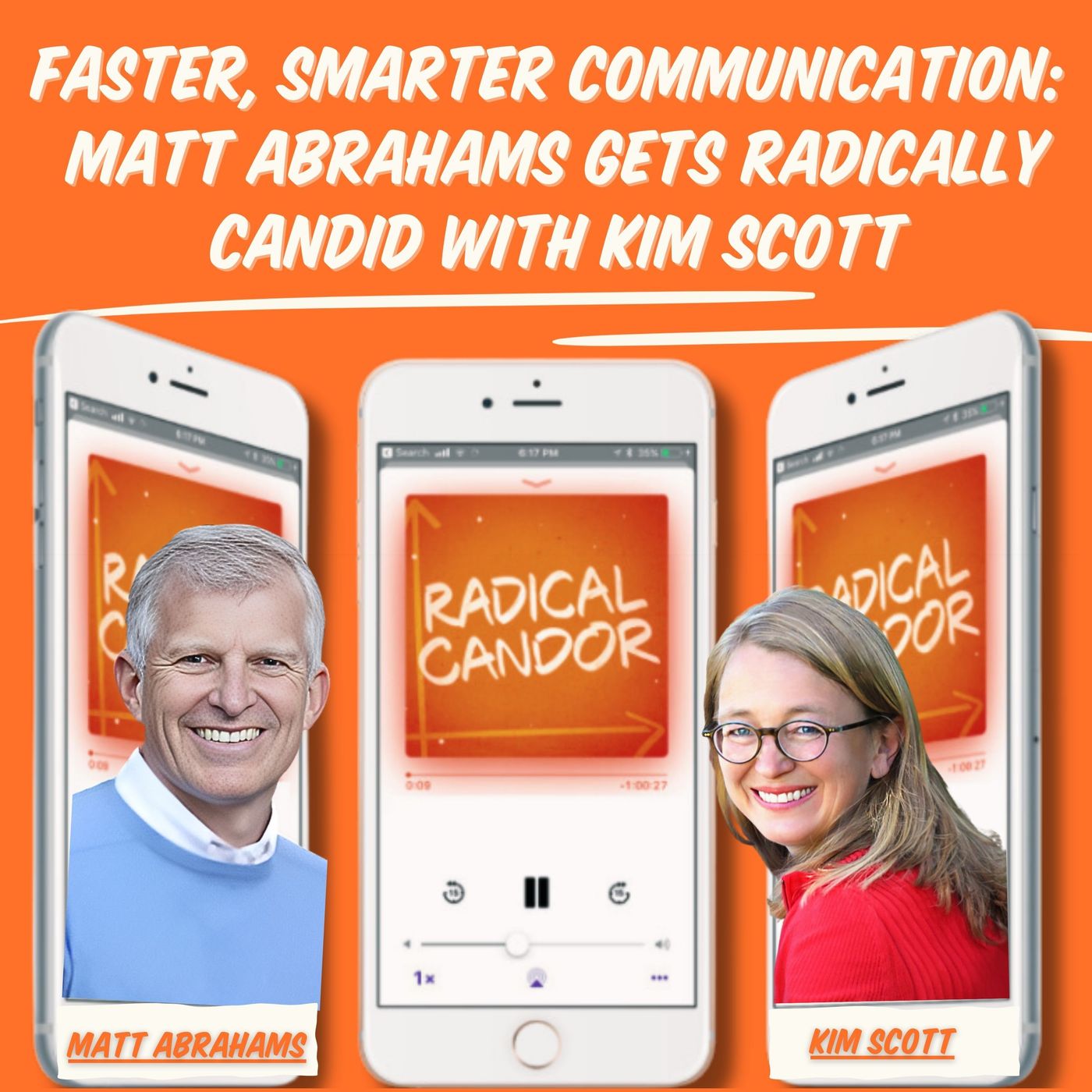
Faster, Smarter Communication: Matt Abrahams Gets Radically Candid 6 | 24
Thinking quickly and communicating effectively with Matt Abrahams.On this episode of the Radical Candor podcast, Kim Scott interviews Matt Abrahams, a Stanford lecturer and author of "Think Faster, Talk Smarter." Matt explains how his book is geared toward everyone, from introverts to extroverts, and provides advice for handling impromptu speaking situations. They also address workplace dilemmas, such as navigating feedback in fast-paced environments and managing team dynamics where quick problem solvers are favored. The episode emphasizes the importance of clear, concise communication and the value of diverse thinking styles in enhancing team performance.Get all of the show notes at RadicalCandor.com/podcast.Episode Links:Matt Abrahams Think Faster, Talk Smarter | Matt Abrahams Think Fast, Talk Smart: The Podcast | Stanford Graduate School of Business Matt Abrahams | Stanford GSB ProfileElevating Introverts At Work | Radical Candor Podcast The Feedback Loop | Radical Candor Yes, And | Kelly Leonard STFU | Dan Lyons Improv Wisdom | Patricia Ryan Madson PoisedConnect:WebsiteInstagramTikTokLinkedInFacebookXYouTubeChapters:(00:00:00) IntroductionHost Amy introduces the episode, a conversation between Kim Scott and Matt Abrahams, an expert in communication and lecturer at Stanford GSB(00:00:59) Misunderstanding Radical CandorClarifying misunderstandings related to the books "Radical Candor" and "Think Faster, Talk Smarter." (00:02:20) Addressing Workplace DilemmasAnalysis of a listener-submitted workplace dilemma and strategies for effective communication in fast-paced work environments.(00:07:20) Strategies for Introverts in MeetingsAdvice for introverts to contribute effectively in meetings, including listening actively and summarizing.(00:09:48) Handling Spontaneous Speaking SituationsHow to handle spontaneous speaking situations and turning challenging questions into opportunities.(00:15:46) Addressing Unpreparedness and Difficult QuestionsStrategies for admitting unpreparedness and effectively managing difficult questions.(00:18:07) Next Level FeedbackProviding actionable feedback to help individuals develop executive presence.(00:21:40) Managing Anxiety in CommunicationTechniques to manage anxiety and handle situations when one blanks out during communication.(00:28:30) Silence and Active ListeningHandling situations where the audience or colleagues are not actively listening.(00:30:55) Addressing Bloviating BSersHow to deal with individuals who dominate conversations.(00:38:17) Value of Improvisation in CommunicationThe benefits of improvisation classes for enhancing communication skills.(00:40:27) Interrupting and Being InterruptedBalancing the need to interrupt with maintaining respectful communication.(00:44:31) Supporting Non-Native English SpeakersAdvice for non-native English speakers to improve their communication.(00:48:03) ConclusionBecome a supporter of this podcast: https://www.spreaker.com/podcast/radical-candor-communication-at-work--5711404/support.
49:4219/06/2024

The CORE of Radical Candor: A Deep Dive into Effective Feedback 6 | 23
Transform feedback into a powerful tool using CORE.Jason and Amy discuss the nuanced art of feedback using the CORE model—Context, Observation, Result, and nExt stEps, explaining how it can transform feedback into a powerful tool for growth and clarity. Whether it’s navigating simple day-to-day acknowledgments or tackling complex, emotionally charged feedback scenarios, they provide actionable strategies that can be immediately applied at work. This episode delves not only into the mechanics of CORE, but also how to implement it to foster a culture of open, productive dialogue and promote continuous development.Get all of the show notes at RadicalCandor.com/podcast.Episode Links:How To Give Feedback Using The CORE Method | Radical CandorConnect:WebsiteInstagramTikTokLinkedInFacebookXYouTubeChapters:(00:00:00) IntroductionHosts Jason Rosoff and Amy Sandler introduce the episode’s focus on feedback, particularly exploring the CORE model.(00:01:07) The CORE Model ExplainedAn outline of the CORE model, emphasizing its importance in structuring feedback and improving communication clarity.(00:02:16) Preparing for Feedback ConversationsThe value of thinking through feedback before conversations using the CORE model, and the need for flexibility in discussions.(00:04:08) Examples of CORE in Practice - PraiseExamples of using the CORE model for giving praise, including a quarterly budget review meeting scenario.(00:08:09) Examples of CORE in Practice - CriticismHow to use CORE for criticism, detailing potential challenges and how to stay supportive and collaborative.(00:13:29) Checking for Alignment and UnderstandingChecking for alignment and understanding during feedback conversations, ensuring both parties are on the same page.(00:17:56) Real-World Example of MiscommunicationA personal experience of miscommunication with a peer manager and how using the CORE model would have improved it.(00:22:12) Empathy and Collaboration in FeedbackThe importance of empathy and understanding the other person's perspective before giving feedback, enhancing collaboration.(00:25:44) Addressing Complex Feedback ScenariosHandling complex feedback situations and the need for ongoing conversations and incremental next steps.(00:29:10) Radical Candor TipsA checklist of tips to implement Radical Candor, emphasizing the CORE model, checking for alignment, and encouraging collaboration(00:31:21) ConclusionBecome a supporter of this podcast: https://www.spreaker.com/podcast/radical-candor-communication-at-work--5711404/support.
33:1712/06/2024
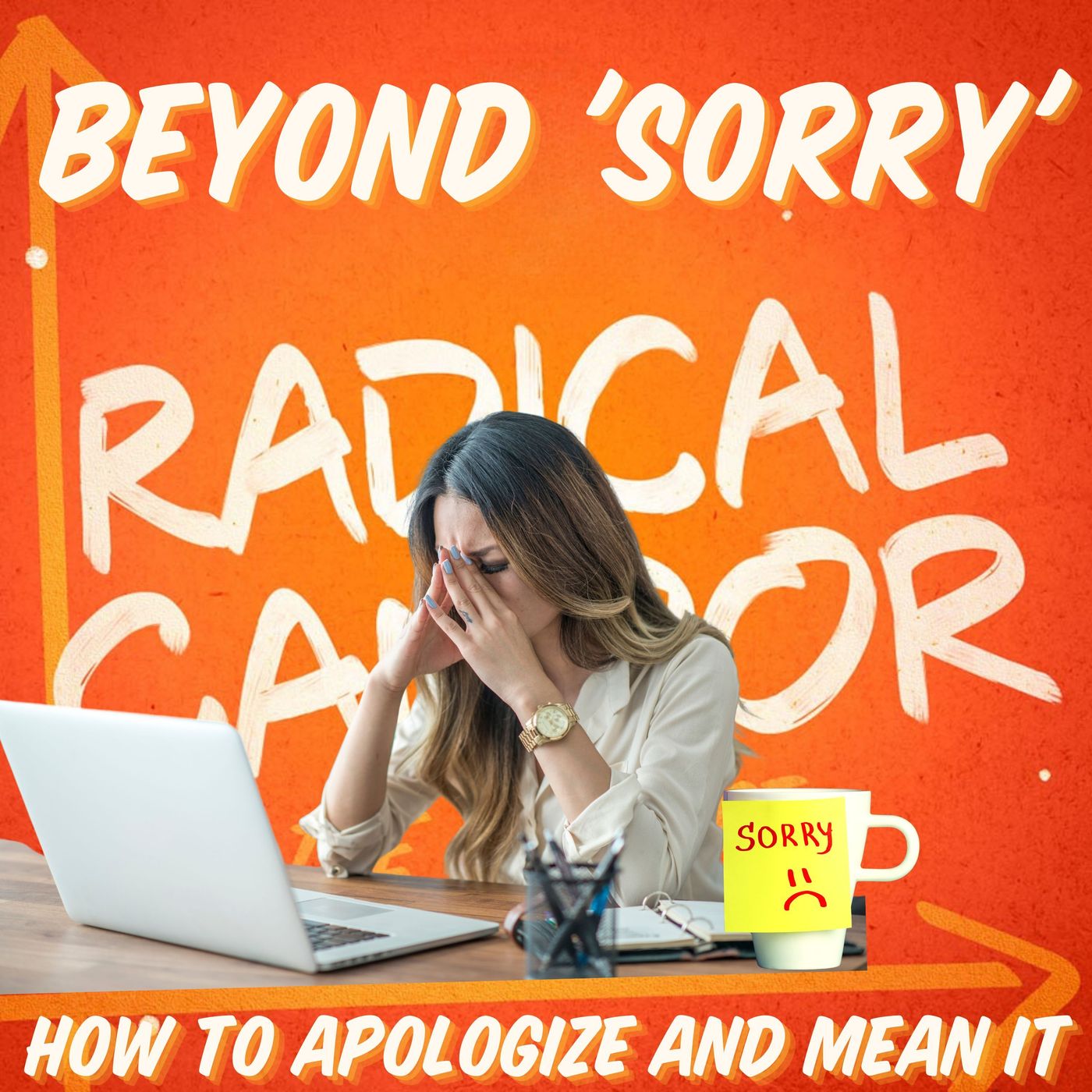
Beyond 'Sorry': How to Apologize and Mean It 6 | 22
Making amends and fostering better communicationKim, Jason, and Amy dive into the complexities of apologies, focusing on the difference between genuine regret and false apologies. Through role-play and insightful analysis, they explore common pitfalls such as deflecting blame, making excuses, and failing to acknowledge the impact of one’s actions. They emphasize the importance of sincere apologies and provide actionable tips for making amends and fostering better communication in the workplace. Tune in to learn how to transform “I’m sorry” from hollow words into meaningful actions.Get all of the show notes at RadicalCandor.com/podcast.Episode Links:Fake Apologies Are on the Rise | The AtlanticHow to Apologize Like You Mean It | The New York TimesThe Power of Apologies | Harvard UniversityThe Art of a Heartfelt Apology | Harvard University5 Ways to Recognize and Respond to an Insincere Apology | PsychCentralThe Narcissist's Prayer | The Life DoctorOn Repentance and Repair | Danya RuttenbergHow To Encourage Feedback Between Others In The Workplace | Radical CandorFried Green Tomatoes Movie Clip: Parking Lot Rage | YouTubeConnect:WebsiteInstagramTikTokLinkedInFacebookXYouTubeChapters:(00:00:00) IntroductionKim, Jason, and Amy introduce the episode on the importance of knowing how to apologize and explore false apologies.(00:01:21) Role Play: "Sorry, Not Sorry" Sam vs. Patient PamA role play exercise to highlight common false apologies.(00:04:28) Breakdown of False ApologiesThe hosts analyze the role play, explaining why statements like "I'm an asshole" and "I was just kidding" are problematic.(00:11:13) The Power of Humor and ApologyThe role of humor in apologies, the impact of power dynamics, and why humor should never "kick down."(00:13:13) The Narcissist's PrayerIntroduction to the Narcissist's Prayer, a pattern of defensive behavior.(00:14:52) Structuring a Genuine ApologyAnalysis of what constitutes a meaningful and effective apology, and insights on making amends and acknowledging mistakes.(00:19:39) The Five A's of ApologizingThe five A's of a sincere apology based on Maimonides' principles.(00:28:38) Apology as an Ongoing ProcessThe need for ongoing change after an apology and the challenges of altering long-standing habits.(00:30:16) A Powerful Example of ApologyA poignant example of a sincere apology from a troll to Lindy West, highlighting the components of a good apology.(00:33:06) Radical Candor TipsTips for a thoughtful apology process, emphasizing the importance of sincerity and accountability.(00:34:54) ConclusionBecome a supporter of this podcast: https://www.spreaker.com/podcast/radical-candor-communication-at-work--5711404/support.
36:0205/06/2024
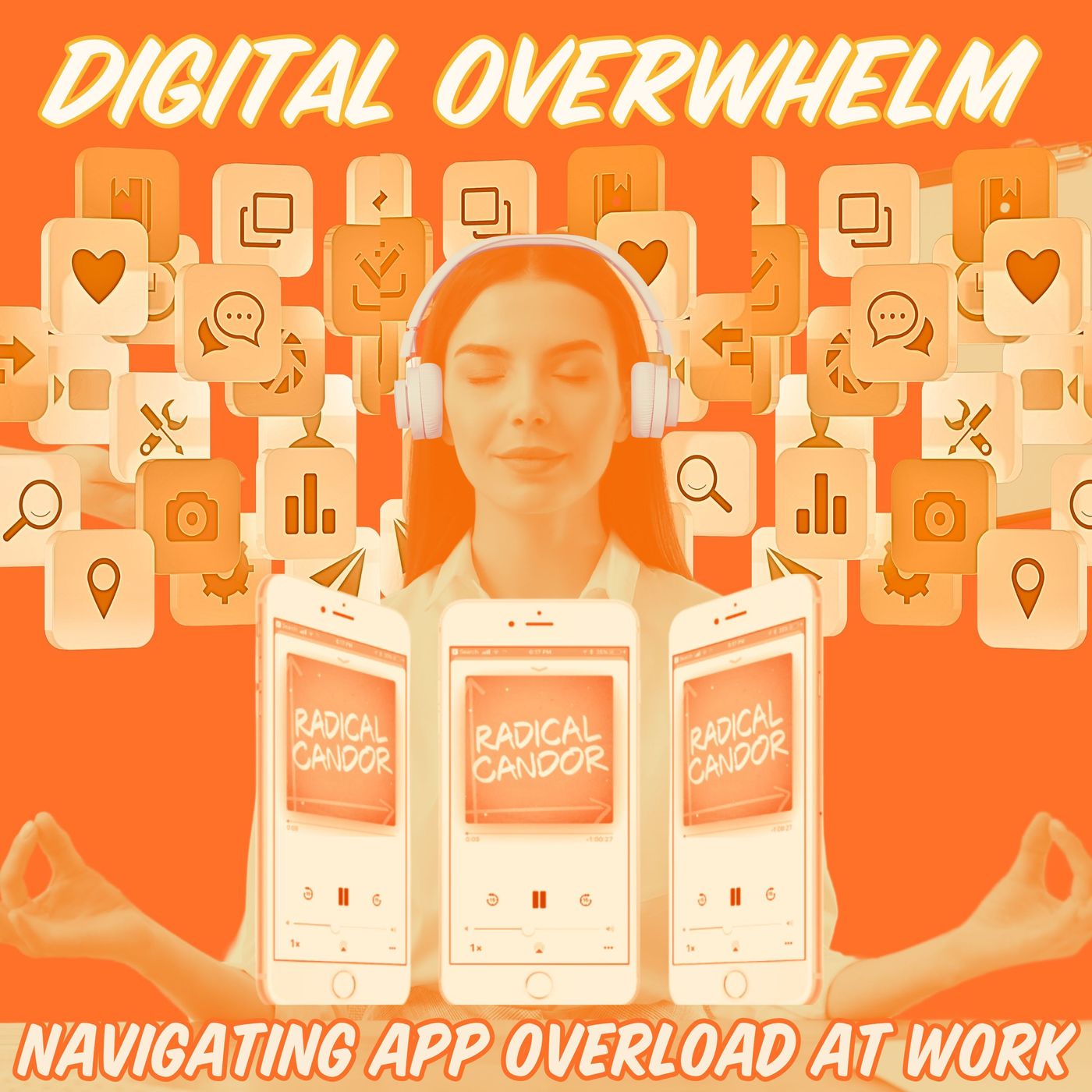
Digital Overwhelm: Navigating App Overload at Work 6 | 21
The impact of app overload at work and strategies to manage communication tools effectively.Unpack the complexities of digital communication in the workplace with Jason and Amy on this episode of the Radical Candor Podcast. They dissect the overwhelming world of app overload, highlighting how the excessive use of communication tools diminishes productivity and increases stress. Listen as they provide historical insights, discuss the enduring necessity of email, and offer actionable strategies for setting effective communication norms to streamline workflows and enhance team dynamics.Get all of the show notes at RadicalCandor.com/podcast.Episode Links:The State of Workplace Communication 2024 | Forbes Business AdvisorApp Fatigue: How Too Many Apps Are Hurting Productivity | LinkedInToo Many Collaboration Apps Are Bogging Employees Down | ReworkedHow Much Time and Energy Do We Waste Toggling Between Applications? | HBRThink Time: 6 Ways To Leverage This Untapped Tool | Radical CandorBusiness Casualty | TikTokThe New Most Dreaded Word at Work: ‘Hey’ | WSJConnect:WebsiteInstagramTikTokLinkedInFacebookXYouTubeChapters:(00:00:00) IntroductionJason Rosoff and Amy Sandler introduce the episode and the topic of app overload at work.(00:02:16) The History of Email and Communication ToolsThe history of email, its evolution since the 1980s, and how it has influenced workplace communication.(00:05:01) The Shift in Administrative RolesHow the rise of email reduced the need for administrative assistants and changed project and work management practices.(00:07:21) The Rise of Chat ToolsFrom early chat tools like Skype and AOL Messenger to modern tools like Slack, and their role in workplace communication.(00:09:55) Integrating Tools at Radical CandorHow Radical Candor integrates various communication tools and the norms established to manage them effectively.(0013:12) The Importance of Setting Communication NormsEstablishing clear norms for email and Slack use to ensure effective and less stressful communication.(00:15:14) Personal Preferences vs. Team NormsBalancing individual communication preferences with team-wide norms and the importance of having clear guidelines.(00:18:18) Establishing Clear GuidelinesAdvice for teams to establish clear communication guidelines and norms to reduce app overload.(00:30:21) Managing NotificationsThe importance of managing and turning off notifications to maintain focus and productivity during work hours.(00:35:11) Handling External CommunicationStrategies for managing communication with clients and external partners while maintaining internal communication norms.(00:38:29) Radical Candor TipsPractical tips to start applying Radical Candor in managing communication tools and reducing app overload. (00:41:21) ConclusionBecome a supporter of this podcast: https://www.spreaker.com/podcast/radical-candor-communication-at-work--5711404/support.
42:3829/05/2024
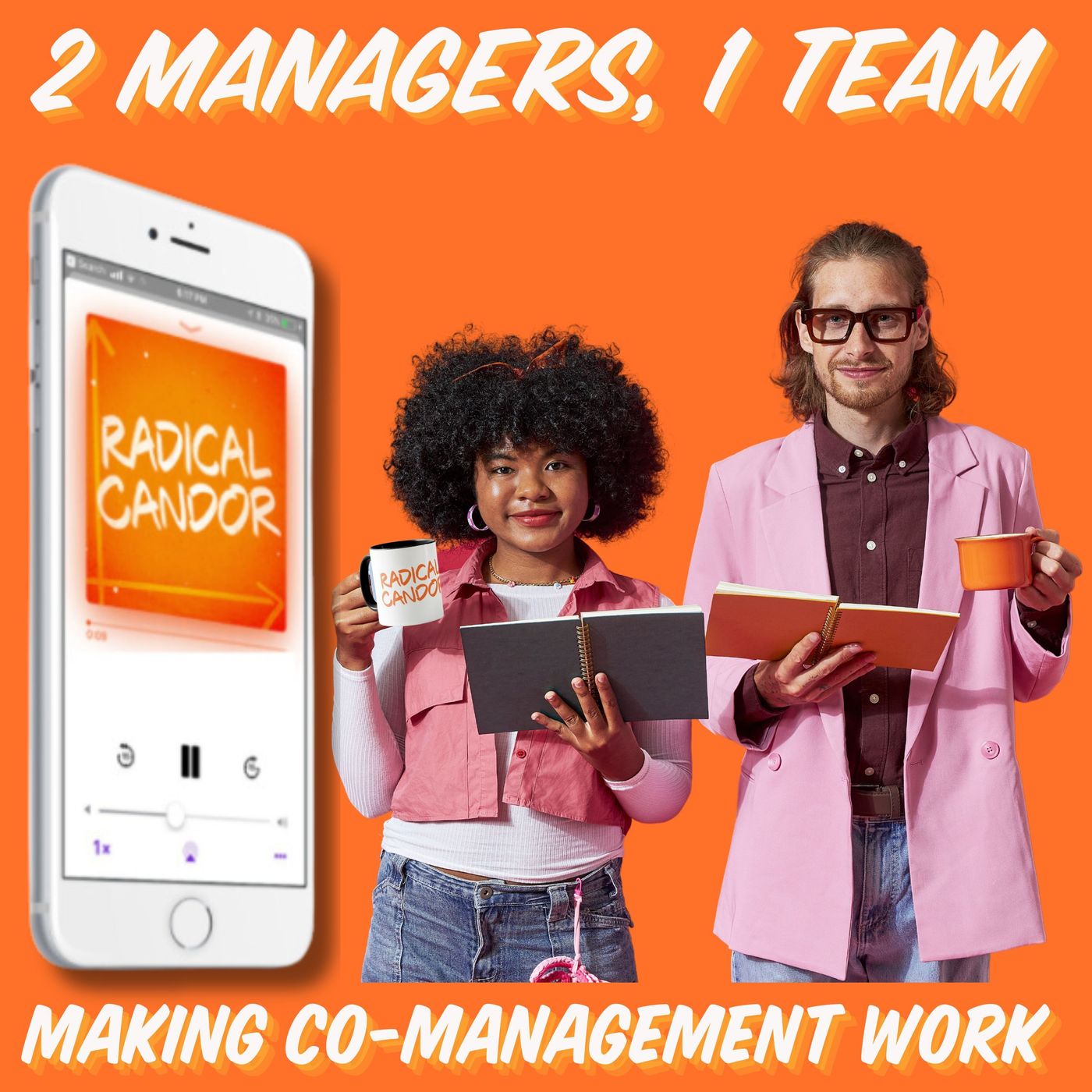
Two Managers, One Team: Making Co-Management Work 6 | 20
Strategies for aligning co-managers to foster a cohesive and productive environment. Kim, Jason, and Amy address a listener's question about the challenges of implementing Radical Candor within a co-managed team. They dive into how differing management styles can impact team dynamics and explore strategies for aligning co-managers to foster a cohesive and productive environment. The discussion includes a role-play session illustrating potential conflicts and resolutions, providing listeners with practical advice on maintaining effective communication and respect between managers with contrasting approaches. Tune in to learn how to navigate the complexities of co-management while upholding the core principles of Radical Candor.Get all of the show notes at RadicalCandor.com/podcast.Episode Links:The Importance Of Performance Development Conversations | Radical CandorHow To Give Fast, Meaningful Feedback | Radical CandorHow To Create A Culture Of Feedback | Radical CandorHow To Encourage Feedback Between Others In The Workplace | Radical CandorHow To Improve Communication In The Workplace In 6 Steps | Radical CandorHow to Get and Give Feedback Using the Radical Candor Order of OperationsGiving Bad News Early Has Benefits For Relationships At WorkResponding To Negative Feedback: 5 Ways To Disagree | Radical CandorHow To Give Feedback Using The CORE Method | Radical CandorConnect:WebsiteInstagramTikTokLinkedInFacebookXYouTubeChapters:(00:00:00) IntroductionHosts Kim Scott, Amy Sandler and Jason Rosoff outline a listener’s question about implementing Radical Candor in a co-managed team.(00:02:02) Understanding the Listener's ChallengeThe complexities of co-managing a team with different management styles and the potential issues that arise when only one manager practices Radical Candor.(00:05:40) Co-Management and Radical CandorThe implications of having differing management approaches and the importance of clear reporting lines.(00:10:18) Role Play - Addressing the IssueJason and Kim role-play a conversation between two co-managers to model how to address the issue of differing management styles.(00:18:47) Debriefing the Role PlayHosts discuss the role play, highlighting key moments and strategies for effectively managing co-manager dynamics and ensuring a unified approach.(00:22:40) Order of Operations for Radical CandorThe Radical Candor order of operations: soliciting feedback, giving praise, and offering criticism, and the importance of humility and mutual respect.(00:25:34) Feedback Debt and Team NormsThe concept of feedback debt and the importance of establishing clear team norms, particularly in co-managed environments.(00:33:44) Radical Candor TipsRadical Candor tips for co-managers to follow to improve their collaborative management approach.(00:35:31) ConclusionBecome a supporter of this podcast: https://www.spreaker.com/podcast/radical-candor-communication-at-work--5711404/support.
36:5922/05/2024

Radical Decisions: Cutting Through Career Chaos 6 | 19
Choice overload and how it affects our ability to make satisfying career choices.Join Kim Scott and Amy Sandler to delve deep into the concept of choice overload, a common trap for many facing career decisions. They define choice overload and how it affects our ability to make satisfying career choices. Throughout the episode, they use personal anecdotes and theoretical insights to illustrate the struggles and strategies related to decision-making in the face of overwhelming options.The discussion evolves as they explore the roles of maximizers and satisficers—two distinct decision-making styles that influence how we approach our career paths. Kim and Amy discuss the advantages and challenges of each style, providing listeners with the tools to better understand their preferences.They conclude with practical advice for anyone struggling to make career decisions, emphasizing the importance of balancing ambition with personal happiness and the need to adapt as one's career evolves. This episode is a must-listen for anyone who feels stuck at a career crossroads or overwhelmed by the multitude of paths available.Get all of the show notes at RadicalCandor.com/podcast.Episode links:Radical Candor S3 Ep 9: The Problem With PassionYou Don't Have To Be Passionate About Your Job | Radical CandorConnect:WebsiteInstagramTikTokLinkedInFacebookXYouTubeChapters:(00:00:00) IntroductionHosts Kim Scott and Amy Sandler introduce the episode's theme of career choice overload(00:01:11) The Burden of Abundant ChoicesPersonal experiences of having too many choices, illustrated by the story of "Balaam's Ass."(00:03:18) Maximizers vs. SatisficersDifferent decision-making styles: maximizers who seek the best possible outcome and satisficers who settle for good enough.(00:10:16) Balancing Personal and Professional LifeFinding a balance between career aspirations and personal happiness, focusing on enjoying the process rather than fixating on specific outcomes.(00:15:17) The Role of Advice in Career DecisionsThe influence of career advice and the sometimes unhelpful stereotypes and expectations.(00:17:51) The Importance of Prioritizing Desires and InterestsIdentifying and pursuing one's passions and how they drive career choices and the importance of taking small steps and exploring various interests(00:24:50) Practical Approaches to Career ChoicesHosts engage in exercises to envision different life scenarios based on varying career and personal goals.(00:37:55) Philosophies of Wealth and HappinessComparing desire and income, and how they contribute to a sense of wealth and contentment.(00:44:55) Radical Candor TipsKey lessons from the episode with actionable tips on overcoming decision paralysis in careers.(00:45:46) ConclusionBecome a supporter of this podcast: https://www.spreaker.com/podcast/radical-candor-communication-at-work--5711404/support.
46:5415/05/2024

Don't Let a Bad Boss Derail You: A Guide to Thriving 6 | 18
Understand and navigate the murky waters of toxic management.Hosts Kim Scott, Jason Rosoff, and Amy Sandler delve into the detrimental impact abusive bosses can have on career trajectories. The hosts explore how such leadership styles can suppress assertiveness and hinder professional progression, especially contrasting the experiences of those in superstar and rockstar modes. With insights from the latest studies and rich personal narratives, this episode equips listeners with the tools to understand and navigate the murky waters of toxic management, aiming to empower individuals to protect and advance their careers despite challenging leadership.Episode Links:Episode show notes and resourcesPsychological Abuse & Destructive Leadership Leaving CNN Was How Brooke Baldwin Found Her Voice Do You Want to be a Great Leader? Embrace Neurodiversity Why You Should Embrace A Speak-Truth-To-Power Culture Here’s How Speak-Truth-To-Power Meetings Can Make Your Workplace More Equitable S4 Ep.1 Rock Star Mode Versus Superstar Mode Website / YouTube S4 Ep.14 Quiet Quitting Speaks Loudly About Bad Bosses Website / YouTubeRadical Respect: How to Work Together BetterConnect:Website Instagram TikTok LinkedIn Facebook X YouTubeChapters:(00:00:00) IntroductionHosts Kim Scott, Jason Rosoff, and Amy Sandler introduce the episode’s topic of the impact of bad bosses.(00:00:31) Defining Superstar and Rockstar ModesThe differences between "superstar mode" and "rockstar mode" in career trajectories and how these relate to personal and professional growth.(00:03:16) The Impact of Abusive LeadershipHow abusive leadership affects employees differently based on their career trajectories.(00:06:59) Personal Experiences and Broader ImplicationsA personal story about dealing with inappropriate comments from a boss and the broader implications of not challenging abusive behavior.(00:10:41) Discussion on Greed vs. Strategic Choices in CareerMotivations behind employee reactions to bad bosses and how these reflect responses to abusive environments.(00:15:21) Systemic Issues and Personal AgencySystemic problems of destructive leadership and personal agency within toxic work environments.(00:19:14) Strategies for Dealing with Abusive BossesPractical strategies for employees dealing with abusive bosses.(00:24:27) Exploring Exit StrategiesIdentifying exit strategies from toxic work environments and the importance of reaching out to extended network acquaintances.(00:27:46) Encouraging Advocacy and Support in the WorkplaceThe importance of advocacy and support within the workplace and how individuals can support colleagues.(00:38:10) Radical Candor TipsKey tips on confronting abuse in the workplace and advocating for a supportive and proactive workplace culture.(00:41:30) ConclusionBecome a supporter of this podcast: https://www.spreaker.com/podcast/radical-candor-communication-at-work--5711404/support.
42:1108/05/2024

Listen, Challenge, Commit 6 | 17
Strategies for managers to communicate distinguishing feedback that is up for discussion versus directives that need to be followed.Kim and Jason answer a listener question addressing a critical aspect of leadership: how to ensure that feedback leads to actionable results. They dissect the listener's dilemma about differentiating between feedback that should be considered and feedback that must be implemented. Through a detailed discussion, the hosts provide invaluable advice on maintaining a balance between directive feedback and encouraging open, constructive dissent within teams. Listen as they share techniques for overcoming resistance to feedback, setting performance standards, and building a culture of commitment and collaboration.Episode Links:PMWorld 360 article about Andrew Grove and his “Listen, Challenge, Commit” philosophyConnect:Website Instagram TikTok LinkedIn Facebook X YouTubeGet all the resources and show notes at RadicalCandor.com/podcastChapters:(00:00:00) IntroductionHosts Kim Scott and Jason Rosoff introduce the episode and outline a listener's question on how to ensure feedback is implemented, not just considered.(00:02:01) Discussing Feedback AcceptanceStrategies for managers to communicate distinguishing feedback that is up for discussion versus directives that need to be followed.(00:04:08) Encouraging DisagreementHandling resistance to feedback and strategies for managers to foster an environment where feedback is given and also constructively challenged.(00:06:35) Listen, Challenge, CommitThe commitment phase of the feedback process, and the importance of committing to a path forward after feedback and disagreement.(00:11:26) Subjective Feedback and Data-Driven DecisionsChallenges of subjective feedback and the importance of using data to support feedback and decisions when possible.(00:13:55) Addressing Feedback ResistanceMethods to address and overcome resistance to feedback with focus on recognizing good ideas, even if they deviate from the manager's initial thoughts.(00:16:39) Handling Personal FeedbackKim shares a personal anecdote to illustrate how perceived aggression can impact feedback reception, and addressing such issues directly.(00:26:22) Radical Candor TipsActionable tips for implementing radical candor in leadership, emphasizing listening, challenging directly, and committing to a course of action.(00:27:46) ConclusionBecome a supporter of this podcast: https://www.spreaker.com/podcast/radical-candor-communication-at-work--5711404/support.
29:1001/05/2024
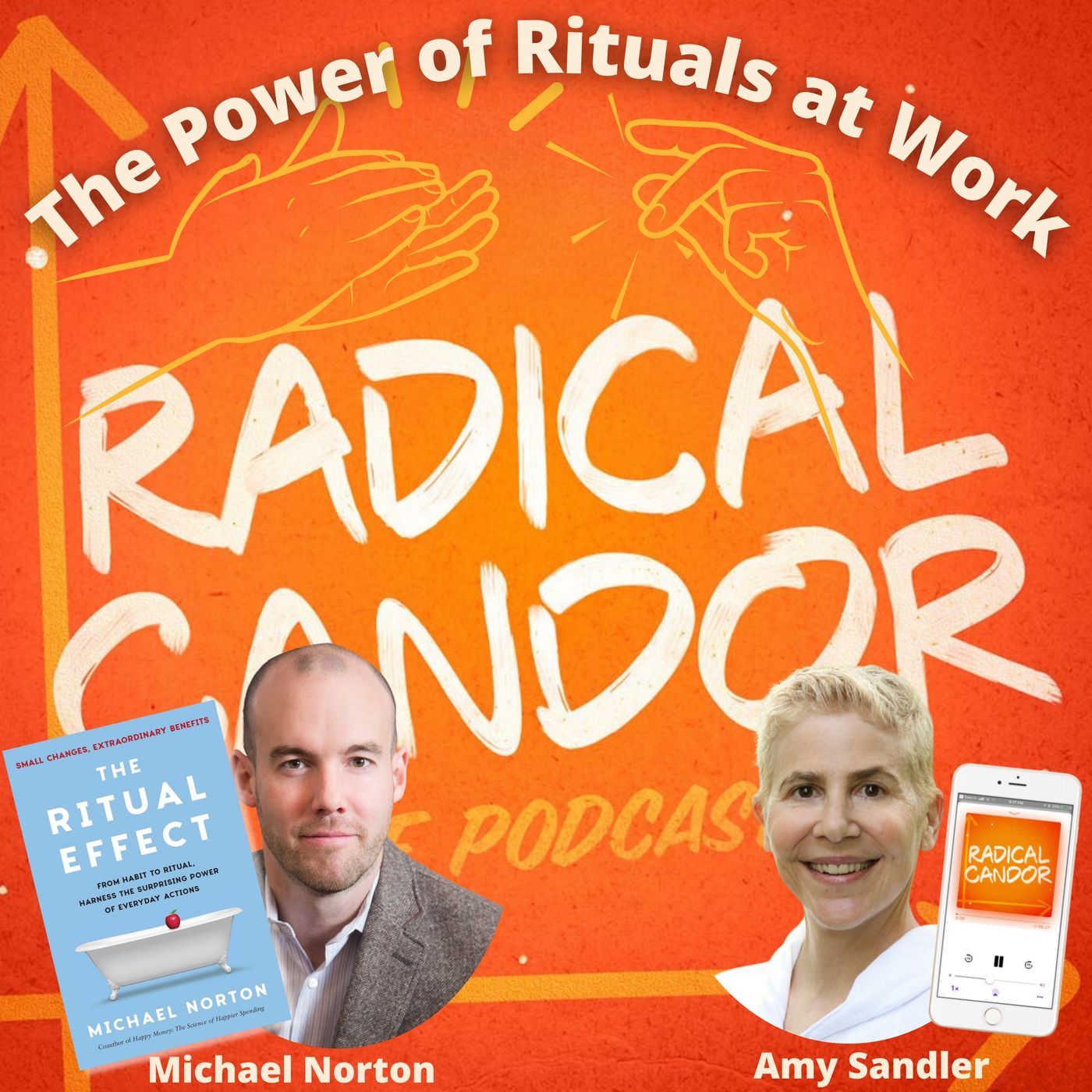
The Power of Rituals at Work 6 | 16
Everyday actions, when turned into rituals, can manage emotions and create a sense of control and purpose.For Stress Awareness Month, here's another Bonus episode where Harvard Business School Professor Michael Norton joins Amy Sandler to discuss his latest book, "The Ritual Effect."Norton explores the significance of rituals in reducing stress and enhancing productivity, both at work and in personal life. He shares compelling research and personal anecdotes that illustrate how everyday actions, when turned into rituals, can manage emotions and create a sense of control and purpose. The conversation covers the practical application of rituals in business settings, their emotional significance, and how they can foster team cohesion and workplace wellness.Whether you're a skeptic or a believer in the power of rituals, this episode offers valuable insights into how structured routines can lead to greater emotional health and professional effectiveness.Episode Links:Michael Norton: Website Norton’s BooksHarvard Business School Profile: Website Norton’s paper on humblebragging: Humblebragging: A Distinct and Ineffective Self-Presentation Strategy Norton’s paper on matchmaking: Matchmaking Promotes HappinessNorton’s ritual quiz: What Are Your Rituals?Connect:Website Instagram TikTok LinkedIn Facebook X YouTubeGet all the resources and show notes at RadicalCandor.com/podcastChapters:(00:00:00) Introduction Amy Sandler introduces guest Michael Norton and his book "The Ritual Effect”(00:02:05) The Importance of RitualsAn anecdote about knocking on wood introduces the relevance of rituals in different contexts and how rituals naturally form and help in stress management.(00:09:46) Habit vs. Ritual The difference between habits and rituals, highlighting the emotional connections that define rituals(00:11:56) Rituals and Emotion ManagementThe emotional impact of rituals, termed as "emo-diversity," and how rituals help manage a wide spectrum of emotions.(00:14:48) Collective Rituals and Emotional BondsCommunal aspects of rituals, their historical and cultural significance, and how they strengthen social bonds and collective identities.(00:16:13) Implementing and Adapting Rituals in TeamsWays leaders can facilitate the development of rituals allowing for organic growth within teams that reflect their unique values and culture.(00:23:21) Rituals, Technology, and Adapting to ChangeThe adaptation of rituals to technological changes and societal shifts, particularly in response to the COVID-19 pandemic.(00:28:47) The Role of Rituals in the WorkplaceThe importance of rituals at work for individuals and leaders, aiming to reflect on how these can make a workday more meaningful.(00:32:37) Evaluating the Benefits of RitualsFunctional benefits of rituals and how these practices contribute positively to mental health and well-being.(00:36:02) Reflecting Organizational Values Through RitualsHow rituals at work can reflect and reinforce organizational values, enhancing team bonding and individual satisfaction.(00:41:33) Introduction to the Ritual QuizNorton introduces his ritual quiz, designed to help individuals identify and understand their personal and work-related rituals.(00:45:04) ConclusionBecome a supporter of this podcast: https://www.spreaker.com/podcast/radical-candor-communication-at-work--5711404/support.
46:1824/04/2024

Best Of: Ally Love on Radical Candor and Real Success 6 | 15
Ally Love discusses the transformative power of Radical Candor in her career and personal life.In this Best Of Radical Candor, we revisit one of our most popular episodes. Kim, Jason, and Amy chat with Ally Love, TODAY Show contributor, renowned Peloton instructor, and founder of Love Squad. They delve into Ally's integration of the Radical Candor framework into both her professional and personal life, exploring how it has bolstered her confidence and leadership skills. Listeners will gain valuable insights on maintaining wellness amidst a demanding career, the power of morning affirmations, and the impact of honest communication on relationships. This episode not only shares Ally's transformative journey but also provides practical advice for anyone looking to enhance their life through authenticity and mindful leadership. With a number of great episodes to choose from, check out our vast back catalog of episodes.Connect:WebsiteInstagram TikTok LinkedIn Facebook X YouTubeGet all the resources and show notes at RadicalCandor.com/podcastChapters:(00:00:00) Introduction We introduce and guest Ally Love, founder of lifestyle brand Love Squad and Peloton instructor(00:04:13) The Personal Happiness RecipePersonal routines that contribute to happiness and well-being, highlighting the importance of staying centered and mindful.(00:10:15) The Power of Morning AnchorsAlly’s morning routine of setting an emotional anchor, emphasizing the value of choosing how to feel and react to daily challenges.(00:15:26) Career Journey and ChallengesOvercoming early career challenges and how personal setbacks have shaped Ally’s professional journey and leadership style.(00:21:02) Implementing Radical Candor in LeadershipHow Radical Candor shaped Ally’s leadership style at Love Squad and Peloton, focusing on understanding individual needs and communication styles(00:25:52) The Impact of Leadership and Choreography in Team DynamicsSimilarities between leadership and choreography and how to curate effective team dynamics and maintain curiosity about team members' evolving goals.(00:29:21) The Essence of Being a BossAlly’s definition of being a 'boss' in life and work, using her platform to foster positivity and standards.(00:33:39) Radical Candor in Personal LifePersonal stories illustrating the application of ‘Radical Candor’ in marriage and professional interactions, underscoring its effectiveness in building trust and clarity.(00:40:04) Radical Candor and Habit BuildingAdvice on using Radical Candor as a guide for building habits and healthy practices in daily life.(00:44:06) Origins and Growth of Love SquadThe founding of Love Squad, from its beginning as a personal project to build a support network and evolution into a platform for empowering women through events and partnerships.(00:50:21 Future Aspirations and Favorite ThingAlly Love shares her aspirations for continuity in her career and potential diplomatic roles, as well as her favorite feel good song.(00:52:22) ConclusionBecome a supporter of this podcast: https://www.spreaker.com/podcast/radical-candor-communication-at-work--5711404/support.
52:5917/04/2024

Think Fast, Talk Smart 6 | Bonus
The Radical Candor episode of the Think Fast, Talk Smart podcast, hosted by our friend Matt Abrahms, is up for the Webby award for Best Individual Podcast Episode in the Business category. We’re dropping it in this week so you can listen and we’re asking you to please vote for it at fastersmarter.io/webby. Voting is open until April 18th — let’s get that Webby! Vote and share it on social media to encourage others to do the same!Have questions about Radical Candor? Let's talk >>Follow UsInstagramTikTokLinkedInYouTubeFacebookXEmail us at: [email protected] a supporter of this podcast: https://www.spreaker.com/podcast/radical-candor-communication-at-work--5711404/support.
33:4810/04/2024
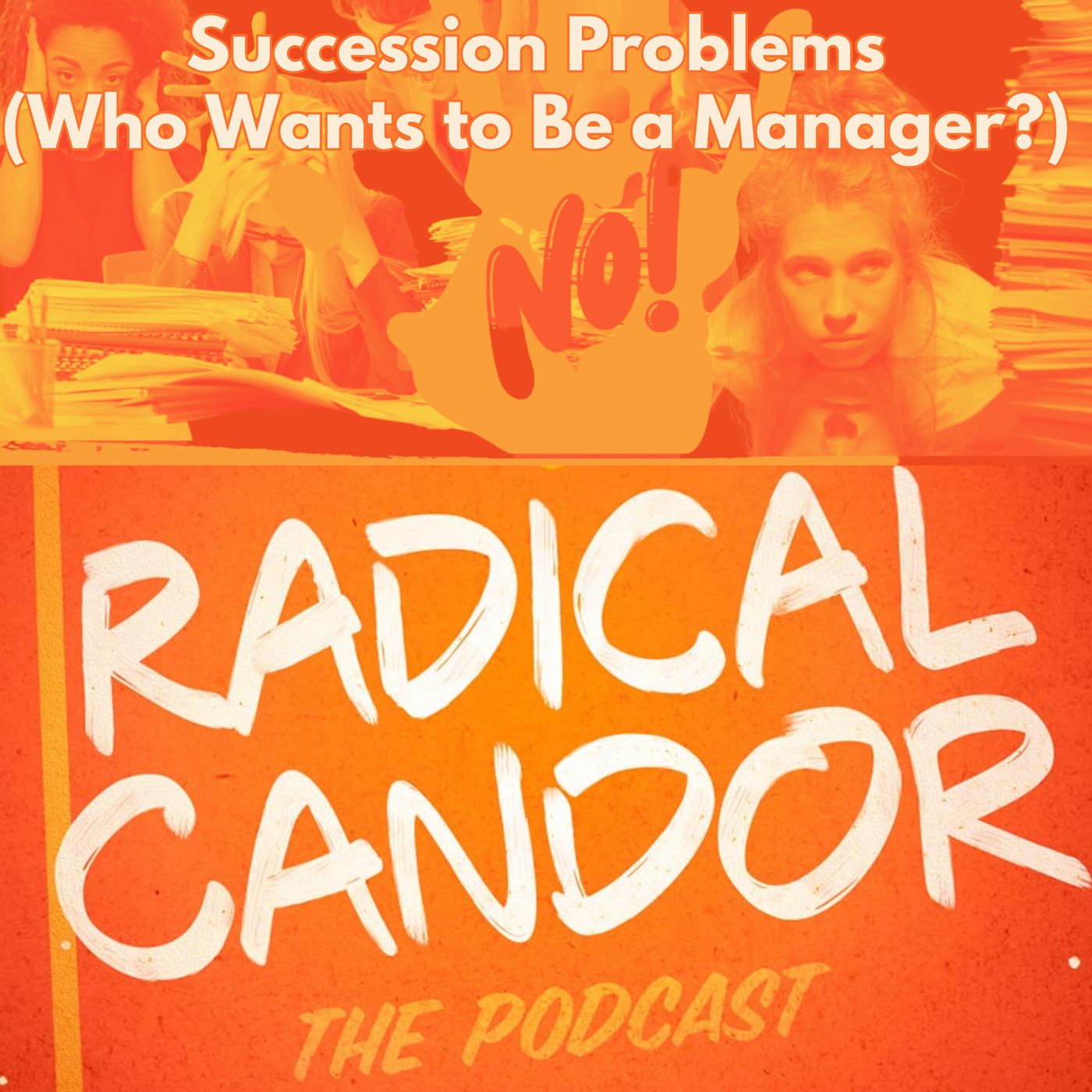
Succession Problems (Who Wants to Be a Manager?) 6 | 14
We’ve talked about knowing whether or not being a manager is right for you and manager burnout, but what if no one wants to be a manager at all? Kim, Jason, and Amy discuss the challenges and motivations for becoming a manager. They explore the survey results that show a lack of interest in people management, the reasons behind it, the role of middle managers, and the emotional labor involved in being a manager.Radical Candor Podcast ChecklistDefine the role. Teach people what the job of management is and provide the training and resources to help them succeed.Create a buddy or mentorship program so people interested in people management can experience some of the positive aspects of building relationships, guiding teams to achieve results and helping people take steps in the direction of their dreams. If you want to explore the manager dilemma further, listen to S5, Ep.25: Should I be a manager? And S6. Ep.2: Managers are Burned Out, Too.Get all the resources and show notes at RadicalCandor.com/podcastChapters[00:00] Introduction[00:38] Survey Results and TikTok Videos[06:04] Motivations for Becoming a Manager[10:11] The Role of Middle Managers[12:21] The Challenges of Middle Managers[21:19] Redefining the Role of Managers[25:26] The Importance of Defining the Role[28:06] The Value of Player Coaches[29:41] Motivations for Becoming a Manager[36:42] Inspiring Moments in Management[43:14] The Radical Candor ChecklistFollow UsInstagramTikTokLinkedInYouTubeFacebookXBecome a supporter of this podcast: https://www.spreaker.com/podcast/radical-candor-communication-at-work--5711404/support.
41:1603/04/2024

The Radical Recap from SXSW 6 | 13
Kim is fresh back from SXSW where she was hosting a live episode of her other podcast Radical Respect — you may notice some bonus episodes of it in your feed — and officially launching her forthcoming book Radical Respect, available for pre-order everywhere books are sold. The team also discusses mentorship, the benefits and drawbacks of conferences and retreats, and they each paint a picture of their ideal Radical Candor getaway. Amy reflects on her 2013 SXSW experience, including an all-night hunt for Grumpy Cat.Get all the notes and resources at RadicalCandor.com/podcastChapters[00:00] SXSW Radical Respect podcast, and conference experiences. [04:15] Radical Respect and Conference Experiences. [10:31] Radical Candor and its Impact.[16:40] Structuring a retreat for Radical Candor. [21:21] Retreat format and what fills people up. [23:37] Retreat planning for leaders with a focus on Radical Candor. [28:45] Mentorship and finding mentors for career success. [33:09] Mentorship dynamics and the importance of listening. [35:08] Empathy, mentorship, and helping others in the workplace.[37:22] Mentorship and networking in the industry. [39:34] Mentorship and informal learning opportunities. [42:18] Radical Respect in the Workplace. [45:04] Mentorship, boondoggles, and effective communication.Watch Kim and Wesley's live SXSW talk: Radical Respect: How To Work Together Better | SXSW 2024Follow UsInstagramTikTokLinkedInYouTubeFacebookX Contact [email protected] a supporter of this podcast: https://www.spreaker.com/podcast/radical-candor-communication-at-work--5711404/support.
46:3427/03/2024
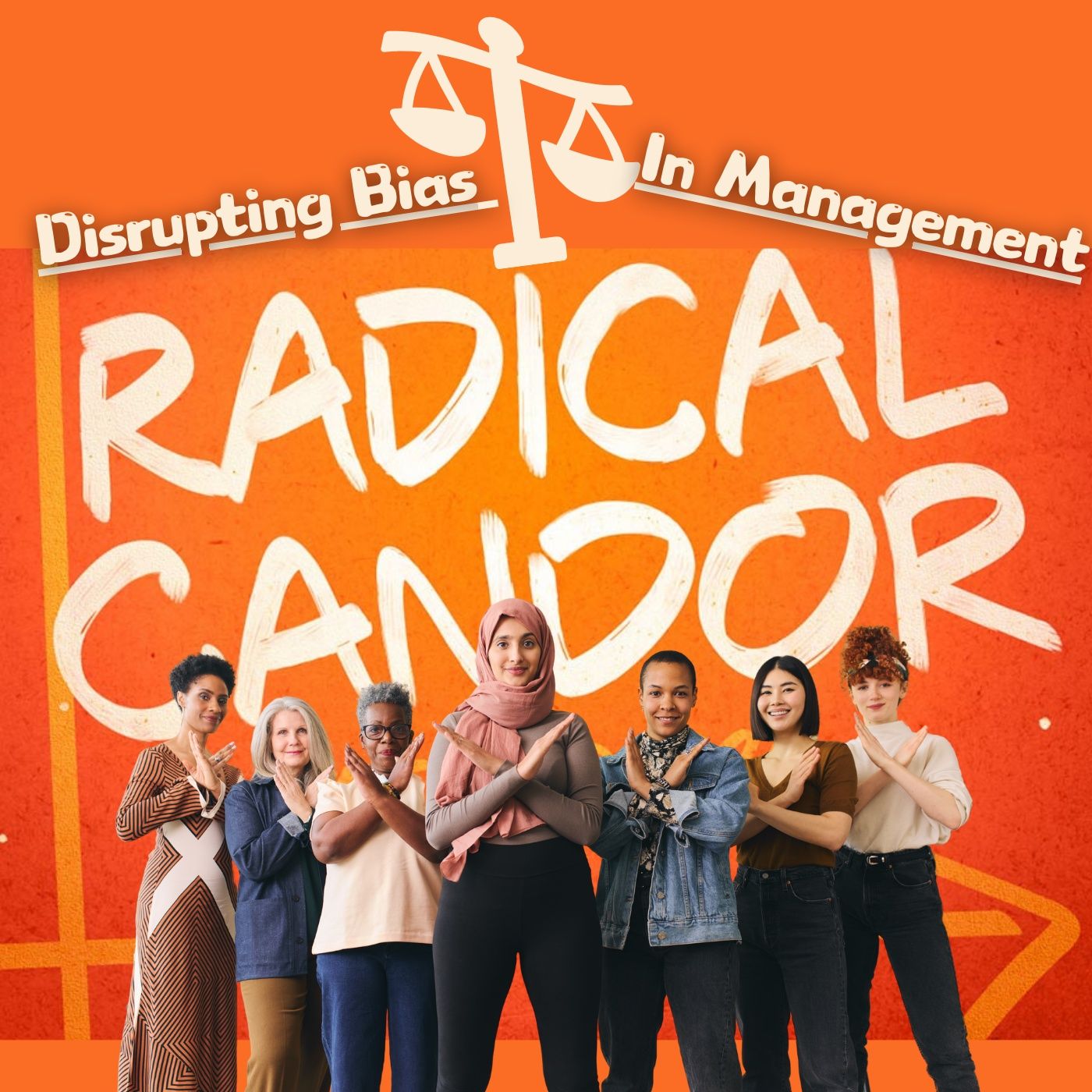
Disrupting Bias In Management 6 | 12
Kim, Jason, and Amy discuss a listener's question about how to confront and disrupt bias in management at work for women working in male-dominated fields. Jason and Kim role-play a scenario where a manager is clearly biased and explain how to disrupt bias in the moment. They also discuss documenting incidents and when it's time to go to HR.Get all the show notes and resources at RadicalCandor.com/podcast.Chapters00:00 Confronting Bias at Work08:26 Recognizing Bias and Growth Mindset13:33 Going to HR or Addressing Bias Directly19:09 Managing Up and Coaching Up23:39 Role Play: Addressing Bias with Manager28:15 Reflecting on the Role Play34:59 Double Standards and Prejudice37:11 Being Tough in the Workplace39:03 Dealing with Biased Perceptions41:40 Coaching Managers43:26 Building Relationships with Managers46:02 Addressing Bias and Prejudice48:57 Creating Cultures of Open Communication52:41 Building Solidarity and Documenting Incidents54:49 Tips and Closing RemarksFollow UsInstagramTikTokLinkedInYouTubeFacebookX Become a supporter of this podcast: https://www.spreaker.com/podcast/radical-candor-communication-at-work--5711404/support.
49:3420/03/2024

AI at Work 6 | 11
Amy and Jason engage in a thought-provoking conversation about the impact of AI at work in the realm of Radical Candor. They delve into the evolution of AI, its impressive and limiting aspects, and the challenges of its adoption. They also highlight the importance of interpersonal skills and domain expertise in the age of AI, and how it can be a game-changer in conflict resolution and communication. Jason showcases the Radical Candor Knowledge Bot and Practice Partner as prime examples of AI applications in the field.Get all of the show notes and resources at RadicalCandor.com/podcast.Chapters00:00 Introduction and AI Identity02:26 The Evolution of AI and the Role of Large Language Models05:25 The Impressive and Limiting Aspects of AI08:56 The Relevance of AI and the Challenges of Adoption12:01 The Importance of Interpersonal Skills and Domain Expertise25:16 The Role of AI in Clarity and Conflict Resolution29:16 The Radical Candor Knowledge Bot and Practice Partner34:56 The KnowledgeBot and Self-Assessment36:20 Using AI for Therapy and Existential Questions39:35 The Practice Partner for Radical Candor45:26 AI in the C-Suite and Business Value48:09 The Shift of Roles and Talent Management52:45 AI Making Leaders Smarter and Faster58:05 AI's Impact on Writing and Journalism01:06:19 Ethical Considerations and Responsible AI01:08:10 Tips for Getting Started with AI01:10:20 Tips for Learning AI01:10:32 Finding Interesting AI ApplicationsFollow UsInstagramTikTokLinkedInYouTubeFacebookXBecome a supporter of this podcast: https://www.spreaker.com/podcast/radical-candor-communication-at-work--5711404/support.
01:00:1413/03/2024
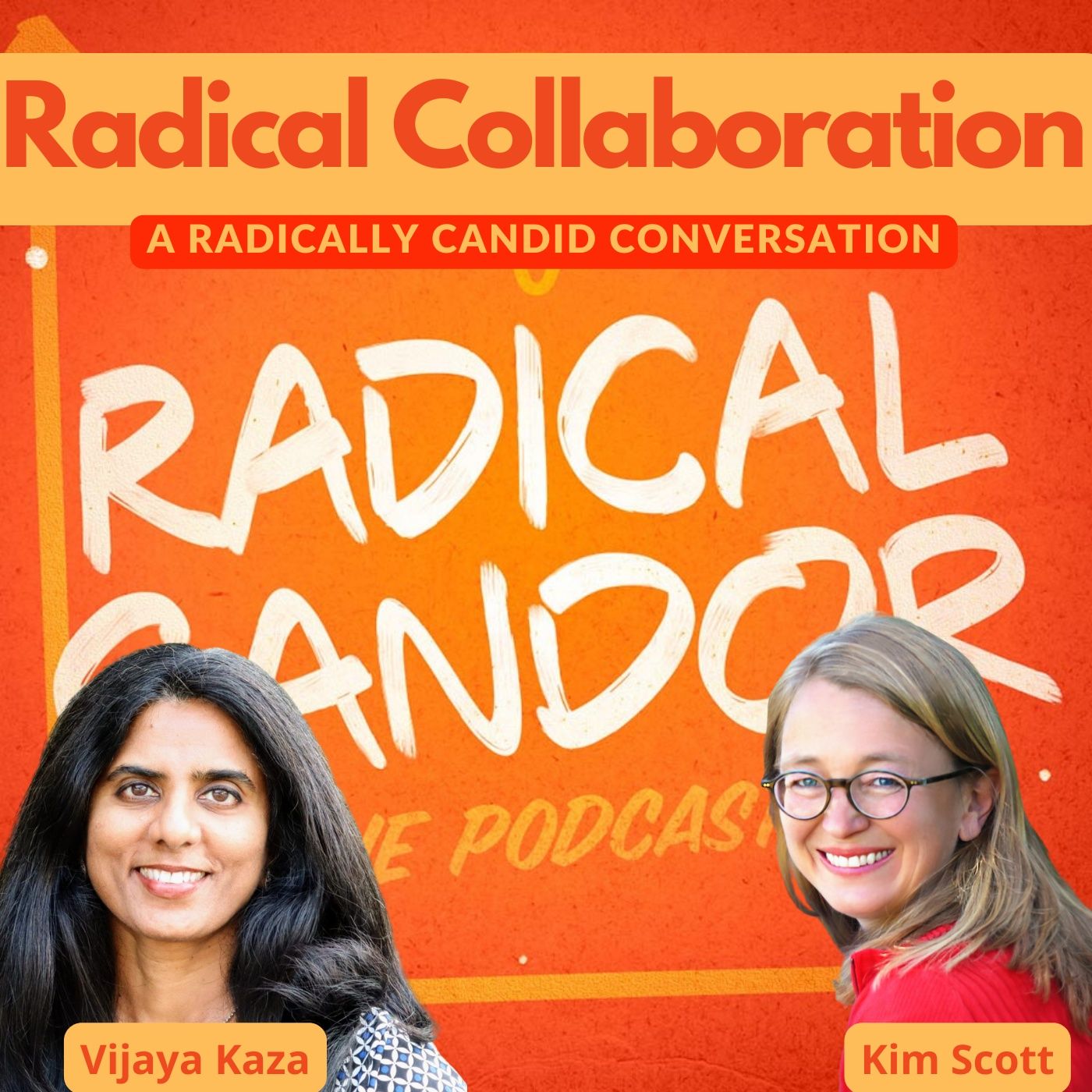
Radical Collaboration With Vijaya Kaza 6 | 10
Collaboration is probably the most used buzzword in the corporate world, yet it is often misunderstood. Vijaya Kaza, Chief Security Officer & Head of Engineering for Trust and Safety at Airbnb, joins Kim for a Radically Candid Conversation about Radical Collaboration. Get all of the resources and show notes at RadicalCandor.com/podcastAn impact and results-driven C-level technology and business executive with experience leading engineering, product management, design, information security and operations, Vijaya Kaza was recently named as one of The Female Quotient and Deloitte’s Top 30 Women in Cyber for 2023.ChaptersCollaboration and Radical Candor in Leadership. (00:00)Collaboration, disagreement, and feedback in the workplace. (07:38)Collaboration and communication in the workplace. (16:55)Collaboration types and their impact on workplace culture. (20:58)Fostering collaboration and debate in teams. (31:31)Effective collaboration and disagreement in the workplace. (37:58)Follow UsInstagramTikTokLinkedInYouTubeFacebookXBecome a supporter of this podcast: https://www.spreaker.com/podcast/radical-candor-communication-at-work--5711404/support.
43:5907/03/2024
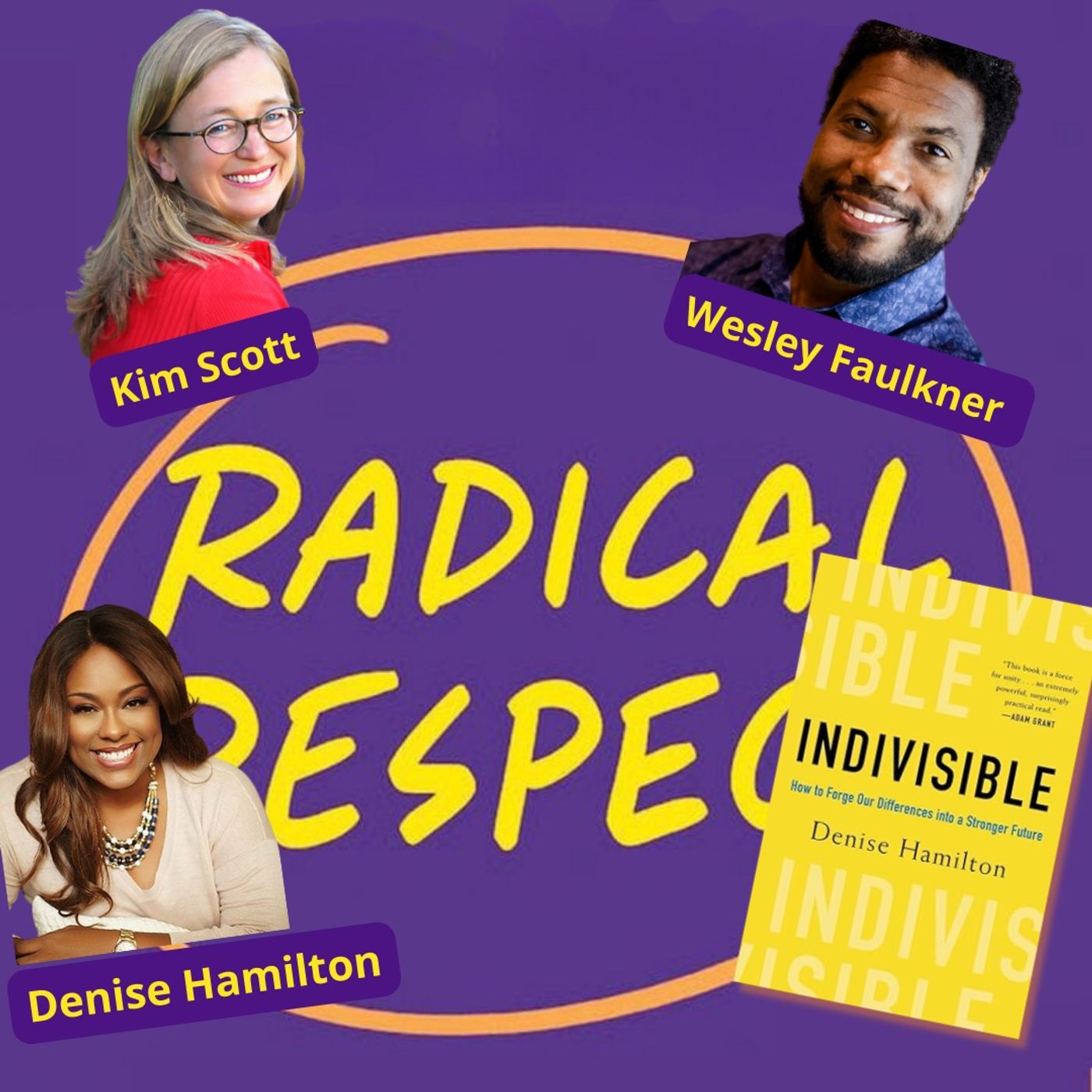
Radical Respect — Indivisible
This bonus episode is from the Radical Respect podcast with Kim Scott and Wesley Faulkner based on Kim's forthcoming book, Radical Respect: How to Work Together Better. On this episode, Kim and Wesley talk to workplace culture expert Denise Hamilton about her new book, Indivisible: How to Forge Our Differences into a Stronger Future. Denise reads passages from her book, prompting some real conversations. Are you trying to figure out how to prepare for this election year mentally? Denise's new book will help you! Plus catch Kim and Wesley Live at SXSW on March 8th!Denise Hamilton is the founder and CEO of WatchHerWork, a digital learning platform for professional women, and All Hands Group, a workplace culture consultancy. As an in-demand speaker and facilitator, she has consulted for and presented to dozens of Fortune 500 companies, including GE, Apple, IBM, Shell, BP, and Meta. Her thought leadership has been featured in Harvard Business Review, Morning Joe, FOX, Bloomberg, s+b, and Newsweek and she is a regular contributor to MIT Sloan Management Review. watchherwork.comChaptersWorkplace culture and diversity with author Denise Hamilton. (0:00)Racial disparities in maternal mortality rate in the US. (01:22)Gender disparities in medical research and treatment. (05:07)Race, power dynamics in healthcare, and personal experiences. (08:07)Race, empathy, and personal responsibility. (14:11)Racism and compassion in society. (21:44)Police brutality, language, and solidarity. (26:29)Police power and accountability. (32:29)The impact of capitalism and personal responsibility on mental health. (39:52)Political polarization and the importance of empathy. (46:36)Watch the video of this episode >>Become a supporter of this podcast: https://www.spreaker.com/podcast/radical-candor-communication-at-work--5711404/support.
54:2505/03/2024
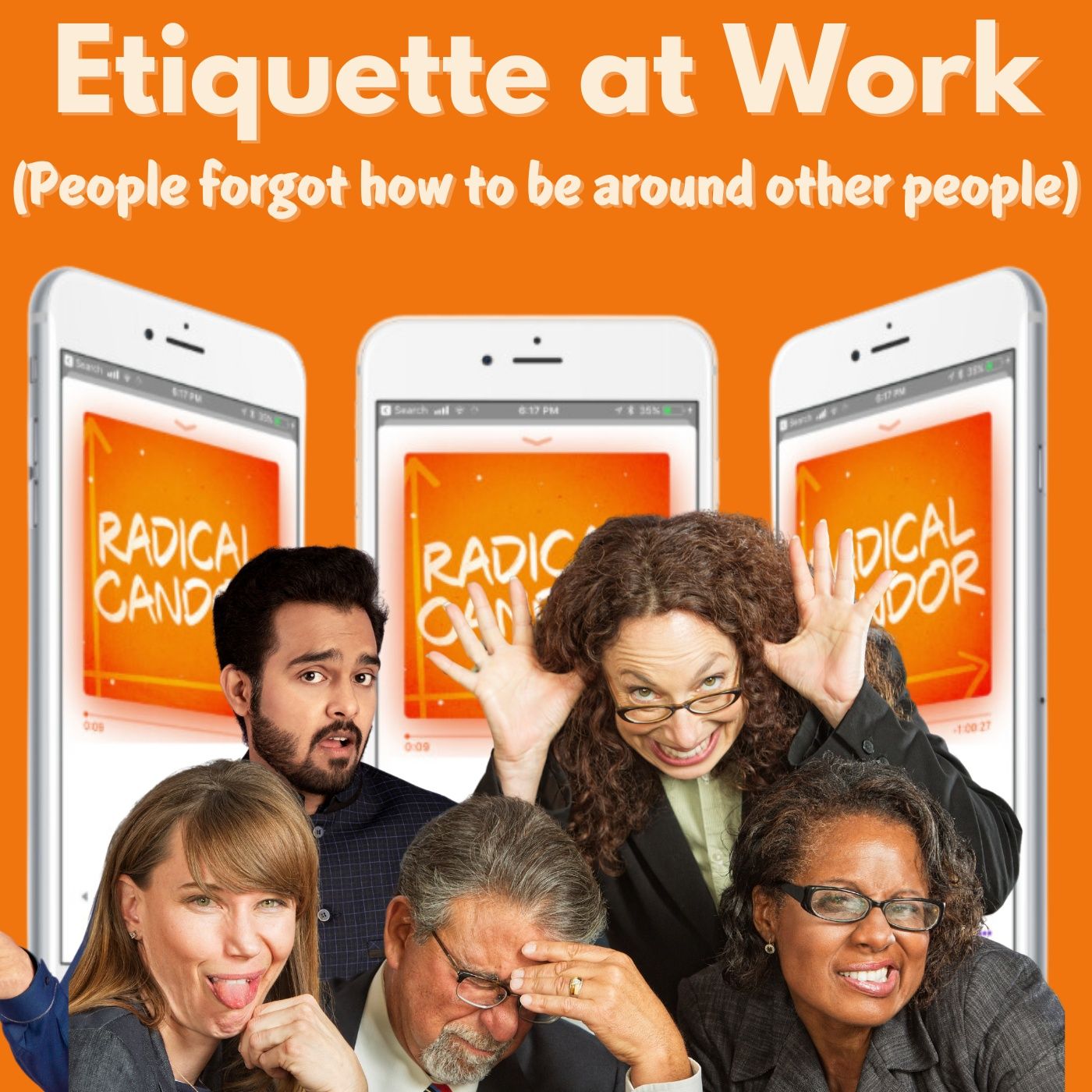
Etiquette at Work 6 | 9
Sixty percent of employers will reportedly send employees to “office etiquette” training in 2024. Whether it’s folks returning to the office after years of working remotely, or recent college grads without office experience — apparently people don’t know how to act around one another anymore. The team discusses the impact of decreased human interactions and the need to establish office behavior norms. Kim, Brandi and Jason also emphasize the importance of open communication and creating explicit norms, especially in hybrid and remote work environments. And if you work in person, don't touch other people's keyboards or drop Dorito crumbs onto their desks. Get all the show notes and resources at RadicalCandor.com/podcastChapters00:00 Introduction05:08 Challenges of Returning to the Office10:27 Creating Norms for Office Spaces14:54 The Challenge of Remote Work19:30 Setting Norms for Hybrid Teams32:21 Addressing Time Zone Challenges39:18 The Goal of Radical Candor: Connecting Through Conversation40:21 Bottoms Up Norm Setting vs Top Down Rulemaking41:21 Inefficiency as a Path to Efficiency43:31 Radical Candor ChecklistFollow UsInstagramTikTokLinkedInYouTubeFacebookX Email us: [email protected] a supporter of this podcast: https://www.spreaker.com/podcast/radical-candor-communication-at-work--5711404/support.
44:4428/02/2024
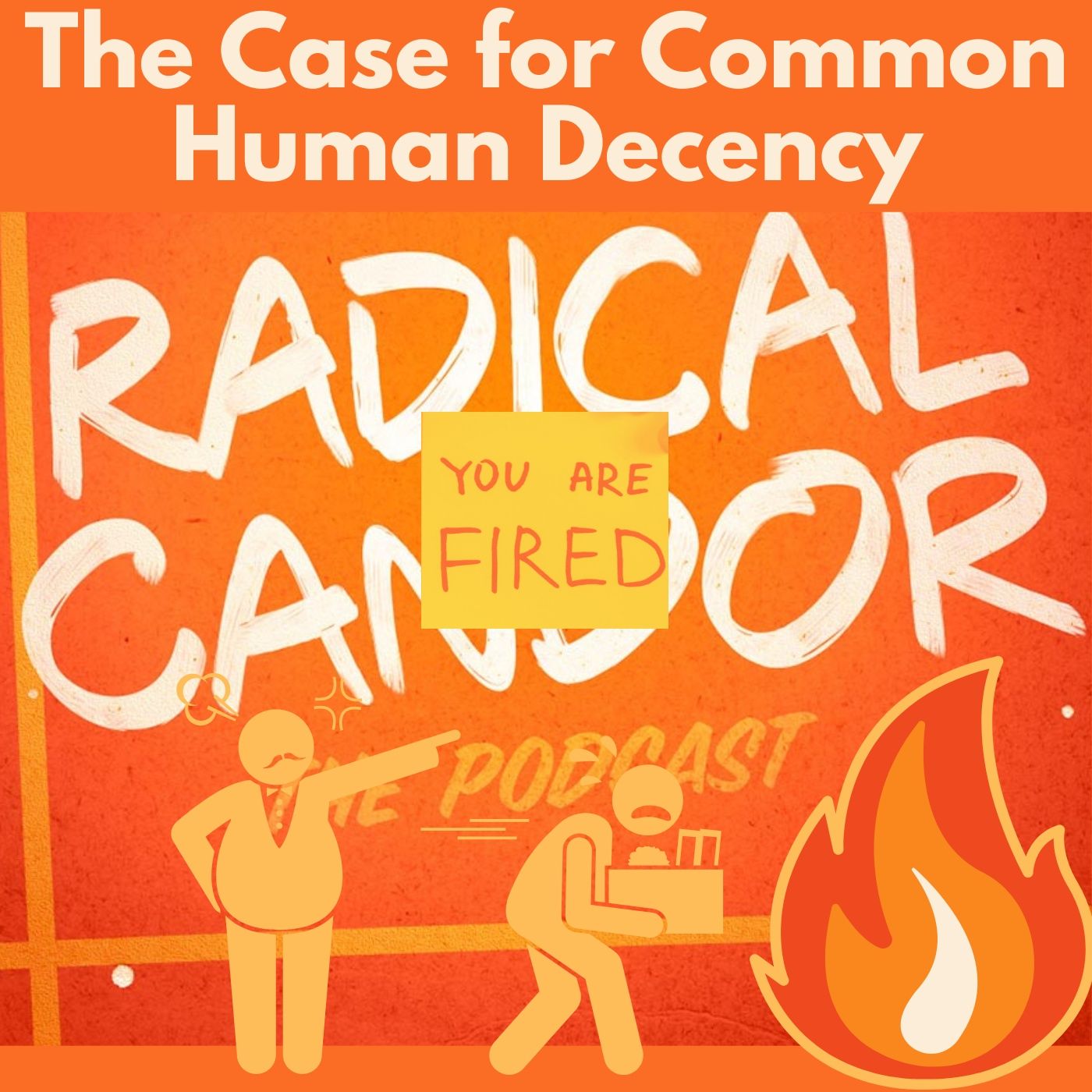
The Case for Common Human Decency 6 | 8
Common human decency is something everyone deserves, but not everyone gets. Especially at work. Kim and Amy discuss a case study Kim learned about during a recent visit to Harvard Business School. In this case, the co-founders of CloudFlare considered the implications of five employees' resignations over the prior three months and whether or not the resignations were symptomatic of bigger issues with CloudFlare's culture and management processes. The HBS alums then put on their case study hats as they explore the recent attention CloudFlare has received for its poor handling of layoffs after Brittany Pietsch filmed her own layoff and it subsequently went viral on TikTok. Get all of the show notes and resources at RadicalCandor.com/podcast.Follow UsInstagramTikTokLinkedInYouTubeFacebookXEpisode SummaryThe effectiveness of case studies in business education. 00:00Business case analysis and decision-making. 04:31Work culture and management practices in a tech startup. 09:58Workplace layoffs and accountability. 18:14Workplace layoffs and performance evaluations. 24:04Layoffs, performance management, and HR practices. 30:19Firing employees and accountability in the workplace. 38:38Leadership mistakes and feedback. 45:13Effective feedback and criticism in the workplace. 52:50Become a supporter of this podcast: https://www.spreaker.com/podcast/radical-candor-communication-at-work--5711404/support.
56:0821/02/2024
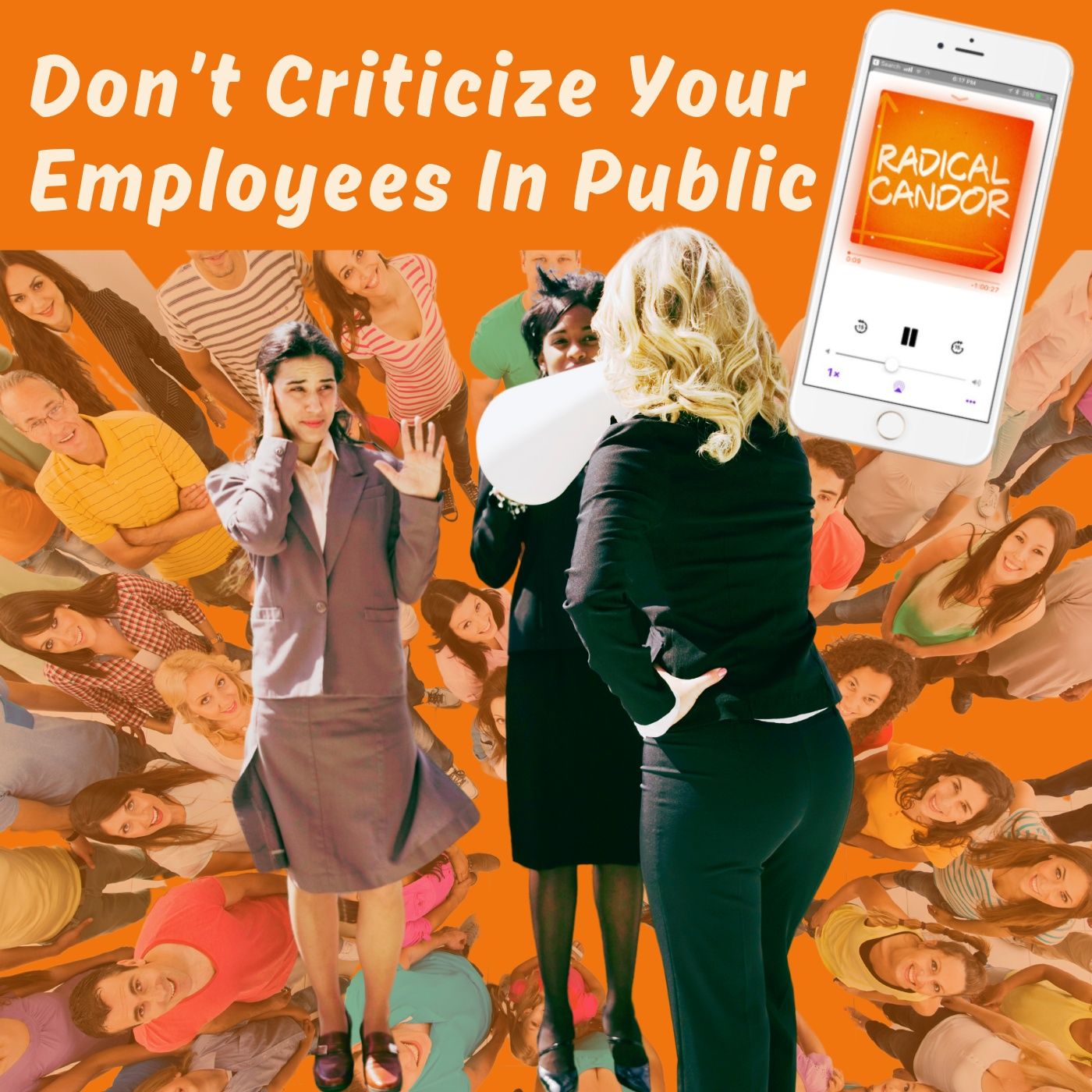
Don't Criticize Your Employees In Public 6 | 7
You've heard us say often that it's important to praise your employees in public (if they're comfortable with it) but to always give criticism in private. While there is almost always something for others to learn from an individual's mistake, criticizing or shaming them in public has been shown to make the person more likely to hide mistakes in the future, hurting them and the company. So how can we separate and honor our concern for the individual with the needs of the team? Get all the show notes and resources at RadicalCandor.com/podcast.Follow UsInstagramTikTokLinkedInYouTubeFacebookXBecome a supporter of this podcast: https://www.spreaker.com/podcast/radical-candor-communication-at-work--5711404/support.
45:4714/02/2024

What Does Managing Out Mean? 6 | 6
For a podcast about communication at work, we sometimes use corporate jargon that doesn't always make sense—even to us. We disagree about corporate speak and what it means. Case in point, managing out. What does managing out mean? How do you know if you're being managed out? There’s definitely some misalignment on what “managing people out” means versus what it’s supposed to mean — maybe we need a new word. According to the business dictionary Jargonism, The definition of Managing Someone Out is, “The practice of giving an employee undesirable tasks, so that the employee leaves a company voluntarily.” It means something else to Kim, and Brandi thinks "managing out" is a term rife with manipulative insincerity. Listen to the conversation then let us know what you think about managing out!Get all the resources and show notes at RadicalCandor.com/podcastRelated ContentRadical Candor Podcast: Absentee Management Vs. Quiet Firing4 Things To Do When Firing Someone What Leaders Can Learn About “In-Group” Dynamics to Prevent Workplace MobbingBecome a supporter of this podcast: https://www.spreaker.com/podcast/radical-candor-communication-at-work--5711404/support.
01:07:0907/02/2024
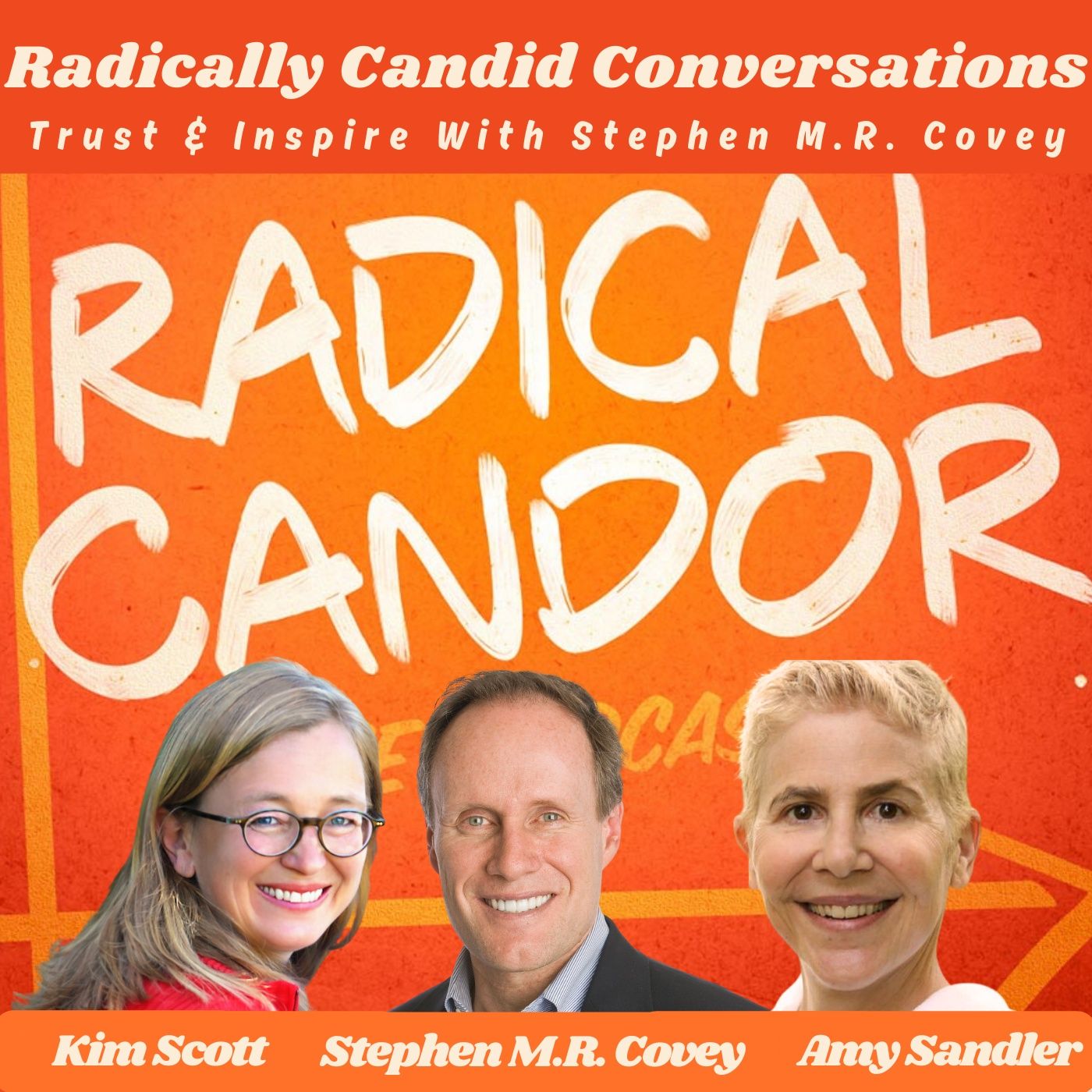
Trust and Inspire With Stephen M.R. Covey 6 | 5
Learn how the shift from command and control to a culture focused on collaboration. Stephen M.R. Covey joins us for our first Radically Candid Conversation of 2024 to discuss how trust-and-inspire leadership leads to happier teams, improved retention, increased productivity, and improved company culture because telling people what to do doesn't work.Get all of the show notes at RadicalCandor.com/podcast.Become a supporter of this podcast: https://www.spreaker.com/podcast/radical-candor-communication-at-work--5711404/support.
44:2431/01/2024

Loud Laborers: All Talk, No Action 6 | 4
Loud laborers talk big about their projects at work while accomplishing very little. Join us to explore the characteristics of these self-proclaimed workplace heroes, as they often gravitate toward tasks that boost visibility rather than genuine productivity. Discover the impact of "loud laborers" on team dynamics and how to navigate this common workplace scenario. Don't miss out on this insightful discussion shedding light on the not-so-quiet world of office chatter! Get all of the show notes at RadicalCandor.com/podcastBecome a supporter of this podcast: https://www.spreaker.com/podcast/radical-candor-communication-at-work--5711404/support.
58:0724/01/2024
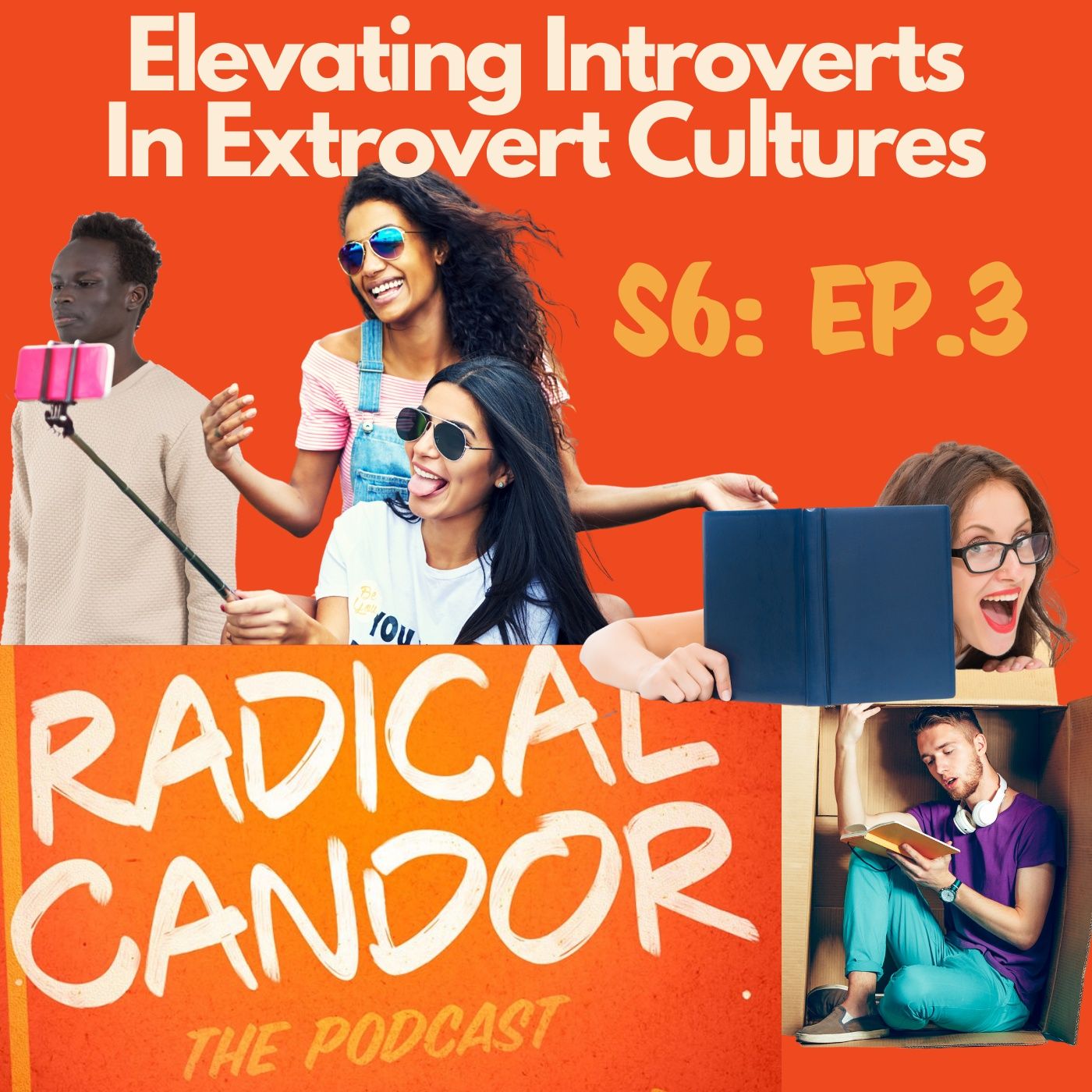
Elevating Introverts at Work 6 | 3
Hey there you introvert in an extrovert culture — we see you! Extroverts are often overrepresented on management teams and many leaders are unsure how to coach, give feedback to, and advocate for a thoughtful introverted employee in a culture where multi-tasking extroverts are rewarded. On this episode of the Radical Candor podcast, Kim, Jason and Amy answer a listener's question about how to communicate the unseen efforts and accomplishments of introverted employees to senior management.View all of the show notes at RadicalCandor.com/podcastBecome a supporter of this podcast: https://www.spreaker.com/podcast/radical-candor-communication-at-work--5711404/support.
55:5417/01/2024
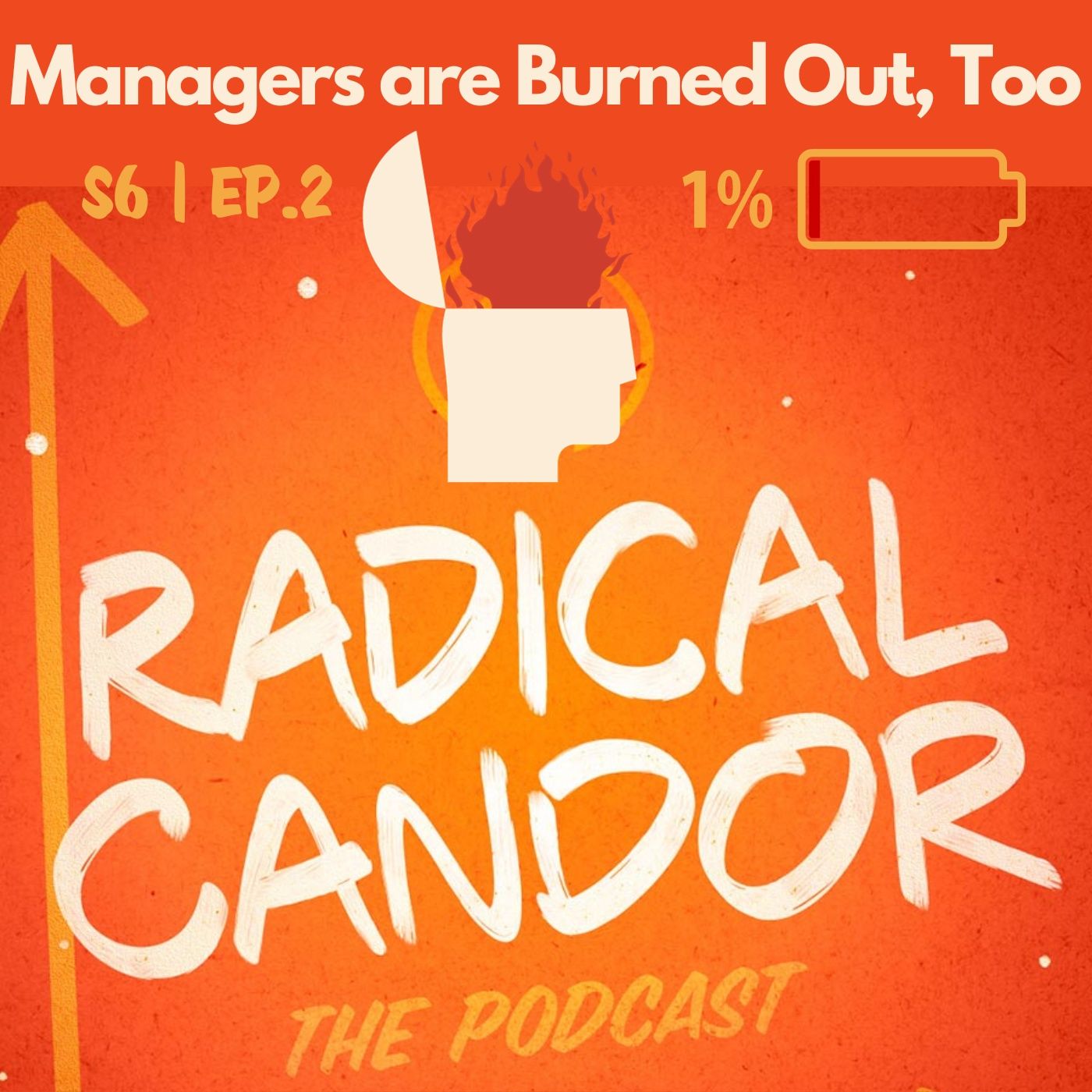
Managers are Burned Out, too 6 | 2
Managers are burned out AF. A boss’s job is to guide a team to achieve results. However, in the current landscape of constant disruptions, this job is feeling impossible for some managers. What’s more, disengaged managers lead to disengaged teams. Is all hope lost? Kim, Amy and Jason weigh in.Get all of the show notes at RadicalCandor.com/podcastBecome a supporter of this podcast: https://www.spreaker.com/podcast/radical-candor-communication-at-work--5711404/support.
01:05:3110/01/2024
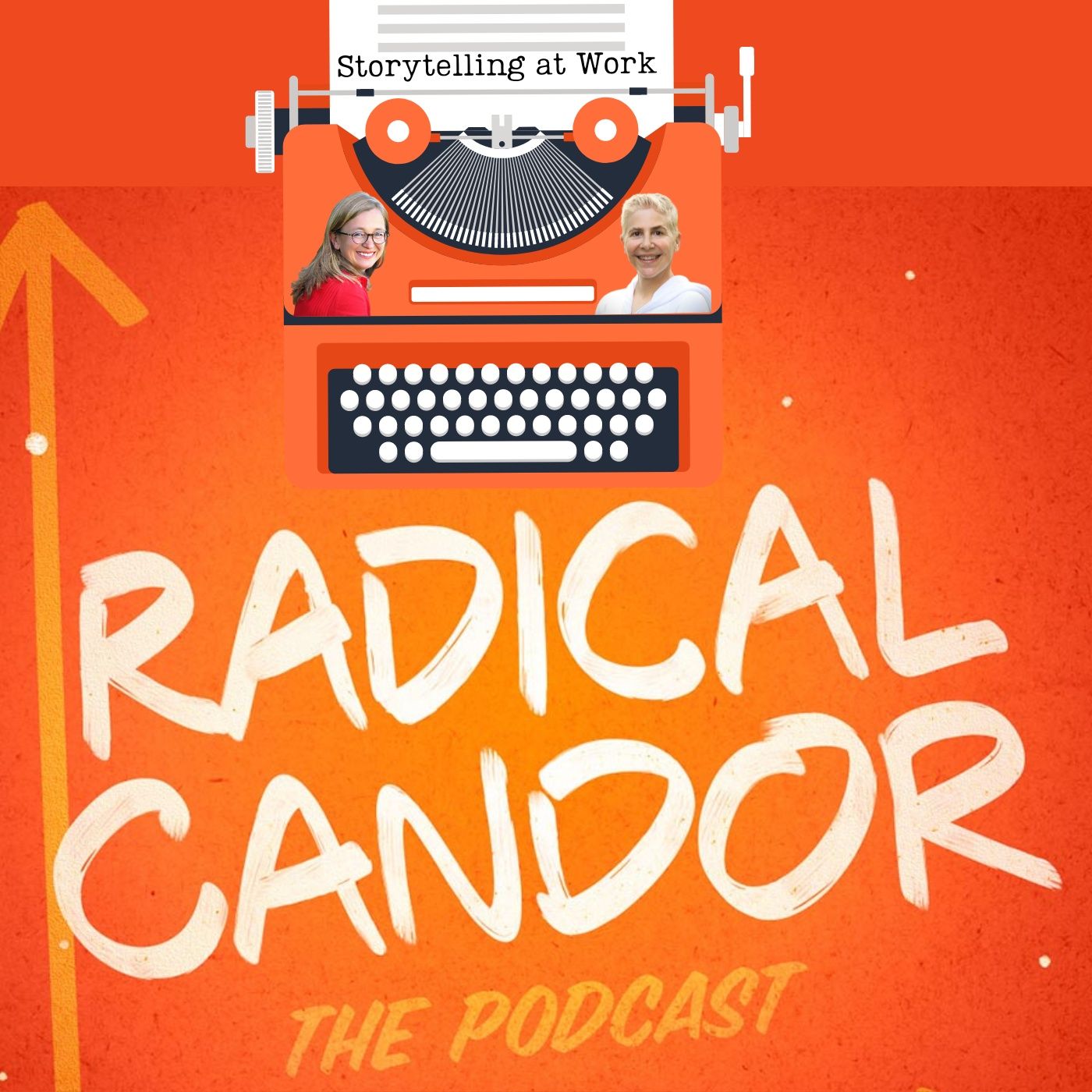
Storytelling at Work 6 | 1
What makes a good story and why do leaders need to know? Kim and Amy discuss storytelling at work, how our brains are wired for stories and why Kim focuses so much on stories in Radical Candor. Get all the show notes and resources at RadicalCandor.com/podcastBecome a supporter of this podcast: https://www.spreaker.com/podcast/radical-candor-communication-at-work--5711404/support.
47:4803/01/2024

Surviving Holiday Communication With Your Family 5 | 30
Holiday communication with your family can be rife with stress. But you can survive it by practicing Radical Candor with your nearest and dearest. this holiday season to avoid defaulting to Obnoxious Aggression, Manipulative Insincerity or Ruinous Empathy.Get all of the show notes and resources at RadicalCandor.com/podcastBecome a supporter of this podcast: https://www.spreaker.com/podcast/radical-candor-communication-at-work--5711404/support.
01:02:5920/12/2023

A 'Hot Potato' Management Dilemma 5 | 29
The team explores a year-end management dilemma — how to fairly evaluate a hot potato employee who's been bounced from team to team and manager to manager. They also reveal why everyone needs an "I love me" folder. Get the complete show notes at RadicalCandor.com/podcastBecome a supporter of this podcast: https://www.spreaker.com/podcast/radical-candor-communication-at-work--5711404/support.
35:4113/12/2023





